The Other Side of the Ocean
Friday, June 30, 2006
interrupting daily tribulations for the sake of daughters
I never quite got into the 4th of July. Rockets red glare, bombs bursting in air – I understand patriotism, but feel that those particular images are not altogether something I can wrap my soul around. I tend to more get into the food of it (so predictable): tarts with blueberries and raspberries over the years have played well. July 14th (Bastille Day) is cool as well, considering all the food options (if you can get yourself to not think about how many times the word "blood" and its derivatives appear in the words of their anthem).
In Poland I celebrated July 22nd with the rest of the pack (one way to do it: purchase lots of sweets from a Polish chocolatier that carries the name "22nd of july"), only to have the national holiday switched on me when I left the country. I'm not even sure which date acts as the new "flag was still there" equivalent, but it does not matter -- I am not going to be swept away into a feverish belief that on that day my allegiances should be to Poland and Poland only, though I am happy to honor her many victorious moments of the past by eating, say, poppyseed cake.
Still, this year, I am hot on the 4th bandwagon. It is a loooooong week-end if you take Monday off and so people living far away can actually come and visit you. I'm especially thinking of daughters, the ones who live on the coast.
I was waiting this afternoon for my latte at the local café and I noticed for the millionth time the poster right there, by the counter.
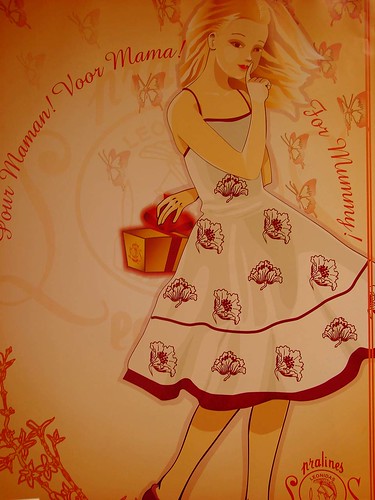
A girl giving a gift to her mom. For me the gift is her arrival. Their arrival. The blog post will be (mercifully?) shorter today. All spare minutes are devoted to the preparation for, cooking for and being with daughters.
In Poland I celebrated July 22nd with the rest of the pack (one way to do it: purchase lots of sweets from a Polish chocolatier that carries the name "22nd of july"), only to have the national holiday switched on me when I left the country. I'm not even sure which date acts as the new "flag was still there" equivalent, but it does not matter -- I am not going to be swept away into a feverish belief that on that day my allegiances should be to Poland and Poland only, though I am happy to honor her many victorious moments of the past by eating, say, poppyseed cake.
Still, this year, I am hot on the 4th bandwagon. It is a loooooong week-end if you take Monday off and so people living far away can actually come and visit you. I'm especially thinking of daughters, the ones who live on the coast.
I was waiting this afternoon for my latte at the local café and I noticed for the millionth time the poster right there, by the counter.

A girl giving a gift to her mom. For me the gift is her arrival. Their arrival. The blog post will be (mercifully?) shorter today. All spare minutes are devoted to the preparation for, cooking for and being with daughters.
posted by nina, 6/30/2006 09:45:00 PM
| link
| (0) comments
Thursday, June 29, 2006
wild things: prologue
I’ll go to Sicily with you if you hike the Rockies with me.
Four months ago, I appear to have heard only the first six words of that sentence.
Then, a few days ago:
We’ll fly out of Chicago on July 8th and we’ll get to Calgary by midnight and the next morning we’ll set out for the wilderness trail and we’ll sleep under the stars and eat Ramen noodles by a mountain stream.
My God.
Ed, my easy-going, tolerates-everything, including blogging, traveling companion in Sicily is about to get back at me, hard.
You don’t like the Ramen noodles, do you? Is it because the first listed ingredient is salt and the second – MSG? They taste great when you’re starving after a day-long hike!
I never want to be so starving that a container of Ramen noodles would taste great.
Please, can we consider other options? Can’t we hike in the day and then make our way down to an outstanding little bistro with crusty bread and a great little rose wine? In the alternative, can’t I pack crusty bread and a great little rose wine?
I suppose we could pour some rose into a little plastic flask…
The horror of it!
Surely campers eat something other than Ramen? And drink something other than water poisoned with iodine?
Yes, yes of course, let me bring out the saved food from my last camping trip.
Ed digs into his cabinets and comes up with this:
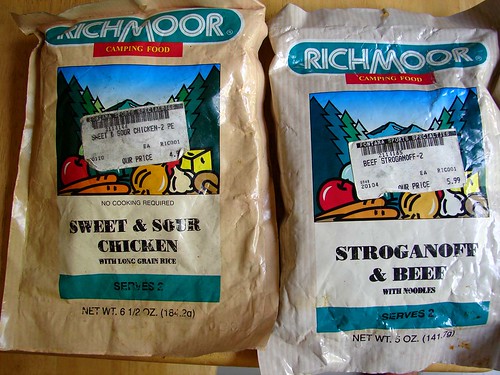
I need to sit down.
Stroganoff with beef???? How can you have Stroganoff with beef? Stroganoff is definitely not fresh and honest. It’s not even a food! Have you ever seen anyone selling Stroganoff at the farmers market? It’s a vice, a poison and we will have none of it!
But, it’s perfectly good still…
When is the expiration date?? Your last camping trip was centuries ago!
Ed searches. It doesn’t have one…
He says this as if it were a good thing.
There is no way in hell you will get me to eat Stroganoff with beef. And do not even think about sweet and sour chicken in a crumpled bag. Je refuse!
So begins our planning session for the trip. I know, I know, I will survive. Those stars better be damn good over the Rockies.
Four months ago, I appear to have heard only the first six words of that sentence.
Then, a few days ago:
We’ll fly out of Chicago on July 8th and we’ll get to Calgary by midnight and the next morning we’ll set out for the wilderness trail and we’ll sleep under the stars and eat Ramen noodles by a mountain stream.
My God.
Ed, my easy-going, tolerates-everything, including blogging, traveling companion in Sicily is about to get back at me, hard.
You don’t like the Ramen noodles, do you? Is it because the first listed ingredient is salt and the second – MSG? They taste great when you’re starving after a day-long hike!
I never want to be so starving that a container of Ramen noodles would taste great.
Please, can we consider other options? Can’t we hike in the day and then make our way down to an outstanding little bistro with crusty bread and a great little rose wine? In the alternative, can’t I pack crusty bread and a great little rose wine?
I suppose we could pour some rose into a little plastic flask…
The horror of it!
Surely campers eat something other than Ramen? And drink something other than water poisoned with iodine?
Yes, yes of course, let me bring out the saved food from my last camping trip.
Ed digs into his cabinets and comes up with this:

I need to sit down.
Stroganoff with beef???? How can you have Stroganoff with beef? Stroganoff is definitely not fresh and honest. It’s not even a food! Have you ever seen anyone selling Stroganoff at the farmers market? It’s a vice, a poison and we will have none of it!
But, it’s perfectly good still…
When is the expiration date?? Your last camping trip was centuries ago!
Ed searches. It doesn’t have one…
He says this as if it were a good thing.
There is no way in hell you will get me to eat Stroganoff with beef. And do not even think about sweet and sour chicken in a crumpled bag. Je refuse!
So begins our planning session for the trip. I know, I know, I will survive. Those stars better be damn good over the Rockies.
posted by nina, 6/29/2006 08:35:00 PM
| link
| (11) comments
Wednesday, June 28, 2006
milling, music and men who engage in both, though not at the same time
I went to live karaoke last night. No, not as opposed to dead karaoke. Live, in that the accompaniment was live.
And here’s a truth to mull (as opposed to mill) over: better is not necessarily better. Live is inherently better than recorded, but live means that the noise level is set at “loud.” Or maybe even “very loud.”
There are a lot of guys out there who can really scream it out when given the chance. Women as well, but the men are louder.
I thought about noise levels and how sensitive I am to them. In the village of Pierrerue, where the walls were built of stone, so thick that the room never warmed up, not even on the hottest, sunniest days, I could still hear my neighbor cough in the morning. I wished he’d quit smoking and take care of his cough.
In the loft, I am surrounded by quiet types, which is good because otherwise I would most certainly move out.
You may think that this pull toward silence is age related. Maybe your eardrums do get sensitized when the gray hairs come out. But I have always liked quiet moments and gentle music and sounds of rain and all the other low key stuff.
It’s tougher to do quiet well. If you like loud crashing music I would think you could not possibly tell if something is excellent or just very good. With quiet music, you can hear fatal flaws. And so perhaps it is good that karaoke leans toward the loud. These same dudes would fall flat if asked to tone it down by maybe 500%.
On another note, I promised Ocean policy changes: comin’ up! Look for them on July 2nd, an anniversary of sorts for me.
As for trips and adventures: July 8th starts one.
In the meantime I am doing what I do best: a little of this a little of that. If asked how I spent my free time today, I would answer that I got the loft ready for week-end visitors, studied recipes for Basque cakes and worked on my newest project: setting up workshops for guys (come on: name me one female who would spend money to do this!) who want to learn CNC milling and are willing to travel to Madison to grind away with great precision at heavy metals.
Specifically, I visited the workshop of this person – one of Madison’s best machinists – to see if space was to be had in his expanding shop:
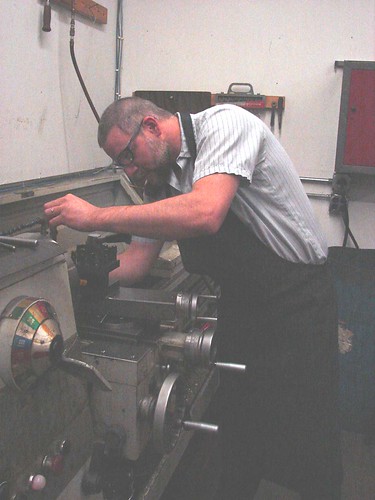
No one ever accused me of having a limited range of interests.
And here’s a truth to mull (as opposed to mill) over: better is not necessarily better. Live is inherently better than recorded, but live means that the noise level is set at “loud.” Or maybe even “very loud.”
There are a lot of guys out there who can really scream it out when given the chance. Women as well, but the men are louder.
I thought about noise levels and how sensitive I am to them. In the village of Pierrerue, where the walls were built of stone, so thick that the room never warmed up, not even on the hottest, sunniest days, I could still hear my neighbor cough in the morning. I wished he’d quit smoking and take care of his cough.
In the loft, I am surrounded by quiet types, which is good because otherwise I would most certainly move out.
You may think that this pull toward silence is age related. Maybe your eardrums do get sensitized when the gray hairs come out. But I have always liked quiet moments and gentle music and sounds of rain and all the other low key stuff.
It’s tougher to do quiet well. If you like loud crashing music I would think you could not possibly tell if something is excellent or just very good. With quiet music, you can hear fatal flaws. And so perhaps it is good that karaoke leans toward the loud. These same dudes would fall flat if asked to tone it down by maybe 500%.
On another note, I promised Ocean policy changes: comin’ up! Look for them on July 2nd, an anniversary of sorts for me.
As for trips and adventures: July 8th starts one.
In the meantime I am doing what I do best: a little of this a little of that. If asked how I spent my free time today, I would answer that I got the loft ready for week-end visitors, studied recipes for Basque cakes and worked on my newest project: setting up workshops for guys (come on: name me one female who would spend money to do this!) who want to learn CNC milling and are willing to travel to Madison to grind away with great precision at heavy metals.
Specifically, I visited the workshop of this person – one of Madison’s best machinists – to see if space was to be had in his expanding shop:

No one ever accused me of having a limited range of interests.
posted by nina, 6/28/2006 07:00:00 PM
| link
| (8) comments
Tuesday, June 27, 2006
bleeding hearts
If you want raspberries, come pick mine. I have a bumper crop. I cannot cope.
Thank you. As for those which I wont pick – freeze them.
Actually I am more interested in the challenge of producing a bumper crop than in the harvest of it. So go ahead, pick away.
Such a genuine invitation. I cannot turn it down. I head for the farmette of Ed, known to some of you from Sicily days this spring.
Ed, where are the paths that will lead me to the center of this…jungle?
There are, for the most part, no paths.
How do you reach the canes in the center?
I wear long pants and I have long arms.
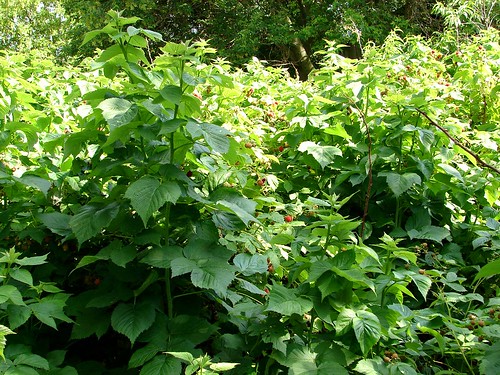
I am not wearing long pants and my arms are average.
After the season, I will do you a tremendous favor: I will clip and cut until there are paths as beautiful as the Boulevard St. Germain.
I can’t let you do that.
It’s okay, I owe it to you. You are generous with your berries.
No, it’s the clipping and pulling out of healthy canes. I cannot do that to them. They are producing fruit – it is unfair to punish them for this.
I think about that. Who on this planet feels sorry for extra vigorous raspberry canes? A bleeding heart plant liberal, that’s who. The same person perhaps who cannot eliminate seedling tomato plants – hundreds of them – because, well, they are growing.
I remember my garden last summer, the one planted by me over the years outside my suburban house. I knew I was about to leave it and there was something that told me it would be okay – I would only be passing it along to the next young family moving in. Over the years, I had been incapable of eliminating vigorous perennials, so that the garden had become very much a jungle of flowers, one towering over another, blooming with abandon but without order, all spring and summer long.
The family that bought the house took a plow to the entire flower bed, taking down everything, even the very beautiful bleeding heart plant that had lived and flourished for more than a dozen years. A gift from my daughters' elementary school for work I had done there. Gone now.
I plowed into the raspberry field with my body only, sweat pants covering my bare legs, short arms reaching for the closest berries. I said nothing more about creating paths or making improvements for future seasons.
Thank you. As for those which I wont pick – freeze them.
Actually I am more interested in the challenge of producing a bumper crop than in the harvest of it. So go ahead, pick away.
Such a genuine invitation. I cannot turn it down. I head for the farmette of Ed, known to some of you from Sicily days this spring.
Ed, where are the paths that will lead me to the center of this…jungle?
There are, for the most part, no paths.
How do you reach the canes in the center?
I wear long pants and I have long arms.

I am not wearing long pants and my arms are average.
After the season, I will do you a tremendous favor: I will clip and cut until there are paths as beautiful as the Boulevard St. Germain.
I can’t let you do that.
It’s okay, I owe it to you. You are generous with your berries.
No, it’s the clipping and pulling out of healthy canes. I cannot do that to them. They are producing fruit – it is unfair to punish them for this.
I think about that. Who on this planet feels sorry for extra vigorous raspberry canes? A bleeding heart plant liberal, that’s who. The same person perhaps who cannot eliminate seedling tomato plants – hundreds of them – because, well, they are growing.
I remember my garden last summer, the one planted by me over the years outside my suburban house. I knew I was about to leave it and there was something that told me it would be okay – I would only be passing it along to the next young family moving in. Over the years, I had been incapable of eliminating vigorous perennials, so that the garden had become very much a jungle of flowers, one towering over another, blooming with abandon but without order, all spring and summer long.
The family that bought the house took a plow to the entire flower bed, taking down everything, even the very beautiful bleeding heart plant that had lived and flourished for more than a dozen years. A gift from my daughters' elementary school for work I had done there. Gone now.
I plowed into the raspberry field with my body only, sweat pants covering my bare legs, short arms reaching for the closest berries. I said nothing more about creating paths or making improvements for future seasons.
posted by nina, 6/27/2006 07:45:00 PM
| link
| (0) comments
Monday, June 26, 2006
Blame it on the train. Or the rain. Or people without a purpose or destination.
Watching the numbers on the digital clock, I noted that time moves slower if there is no hour hand making its way from one, to two, to three.
If I slept last night, I did not notice. It seemed that I did not. Except if you do not sleep, you also do not awake and at two, quite suddenly, I was aware of being very much awake.
My loft looks out onto railroad tracks and I have found that to be a good thing. It’s not as if there are frequent trains zipping by on their way to interesting places like the Mississippi or the beaches of Lake Michigan.
But at two in the morning a train did pass by at the agonizing speed of .05 miles an hour. At most. It was a freight train, pulling a load of coal to a nearby power plant I think. And it screeched. And the cars banged against each other, or the tracks, or obstacles on the tracks -- who can tell anything beyond that the banging was pronounced.
Each time the train approached a street crossing, it let out a hellish warning – as if these tiny residential streets had traffic moving through them at this hour! The crossing gates were closed in any event and I could tell this because a closed gate adds an extra shrill and clang, warning drivers who perhaps are blind and cannot see, that the gate is closed.
And then the train stopped. Not the hissing and hooting part, but the moving along part. It stood there to torture every last resident in the Bassett downtown neighborhood of Madison, daring any of us to scream out the window to get moving already! Iron monster, indeed.
Eventually it did move and I went back to my nonsleep.
In the morning, after teaching a seminar downtown, I walked along State Street under the cover of an umbrella. Madison has artsy cows promoting our dairy industry. I remember when, several years ago, Chicago had artsy cows on display on Michigan Avenue. I had wondered then if they were also promoting Wisconsin’s dairy industry, manifesting pride perhaps in the accomplishments of Illinois' sister state?
There are many cleverly painted and decorated cows around the Capitol Square and on State Street, but the one that caught my eye was Ms Moo right outside the Art Center. She bore the title of Moonlight over Madison and she reminded me of how little sleep I got last night. The photo below shows off not her loveliness, but the wet drops of rain on her hide. You'll note that although her colors are yellow and blue, the emphasis is on shades of blue.
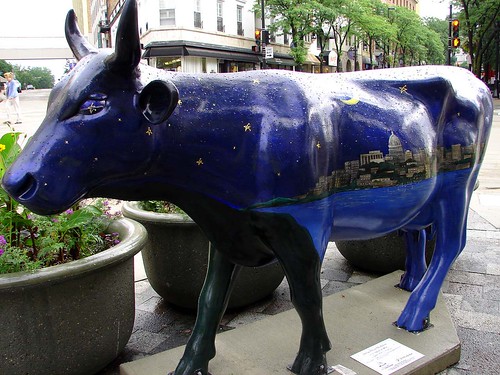
I love European trains. I rode maybe about 100 of them in the last two months and with perhaps one exception, I enjoyed them all.
But I do have a new respect for people whose homes are within spittin’ distance of a TGV (rapid train) track. Though perhaps the torture time, condensed to the two second zip, is significantly less than that of a screaming freighter that parks outside your window.
Close to campus, the rain ceased and the cows took on brighter Ocean-like colors.
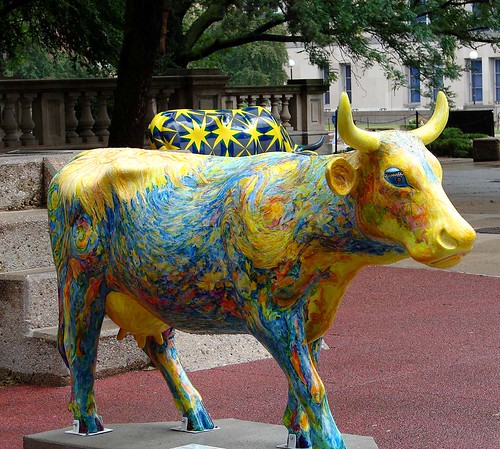
In the afternoon I called my landlord to ask if they were thinking of putting up benches outside the loft buildings. I would like to believe that on dazzling sunny days (and I have faith that there will be dazzling sunny days) I can take a coffee and a croissant and eat them outside. Front step will do, but I think asking for a bench is more reasonable.
The management sighed deeply and explained that they would very much like to put up benches but they are concerned that they would attract not residents wishing to savor a morning coffee but those without much purpose or destination in life, looking for a comfortable place to ingest something considerably stronger than coffee.
For the most part, it was a drippy kind of day.
If I slept last night, I did not notice. It seemed that I did not. Except if you do not sleep, you also do not awake and at two, quite suddenly, I was aware of being very much awake.
My loft looks out onto railroad tracks and I have found that to be a good thing. It’s not as if there are frequent trains zipping by on their way to interesting places like the Mississippi or the beaches of Lake Michigan.
But at two in the morning a train did pass by at the agonizing speed of .05 miles an hour. At most. It was a freight train, pulling a load of coal to a nearby power plant I think. And it screeched. And the cars banged against each other, or the tracks, or obstacles on the tracks -- who can tell anything beyond that the banging was pronounced.
Each time the train approached a street crossing, it let out a hellish warning – as if these tiny residential streets had traffic moving through them at this hour! The crossing gates were closed in any event and I could tell this because a closed gate adds an extra shrill and clang, warning drivers who perhaps are blind and cannot see, that the gate is closed.
And then the train stopped. Not the hissing and hooting part, but the moving along part. It stood there to torture every last resident in the Bassett downtown neighborhood of Madison, daring any of us to scream out the window to get moving already! Iron monster, indeed.
Eventually it did move and I went back to my nonsleep.
In the morning, after teaching a seminar downtown, I walked along State Street under the cover of an umbrella. Madison has artsy cows promoting our dairy industry. I remember when, several years ago, Chicago had artsy cows on display on Michigan Avenue. I had wondered then if they were also promoting Wisconsin’s dairy industry, manifesting pride perhaps in the accomplishments of Illinois' sister state?
There are many cleverly painted and decorated cows around the Capitol Square and on State Street, but the one that caught my eye was Ms Moo right outside the Art Center. She bore the title of Moonlight over Madison and she reminded me of how little sleep I got last night. The photo below shows off not her loveliness, but the wet drops of rain on her hide. You'll note that although her colors are yellow and blue, the emphasis is on shades of blue.

I love European trains. I rode maybe about 100 of them in the last two months and with perhaps one exception, I enjoyed them all.
But I do have a new respect for people whose homes are within spittin’ distance of a TGV (rapid train) track. Though perhaps the torture time, condensed to the two second zip, is significantly less than that of a screaming freighter that parks outside your window.
Close to campus, the rain ceased and the cows took on brighter Ocean-like colors.

In the afternoon I called my landlord to ask if they were thinking of putting up benches outside the loft buildings. I would like to believe that on dazzling sunny days (and I have faith that there will be dazzling sunny days) I can take a coffee and a croissant and eat them outside. Front step will do, but I think asking for a bench is more reasonable.
The management sighed deeply and explained that they would very much like to put up benches but they are concerned that they would attract not residents wishing to savor a morning coffee but those without much purpose or destination in life, looking for a comfortable place to ingest something considerably stronger than coffee.
For the most part, it was a drippy kind of day.
posted by nina, 6/26/2006 05:55:00 PM
| link
| (5) comments
Sunday, June 25, 2006
confusion
Day is night, night is day, sleep comes and goes, hours are a jumble of mismatched moments.
Someone called me the other night – I had been fast asleep. She asked me to call a friend of ours and I responded that I could not – my money on the phone card had run out. Indeed, my money on my phone card had run out on the last day in France. The startling truth is that I do not need a phone card in Madison.
Sunday comes and I ask friends to come over for lunch. Goat cheese on toasts over a salad and rosé wine (Coteaux du Languedoc. I am your advocate, your mouthpiece here. I walk with images of your vineyards in my head).They indulge me and break up their weekend to be at the loft. I pick berries early in the morning and search for baguette substitutes at the store. I am happy. Sunday afternoon, at home, with goat cheese toasts and friends. And two saved Basque cakes – one with cherry preserves and one with honey and spices.
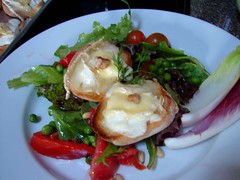
It’s blissful to have this more leisurely approach to the day and indeed, when the last person leaves and the last dish has been put away, I take a nap.
I wake up two hours later – it is not quite dark. Have I missed a post? Should I be at work? No, it is not night turning into day, it is day turning into night.
I drink coffee nonetheless. I think I should have a croissant with it. I know not to go in to the office, I know that much.
And I did not miss an Ocean day, I am here, at the computer and I know to write. There are a few certainties to my days right now. But only a handful. On most fronts, I have been sucked into a sea of confusion.
OCEAN TEASER: this week, look forward to announcements concerning a brand new Ocean policy and a forthcoming trip into the wilderness. Ah, the wheels of change!
Someone called me the other night – I had been fast asleep. She asked me to call a friend of ours and I responded that I could not – my money on the phone card had run out. Indeed, my money on my phone card had run out on the last day in France. The startling truth is that I do not need a phone card in Madison.
Sunday comes and I ask friends to come over for lunch. Goat cheese on toasts over a salad and rosé wine (Coteaux du Languedoc. I am your advocate, your mouthpiece here. I walk with images of your vineyards in my head).They indulge me and break up their weekend to be at the loft. I pick berries early in the morning and search for baguette substitutes at the store. I am happy. Sunday afternoon, at home, with goat cheese toasts and friends. And two saved Basque cakes – one with cherry preserves and one with honey and spices.

It’s blissful to have this more leisurely approach to the day and indeed, when the last person leaves and the last dish has been put away, I take a nap.
I wake up two hours later – it is not quite dark. Have I missed a post? Should I be at work? No, it is not night turning into day, it is day turning into night.
I drink coffee nonetheless. I think I should have a croissant with it. I know not to go in to the office, I know that much.
And I did not miss an Ocean day, I am here, at the computer and I know to write. There are a few certainties to my days right now. But only a handful. On most fronts, I have been sucked into a sea of confusion.
OCEAN TEASER: this week, look forward to announcements concerning a brand new Ocean policy and a forthcoming trip into the wilderness. Ah, the wheels of change!
posted by nina, 6/25/2006 11:05:00 PM
| link
| (3) comments
Saturday, June 24, 2006
entre deux
Entre deux. Between two: between mountains and sea (like Pierrerue), between two worlds (like me).
Madison’s Saturday market. It’s my first this year. Slow going. The foods are good though. But it’s different than back in St. Chinian. There, one cheese guy would sell ten, twenty different artisanal cheeses. Here, each producer displays her or his own. I note one but want to check out another. I have to backtrack. Where you begin the “circle around the Square” becomes quite strategic.
On the up side: the flowers today are magnificent.
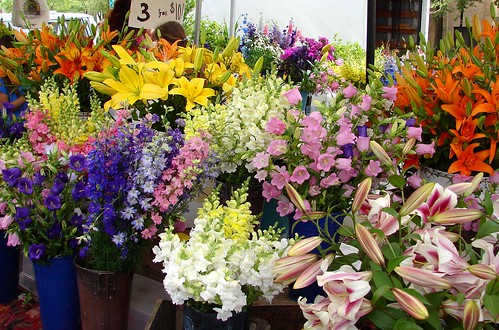
In St. Chinian, I wanted to buy flowers for my Sunday lunch hosts. I thought, perhaps, that bringing a bouquet of 15 roses was overkill so I asked for something smaller. The flower seller shrugged, pointed to some lesser flowers and went on to form his giant bouquets. It took a while to convince him to do a smaller one for me. Here, the mix and match opportunities are infinite.
But oh, do I miss the olive stand. Spicy, garlicy, herbed, dried, brined, so delicious, served at every meal I ate in France, Sicily and Croatia. Missing from our markets here. Face it, Wisconsin can never become the olive capital of the world. It’s fussing with vineyards, why I do not know. We should stick with cheeses.
On the up side: we have the greatest number of artisanal cheese producers in the country. We let California pick up more and more of the mass-marketed stuff (go for it, California!), but we are leading in the beautiful chevres, sheep’s milk camemberts, cows’ milk beaufort-like aged tommes.
I go to Steve’s Liquor to stock up on rose wines.
What great rosés do you have from the Languedoc region?
There’s one good one. We try to promote them, we really do.
I sense the frustration.
I see you heard about the EU discussion of wine subsidies this week. [10% of French wines do not get consumed and I’m sure the percentage is higher from Languedoc. It winds up being converted to industrial-grade alcohol. Producers receive subsidies, but the writing on the EU wall says: no more.]
Don’t make me feel bad for promoting Australian wines today!
I think any time you promote quality, you are doing a good thing. It’s when people buy cheap new world stuff that the moderately priced old world producers suffer.
I’m going this September for the harvest. Are you?
No, September is a terrible month for me to travel, unfortunately. How is it? I’ve always wanted to go…
A lot of prostitutes on the side roads! They follow the pickers as they move up north with the harvest.
On the up side: we don’t get prostitutes in the States for the harvest. I don’t think. But what do I know – California is so far away. California, where 80% of the wine is made by 4 major producers. France, where in any one region you will find over ten thousand small producers.
Changes, I note that even in two months a place can change. Berries ripen, buildings get torn down. What happened to the corner building on Park and University? A new Bruggers’ Bagel store went up next to Starbucks. Ed, who had been with me in Sicily, is driving a new (but very old) truck.
The other one rusted out so much that the bottom was threatening to fall out. I wanted a small one and could not find one. This ’92 Ford Ranger has V6 engine and power steering. What can you do… I see gas prices are going down again. People will drive more and keep on using bigger cars.
Music, I hear music. Off to the side of the market, two couples are dancing in traditional costumes. Wait, I know that folk costume. It’s Polish. Polish pride, here at the Madison market. Basque pride at the St. Jean de Luz market.
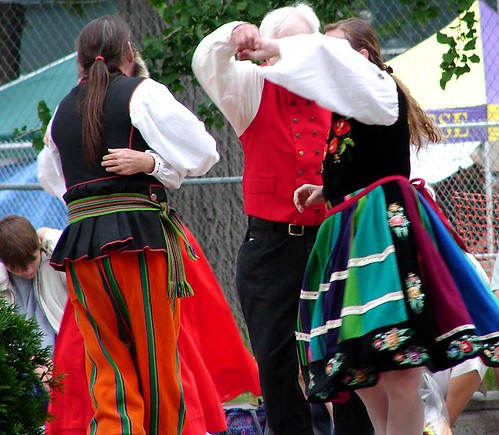
I check Ocean comments. People write such nice things! I see Carole and Jean-Francois from Aigues Mortes are commenting. I go to their website to see photos of their Camargue days. I am transported to the hour at their two-table eatery and wine tasting shop. If I could be anyplace right now (5pm, as it was then), it may well be there.
I unpack my Pierrerue neighbor artist’s paintings. I stand them against the wall for now. It will be a while before I can think about the extravagance of good frames. They deserve good frames.
Madison’s Saturday market. It’s my first this year. Slow going. The foods are good though. But it’s different than back in St. Chinian. There, one cheese guy would sell ten, twenty different artisanal cheeses. Here, each producer displays her or his own. I note one but want to check out another. I have to backtrack. Where you begin the “circle around the Square” becomes quite strategic.
On the up side: the flowers today are magnificent.

In St. Chinian, I wanted to buy flowers for my Sunday lunch hosts. I thought, perhaps, that bringing a bouquet of 15 roses was overkill so I asked for something smaller. The flower seller shrugged, pointed to some lesser flowers and went on to form his giant bouquets. It took a while to convince him to do a smaller one for me. Here, the mix and match opportunities are infinite.
But oh, do I miss the olive stand. Spicy, garlicy, herbed, dried, brined, so delicious, served at every meal I ate in France, Sicily and Croatia. Missing from our markets here. Face it, Wisconsin can never become the olive capital of the world. It’s fussing with vineyards, why I do not know. We should stick with cheeses.
On the up side: we have the greatest number of artisanal cheese producers in the country. We let California pick up more and more of the mass-marketed stuff (go for it, California!), but we are leading in the beautiful chevres, sheep’s milk camemberts, cows’ milk beaufort-like aged tommes.
I go to Steve’s Liquor to stock up on rose wines.
What great rosés do you have from the Languedoc region?
There’s one good one. We try to promote them, we really do.
I sense the frustration.
I see you heard about the EU discussion of wine subsidies this week. [10% of French wines do not get consumed and I’m sure the percentage is higher from Languedoc. It winds up being converted to industrial-grade alcohol. Producers receive subsidies, but the writing on the EU wall says: no more.]
Don’t make me feel bad for promoting Australian wines today!
I think any time you promote quality, you are doing a good thing. It’s when people buy cheap new world stuff that the moderately priced old world producers suffer.
I’m going this September for the harvest. Are you?
No, September is a terrible month for me to travel, unfortunately. How is it? I’ve always wanted to go…
A lot of prostitutes on the side roads! They follow the pickers as they move up north with the harvest.
On the up side: we don’t get prostitutes in the States for the harvest. I don’t think. But what do I know – California is so far away. California, where 80% of the wine is made by 4 major producers. France, where in any one region you will find over ten thousand small producers.
Changes, I note that even in two months a place can change. Berries ripen, buildings get torn down. What happened to the corner building on Park and University? A new Bruggers’ Bagel store went up next to Starbucks. Ed, who had been with me in Sicily, is driving a new (but very old) truck.
The other one rusted out so much that the bottom was threatening to fall out. I wanted a small one and could not find one. This ’92 Ford Ranger has V6 engine and power steering. What can you do… I see gas prices are going down again. People will drive more and keep on using bigger cars.
Music, I hear music. Off to the side of the market, two couples are dancing in traditional costumes. Wait, I know that folk costume. It’s Polish. Polish pride, here at the Madison market. Basque pride at the St. Jean de Luz market.

I check Ocean comments. People write such nice things! I see Carole and Jean-Francois from Aigues Mortes are commenting. I go to their website to see photos of their Camargue days. I am transported to the hour at their two-table eatery and wine tasting shop. If I could be anyplace right now (5pm, as it was then), it may well be there.
I unpack my Pierrerue neighbor artist’s paintings. I stand them against the wall for now. It will be a while before I can think about the extravagance of good frames. They deserve good frames.
posted by nina, 6/24/2006 06:25:00 PM
| link
| (1) comments
Friday, June 23, 2006
reentry
In a Paris morning, one last sip, one final taste.
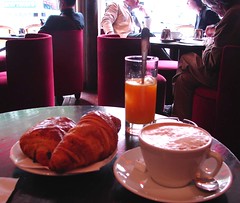
Ready? Let’s go.
Except I am not ready.
I fight back the overwhelming desire to, well, cry. During the entire 10 hour (delays, bad winds) flight.
Back home I put on the newest French heartthrob that had been on my radio station throughout my entire travels through France, Raphael. I want to recall how it was when I was zipping through grape fields and past beaches, happy to be done with work for the day, happy with the afternoon ahead.
In Madison I do not bother to even take suitcases out of the car. Not Thursday, not Friday. Instead, I take Mr. B out for a spin: the day is lovely, sunny, welcome back, welcome back! Indeed, so many similarities here, just look for them:
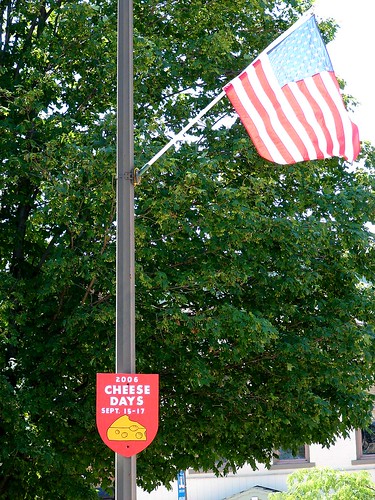
celebrating food
I eat breakfast late, on the lawn of Monroe’s central quare. The town is some 30 kms from Madison. It has good coffee, great coffee! So it’s okay, no?
I eat Basque Cake that I brought back with me from Southwest France.
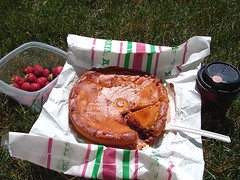
Beautiful scenery. Past pastures – see, they have pastures here! Past streams – look, dragonflies! Beautiful, all beautiful.
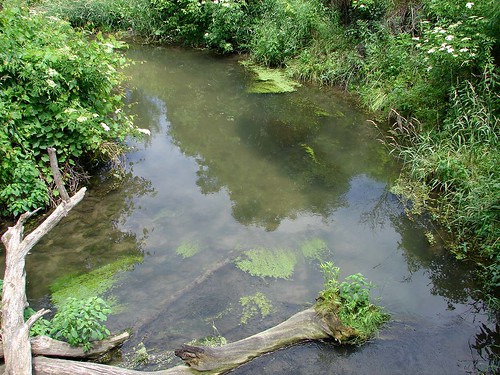
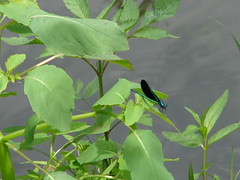
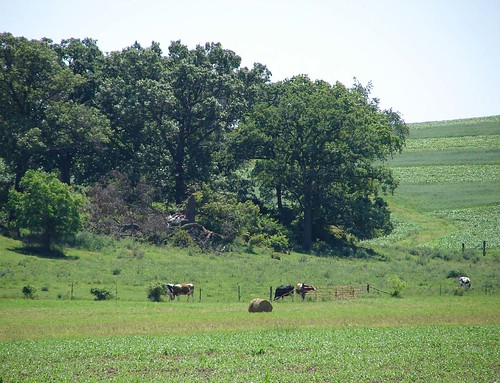
Finally, the inevitable. I go to the post office and pick up two months’ worth of mail. I drag the suitcases upstairs. I unpack by throwing everything on the floor.
I love it here, in Madison. But... God, a bird has thrown a bunch of shit right on the window before which my computer sits.
And, like in Pierrerue, there are ants in the kitchen.
Now is the time for a good cry.

Ready? Let’s go.
Except I am not ready.
I fight back the overwhelming desire to, well, cry. During the entire 10 hour (delays, bad winds) flight.
Back home I put on the newest French heartthrob that had been on my radio station throughout my entire travels through France, Raphael. I want to recall how it was when I was zipping through grape fields and past beaches, happy to be done with work for the day, happy with the afternoon ahead.
In Madison I do not bother to even take suitcases out of the car. Not Thursday, not Friday. Instead, I take Mr. B out for a spin: the day is lovely, sunny, welcome back, welcome back! Indeed, so many similarities here, just look for them:

celebrating food
I eat breakfast late, on the lawn of Monroe’s central quare. The town is some 30 kms from Madison. It has good coffee, great coffee! So it’s okay, no?
I eat Basque Cake that I brought back with me from Southwest France.

Beautiful scenery. Past pastures – see, they have pastures here! Past streams – look, dragonflies! Beautiful, all beautiful.



Finally, the inevitable. I go to the post office and pick up two months’ worth of mail. I drag the suitcases upstairs. I unpack by throwing everything on the floor.
I love it here, in Madison. But... God, a bird has thrown a bunch of shit right on the window before which my computer sits.
And, like in Pierrerue, there are ants in the kitchen.
Now is the time for a good cry.
posted by nina, 6/23/2006 07:35:00 PM
| link
| (10) comments
Thursday, June 22, 2006
From Paris: let there be music and a dog
Well, it happened that I missed my train from Bordeaux to Paris.
It was like this: I get up before 6. I finish packing, tightly, oh so tightly fitting things into two bags, one backpack, with an added painting and a purse swinging from whatever limb can bear it.
I pack up the car and wait for breakfast. I could have skipped this meal I suppose, but it is perhaps my favorite moment of the day to sit there over a café au lait with croissant and some other surprise pastry and I am not about to give it up for some random train reservation.
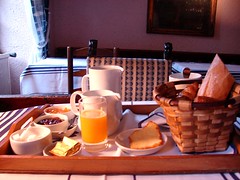
Then, I fall in love with a placemat. Really, I think it is just an excuse to not go, but I actually take precious minutes to find out from madame if such placemats are to be had in her little village store selling cloths from the region. She checks. No, it is an old pattern. I would probably find it still somewhere in St Jean de Luz, but she no longer sells any here in Sare.
I say good bye and head out toward the highway. But before I reach the highway I pull over and think. I am a few minutes off schedule. What if I miss the train? There would be another one several hours later but there I would be, sitting awkwardly with my bags, killing time in Bordeaux, whereas I could be, for example, in the port town of St Jean de Luz (and by chance, if I find an old fashioned placemat, why, it would be fate).
And who would not pick St Jean de Luz over an afternoon in Paris?
So here I am in St Jean de Luz instead of Paris and loving every minute of it. The streets are crowded with shoppers, the ports have emptied out the fish for the day, the markets are brimming.
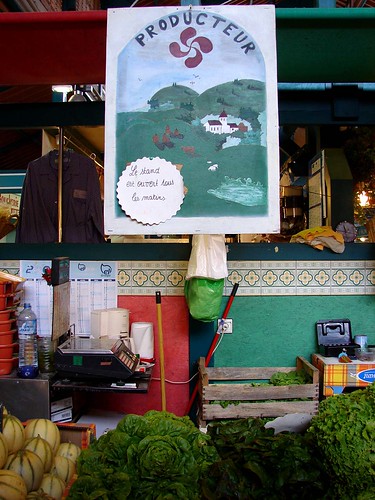
symbol of Basque pride at the market
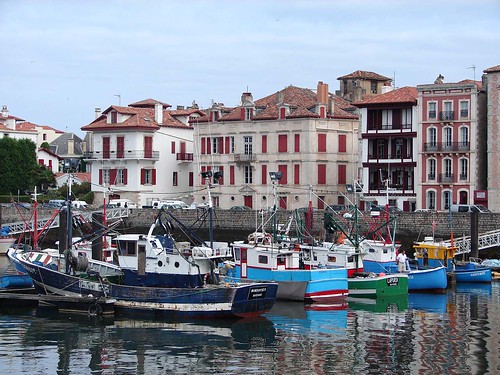
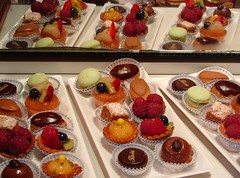
And because it is St. John’s Day (a very important day for most Europeans and for me: longest days are to be celebrated!) and I am in the town that sports this name, it is all rather festive.
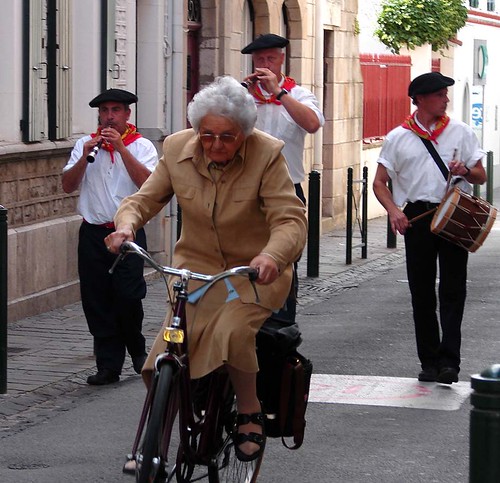
Inevitably I must get myself to Bordeaux and find another rapid train to Paris. It’s not as if Paris is a punishment after all. Still, I already miss the sheep and cows and goats. And vineyards. And cherries. And warm sands and mountain peaks… Oh, let me switch gears.
I look outside my tiny Parisian room and sigh. It’s an okay view, but I do not hear bees humming nor roosters crowing.
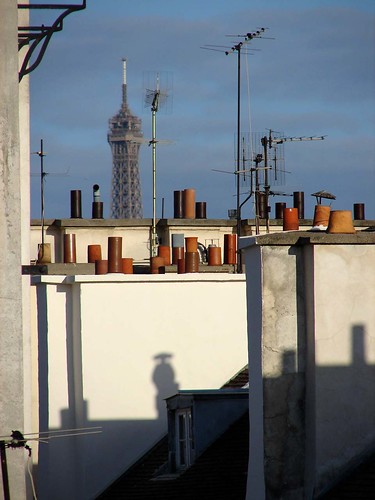
Still, June 21st is a fantastic night to spend in Paris. December 31st gets the spotlight and the glamour, but this night outshines it. For one thing, it’s warmer.
Twenty-five years ago the Minister of Culture proclaimed: on this longest day of the year, let there be music in all of France! Everyone and anyone who can play anything can set up on the street, no permit, nothing needed except some amplifiers and a song or two.
And the crowds are out, filling every street, pushing cars out of the way, and the music is heard over the roar of city life.
I decide to skip the traditional meal at standby places and go to a more modern spot (Ze Kitchen Gallerie), ripped from the book of talented young chefs that Alain gave me back in the Savoie. The food is excellent, the atmosphere is city-impersonal.
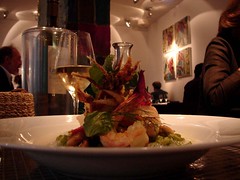
Shrimp, frogs legs, softshell crab, roquette, flowers of herbs
At the table next to me, a couple sits down with a monstrously big dog. It is hard to fit him in, but I tell them he can sleep on my leg, all 500 pounds of him. He is my companion.
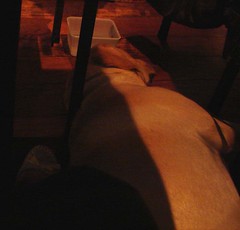
In every restaurant I ate during the last six weeks, I have been the only solo diner (in part, this has to do with the fact that I ate outside the big cities). Even though it goes against the grain of how I feel about dining (it ought to be a communal affair), I have to admit, I do not mind eating out alone in this country. French waiters treat me superbly. I get wonderful tables and attentive service.
But on this night, I welcome the warmth of the dog on my leg. I appreciate this city each time I am here. I love its vigor, I love the way young people find quiet spots for their own pleasure…
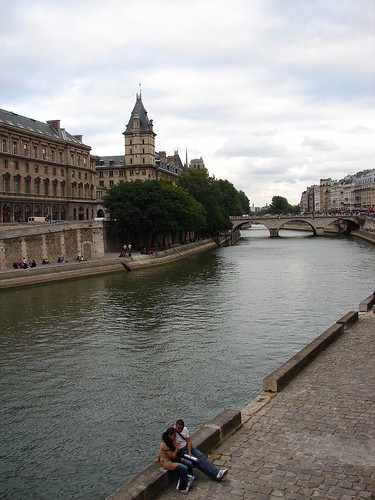
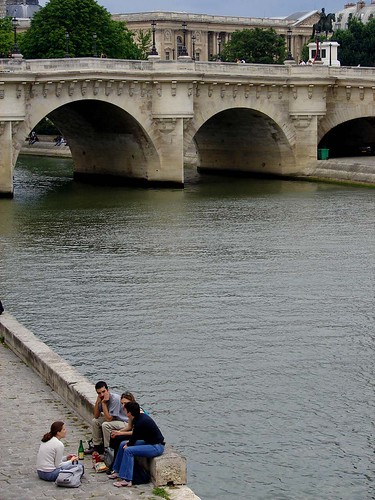
But just this one time, I also liked having a dog on my foot.
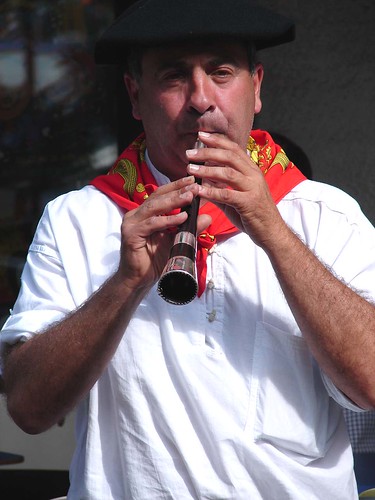
from Basque: let there be music
It was like this: I get up before 6. I finish packing, tightly, oh so tightly fitting things into two bags, one backpack, with an added painting and a purse swinging from whatever limb can bear it.
I pack up the car and wait for breakfast. I could have skipped this meal I suppose, but it is perhaps my favorite moment of the day to sit there over a café au lait with croissant and some other surprise pastry and I am not about to give it up for some random train reservation.

Then, I fall in love with a placemat. Really, I think it is just an excuse to not go, but I actually take precious minutes to find out from madame if such placemats are to be had in her little village store selling cloths from the region. She checks. No, it is an old pattern. I would probably find it still somewhere in St Jean de Luz, but she no longer sells any here in Sare.
I say good bye and head out toward the highway. But before I reach the highway I pull over and think. I am a few minutes off schedule. What if I miss the train? There would be another one several hours later but there I would be, sitting awkwardly with my bags, killing time in Bordeaux, whereas I could be, for example, in the port town of St Jean de Luz (and by chance, if I find an old fashioned placemat, why, it would be fate).
And who would not pick St Jean de Luz over an afternoon in Paris?
So here I am in St Jean de Luz instead of Paris and loving every minute of it. The streets are crowded with shoppers, the ports have emptied out the fish for the day, the markets are brimming.

symbol of Basque pride at the market


And because it is St. John’s Day (a very important day for most Europeans and for me: longest days are to be celebrated!) and I am in the town that sports this name, it is all rather festive.

Inevitably I must get myself to Bordeaux and find another rapid train to Paris. It’s not as if Paris is a punishment after all. Still, I already miss the sheep and cows and goats. And vineyards. And cherries. And warm sands and mountain peaks… Oh, let me switch gears.
I look outside my tiny Parisian room and sigh. It’s an okay view, but I do not hear bees humming nor roosters crowing.

Still, June 21st is a fantastic night to spend in Paris. December 31st gets the spotlight and the glamour, but this night outshines it. For one thing, it’s warmer.
Twenty-five years ago the Minister of Culture proclaimed: on this longest day of the year, let there be music in all of France! Everyone and anyone who can play anything can set up on the street, no permit, nothing needed except some amplifiers and a song or two.
And the crowds are out, filling every street, pushing cars out of the way, and the music is heard over the roar of city life.
I decide to skip the traditional meal at standby places and go to a more modern spot (Ze Kitchen Gallerie), ripped from the book of talented young chefs that Alain gave me back in the Savoie. The food is excellent, the atmosphere is city-impersonal.

Shrimp, frogs legs, softshell crab, roquette, flowers of herbs
At the table next to me, a couple sits down with a monstrously big dog. It is hard to fit him in, but I tell them he can sleep on my leg, all 500 pounds of him. He is my companion.

In every restaurant I ate during the last six weeks, I have been the only solo diner (in part, this has to do with the fact that I ate outside the big cities). Even though it goes against the grain of how I feel about dining (it ought to be a communal affair), I have to admit, I do not mind eating out alone in this country. French waiters treat me superbly. I get wonderful tables and attentive service.
But on this night, I welcome the warmth of the dog on my leg. I appreciate this city each time I am here. I love its vigor, I love the way young people find quiet spots for their own pleasure…


But just this one time, I also liked having a dog on my foot.

from Basque: let there be music
posted by nina, 6/22/2006 12:55:00 AM
| link
| (6) comments
Wednesday, June 21, 2006
from Sare: pastures and peppers
Not that we are looking to make Madison a mega tourist destination. Certainly that would have its drawbacks. I already regard our farmers market as too crowded with south of the (Illinois) border types who think it’s quaint and charming and take up all credible sidewalk space each Saturday on the Square.
Nonetheless, wouldn’t it be interesting to pick something and make it a Madison special and really hype it up some and then the world would know that we were the capitol of, say, lilacs? We could have a lilac fair in May and we could develop artisanal lilac wines and cheeses, or at least bath salts and linens… No, that doesn’t quite cut it. Too matronly. Madison is hip. Maybe we could try growing extreme amounts of garlic. Garlic is cool across ages and cultures.
The little village of Espelette, some 15 kilometers from Sare, is the pimento center of the world. They not only grow the peppers, but they make them into all sorts of things and peppers have thus become one of the symbols of Basqueness. Everyone has linens with stripes at home, of that I am certain and everyone has towels or plates or something with three little peppers. It looks like a regular New Mexico here, with all the peppers.
I chose village and country hopping over hiking on my last full day in southern France, not because I was down on exercise, but because foliage is still dripping from the early morning rains. Good excuse, don’t you think?
And since I am so close to Spain, I know I also have to ride over and back, just to check things out.
It appears that it is a completely open border. I note that the booth stands empty, probably because I am driving to Spain during lunch time and no way is anyone going to choose border patrol over eating and napping.
It is not that interesting on the other side of the border as there is no village there and all I got for my efforts were road signs in several languages I did not comprehend (Basque and Spanish) and so I probably did the fastest visit to another country known to anyone: 90 seconds flat.
On the French side, I stopped at a flower designated village dripping with Basqueness (Ainhoa). Everyone told me I should see it and I am glad, because it has an abundance of older Basque houses, though one might observe that they are sort of similar and once you get the feel for them you can turn around and go home.
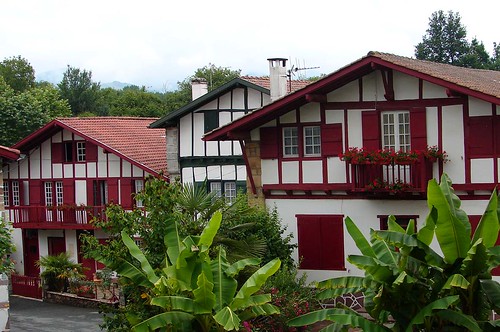
Except that I did not go home. I went next to the capital of the pimento world (population: probably around 400). Before immersing myself in all things pimento, I searched for a place that would offer a warm chevre-on-toasts salad. No luck there. A café did sell Basque cheese with cherry jam and I thought this was a fine enough substitute. Especially with a glass of rose wine.
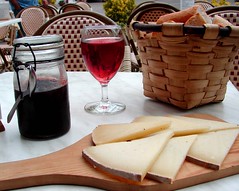
It happened that the waiter got every part of the order wrong before he got it right, and there are not many mistakes you can make with “a plate of cheese and a glass of rose wine.”
I have observed that the French are very patient with poor service. Here, the couple next to me was getting a tad upset, but that was only because they had to wait for half an hour for a slice of cake and the place had only two other tables occupied.
At the third table, another couple finally did get their order, and it was wrong as well and had to be sent back (he confused tea with coffee). Both of them looked our way and the gentlemen stretched his legs out, shrugged and smiled. “Can’t stress about it,” he said. Indeed, he looked very unstressed. I suppose if you take three hour lunch breaks routinely, a half an hour wait for a café isn’t going to make you or break you.
Anyway, the village was charming and it indeed had tons of pimentos and pimento products, though it will look even more colorful come fall and last year’s darkened peppers are replaced with this year’s red ones, strung out to dry.
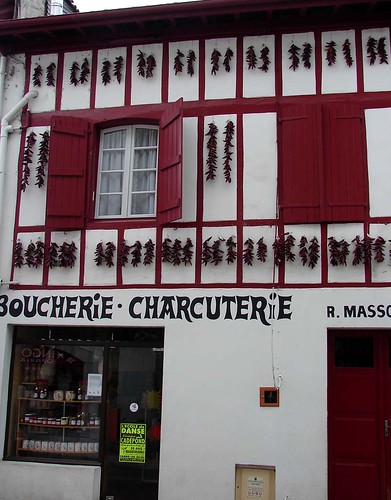
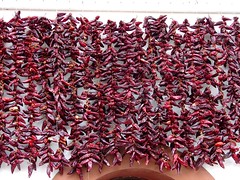
In the pimento town parking space I noticed that someone had backed into my rental car and cracked the tail light. Now isn’t that a bum deal? I have driven through Sicily’s tight mountain alleys, sped through the Languedoc and worked my way up and down to Pierrerue and incurred no dent or damage and here, standing absolutely still I get smashed into. A regular hit and run.
So what do I do? I go back to Sare, stretch out for a tiny siesta and listen to the bees outside. Can’t stress about it.
Later that evening I get motivated and take one last hike into the country. These photos may mean nothing to you, but for me, they are all about southern France and how I have come to know it – through villages and pastures and forests rather than towns and cities. Making friends with cows and sheep. I think I am rediscovering my agrarian roots (of course, ultimately, we all have agrarian roots).
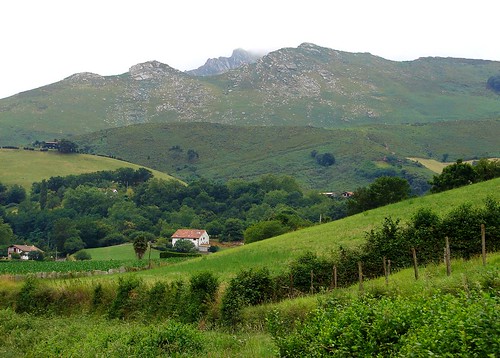
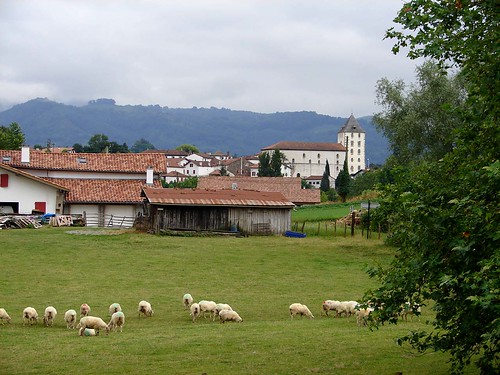
mountains in clouds, Sare in the background, sheep
My last country dinner is at the country auberge where I am staying. I like this place quite a lot. It is run by one big Basque family: brothers, wives, sisters of wives, even a cousin or two, all there, doing their various tasks. I don’t know if there are some rough spots, but as I sit downstairs in the mornings and work on my computer, I find it ever so pleasant to listen to them go about their business, calmly, confidently moving this great ship of food and rooms forward. Their young children are scampering about, except during the actual lunch and dinner service when they retreat with one of the many who are there to care for them.
I had Basque fish for my first course and Basque duck for my second one, with a Basque aperitif and Basque rose wine for the dinner itself, capped with a noisette and I wish I could say my plate is full but really it is quite empty because in the morning I have to speed like a demon to Bordeaux and catch the train to Paris so that the next day I can catch the flight back home.
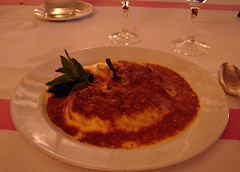
pear gratin, to finish things off
Nonetheless, wouldn’t it be interesting to pick something and make it a Madison special and really hype it up some and then the world would know that we were the capitol of, say, lilacs? We could have a lilac fair in May and we could develop artisanal lilac wines and cheeses, or at least bath salts and linens… No, that doesn’t quite cut it. Too matronly. Madison is hip. Maybe we could try growing extreme amounts of garlic. Garlic is cool across ages and cultures.
The little village of Espelette, some 15 kilometers from Sare, is the pimento center of the world. They not only grow the peppers, but they make them into all sorts of things and peppers have thus become one of the symbols of Basqueness. Everyone has linens with stripes at home, of that I am certain and everyone has towels or plates or something with three little peppers. It looks like a regular New Mexico here, with all the peppers.
I chose village and country hopping over hiking on my last full day in southern France, not because I was down on exercise, but because foliage is still dripping from the early morning rains. Good excuse, don’t you think?
And since I am so close to Spain, I know I also have to ride over and back, just to check things out.
It appears that it is a completely open border. I note that the booth stands empty, probably because I am driving to Spain during lunch time and no way is anyone going to choose border patrol over eating and napping.
It is not that interesting on the other side of the border as there is no village there and all I got for my efforts were road signs in several languages I did not comprehend (Basque and Spanish) and so I probably did the fastest visit to another country known to anyone: 90 seconds flat.
On the French side, I stopped at a flower designated village dripping with Basqueness (Ainhoa). Everyone told me I should see it and I am glad, because it has an abundance of older Basque houses, though one might observe that they are sort of similar and once you get the feel for them you can turn around and go home.

Except that I did not go home. I went next to the capital of the pimento world (population: probably around 400). Before immersing myself in all things pimento, I searched for a place that would offer a warm chevre-on-toasts salad. No luck there. A café did sell Basque cheese with cherry jam and I thought this was a fine enough substitute. Especially with a glass of rose wine.

It happened that the waiter got every part of the order wrong before he got it right, and there are not many mistakes you can make with “a plate of cheese and a glass of rose wine.”
I have observed that the French are very patient with poor service. Here, the couple next to me was getting a tad upset, but that was only because they had to wait for half an hour for a slice of cake and the place had only two other tables occupied.
At the third table, another couple finally did get their order, and it was wrong as well and had to be sent back (he confused tea with coffee). Both of them looked our way and the gentlemen stretched his legs out, shrugged and smiled. “Can’t stress about it,” he said. Indeed, he looked very unstressed. I suppose if you take three hour lunch breaks routinely, a half an hour wait for a café isn’t going to make you or break you.
Anyway, the village was charming and it indeed had tons of pimentos and pimento products, though it will look even more colorful come fall and last year’s darkened peppers are replaced with this year’s red ones, strung out to dry.


In the pimento town parking space I noticed that someone had backed into my rental car and cracked the tail light. Now isn’t that a bum deal? I have driven through Sicily’s tight mountain alleys, sped through the Languedoc and worked my way up and down to Pierrerue and incurred no dent or damage and here, standing absolutely still I get smashed into. A regular hit and run.
So what do I do? I go back to Sare, stretch out for a tiny siesta and listen to the bees outside. Can’t stress about it.
Later that evening I get motivated and take one last hike into the country. These photos may mean nothing to you, but for me, they are all about southern France and how I have come to know it – through villages and pastures and forests rather than towns and cities. Making friends with cows and sheep. I think I am rediscovering my agrarian roots (of course, ultimately, we all have agrarian roots).


mountains in clouds, Sare in the background, sheep
My last country dinner is at the country auberge where I am staying. I like this place quite a lot. It is run by one big Basque family: brothers, wives, sisters of wives, even a cousin or two, all there, doing their various tasks. I don’t know if there are some rough spots, but as I sit downstairs in the mornings and work on my computer, I find it ever so pleasant to listen to them go about their business, calmly, confidently moving this great ship of food and rooms forward. Their young children are scampering about, except during the actual lunch and dinner service when they retreat with one of the many who are there to care for them.
I had Basque fish for my first course and Basque duck for my second one, with a Basque aperitif and Basque rose wine for the dinner itself, capped with a noisette and I wish I could say my plate is full but really it is quite empty because in the morning I have to speed like a demon to Bordeaux and catch the train to Paris so that the next day I can catch the flight back home.

pear gratin, to finish things off
posted by nina, 6/21/2006 11:40:00 AM
| link
| (1) comments
Tuesday, June 20, 2006
from Sare: turn of the century update on travel to southwest France
I am only 45 minutes by car from Biarritz and even less minutes away from St Jean de Luz, a major fishing town on the Atlantic. I’ve read all about the posh times when Biarritz pandered to the wealthy and came to have an international reputation for its glitzy hotels and promenades along the ocean front. I cannot be so close and not take a look.
Much to my surprise, that reputation not withstanding, I like the town. The twenty first century has changed it somewhat. The beaches here have a pounding surf and surfboards give it a California-like relaxed look. And, of course, women tanning their breasts cannot have been common in the early 1900s.
True, it is dangerous to place me in a French town with good stores, particularly as the weather isn’t especially beachy, but I tell myself firmly that I must stop after that cropped pair of pants and I hold (basically) to my resolve.
Lunch in an out of the way patio reinforces my belief that from now on, grilled chevre on a salad will be my midday routine. Okay, I’ll eliminate the rose wine, reluctantly. So long as there is no time for a nap, there can be no room for a midafternoon rose.
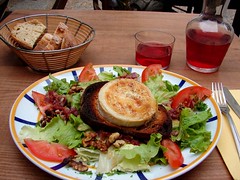
It is, of course, unfair to compare the southern stretch of the Atlantic to the southern stretch of the Mediterranean, but who cares about fair – I do it anyway. That cool surf sure can knock you down flat here. And I miss the winds of Languedoc. And the way one village doesn’t quite hook into the next – there are stretches of countryside in between.
Still, Biarritz is pretty and I like pretty.
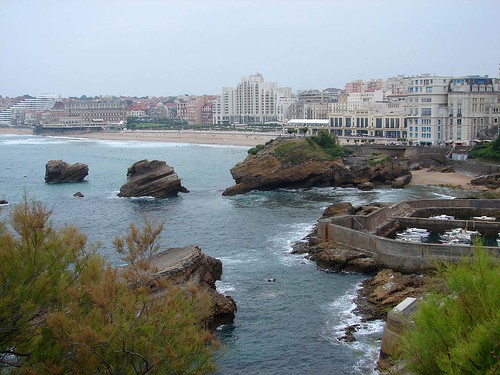
But I like St Jean de Luz even more. If Biarritz has Basque allegiance, it seems rather forced. You want to say – yeah, sure, you’re as French as anything. If anything, you’re jet-setty which doesn’t quite fit with the authentic language bit and traditional Basque way of life.
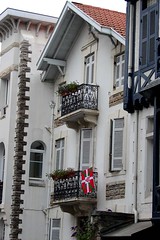
Biarritz Basque pride
St. Jean de Luz is an authentic and vibrant fishing town. Most of the houses are Basque houses.
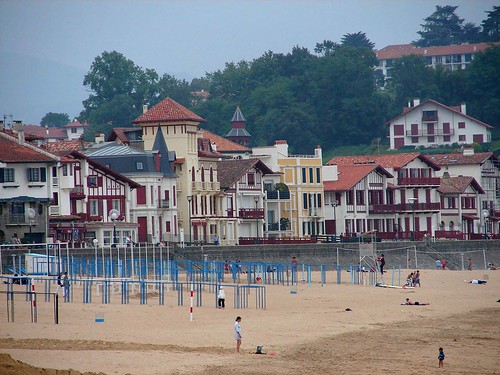
Store after store sells Basque linens – beautiful fabrics, plain white, with stripes of blue, red or green and an embroidered Basque cross. The food is Basque, the language on the streets is unrecognizable and therefore Basque, shoppers shout out adio rather than bonne journee at the end of a visit.
It’s also cheaper than Biarritz and therefore likely to pose a significant threat to my credit card, since cheaper means bargain and bargain means purchase and purchase means credit card debt. I am reasoning like an American already, I am transitioning to my home country.
I eat dinner at the same place as last night, right on Sare’s main square. It’s run by an older Basque couple and the emphasis is on country food. It’s not a fussy place and I am tres happy to be here. The proprietor knows that I like the Basque aperitif and he brings me one right away. I order a mixture of appetizers and a grilled fish and a small pitcher of rose wine. All important decisions being made, I look around.
A family to the side is speaking American English. Unusual. I listen. The preteen daughters are vegetarian. They fuss at the menu which, indeed, would make a no-meat-on-my-plate person cringe. They fuss at the vegetables as well. The waiter fixes them special plates with lettuce, baby artichokes, white asparagus and little tomatoes and it turns out they dislike every item on said plate. They want fruit plates. Dad reassures them that every good restaurant will have a fruit plate. This place does not have a fruit plate. Bummer.
Only one daughter speaks French and it is the French of bonjour and merci. It does not allow for the cider that the mother wants, nor the boudin on the menu, which has her guessing wildly and very incorrectly. I want to suggest a great little food dictionary for further travels, but they all seem to have faith in 6th grade French language instruction and so I stay silent.
Having finished the complicated matter of ordering and rejecting foods, they notice me. And they begin to talk about me – why I would be sitting alone in a restaurant, why I looked their way (perhaps my look of horror as the girls licked the rims of wine glasses to see if they would make noise was too strong), on and on. As if I weren’t there. It really did not strike them that speaking French to the staff does not preclude me from understanding English. American English especially.
So I am transitioning already. I’m on French soil but I am letting go. I am accepting an inevitable return, truly I am. I like my home. I like that quality of life, however defined, matters for so many Madisonians. But on this evening, as I get up to leave the restaurant, I do the French thing. I say bon soir to the people on the left, bon soir the people on the right, and bon soir to the family of Americans in front of me. Why mess with their bubble.
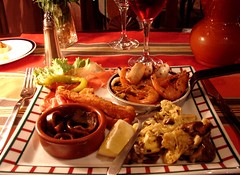
basking in Basque foods
Much to my surprise, that reputation not withstanding, I like the town. The twenty first century has changed it somewhat. The beaches here have a pounding surf and surfboards give it a California-like relaxed look. And, of course, women tanning their breasts cannot have been common in the early 1900s.
True, it is dangerous to place me in a French town with good stores, particularly as the weather isn’t especially beachy, but I tell myself firmly that I must stop after that cropped pair of pants and I hold (basically) to my resolve.
Lunch in an out of the way patio reinforces my belief that from now on, grilled chevre on a salad will be my midday routine. Okay, I’ll eliminate the rose wine, reluctantly. So long as there is no time for a nap, there can be no room for a midafternoon rose.

It is, of course, unfair to compare the southern stretch of the Atlantic to the southern stretch of the Mediterranean, but who cares about fair – I do it anyway. That cool surf sure can knock you down flat here. And I miss the winds of Languedoc. And the way one village doesn’t quite hook into the next – there are stretches of countryside in between.
Still, Biarritz is pretty and I like pretty.

But I like St Jean de Luz even more. If Biarritz has Basque allegiance, it seems rather forced. You want to say – yeah, sure, you’re as French as anything. If anything, you’re jet-setty which doesn’t quite fit with the authentic language bit and traditional Basque way of life.

Biarritz Basque pride
St. Jean de Luz is an authentic and vibrant fishing town. Most of the houses are Basque houses.

Store after store sells Basque linens – beautiful fabrics, plain white, with stripes of blue, red or green and an embroidered Basque cross. The food is Basque, the language on the streets is unrecognizable and therefore Basque, shoppers shout out adio rather than bonne journee at the end of a visit.
It’s also cheaper than Biarritz and therefore likely to pose a significant threat to my credit card, since cheaper means bargain and bargain means purchase and purchase means credit card debt. I am reasoning like an American already, I am transitioning to my home country.
I eat dinner at the same place as last night, right on Sare’s main square. It’s run by an older Basque couple and the emphasis is on country food. It’s not a fussy place and I am tres happy to be here. The proprietor knows that I like the Basque aperitif and he brings me one right away. I order a mixture of appetizers and a grilled fish and a small pitcher of rose wine. All important decisions being made, I look around.
A family to the side is speaking American English. Unusual. I listen. The preteen daughters are vegetarian. They fuss at the menu which, indeed, would make a no-meat-on-my-plate person cringe. They fuss at the vegetables as well. The waiter fixes them special plates with lettuce, baby artichokes, white asparagus and little tomatoes and it turns out they dislike every item on said plate. They want fruit plates. Dad reassures them that every good restaurant will have a fruit plate. This place does not have a fruit plate. Bummer.
Only one daughter speaks French and it is the French of bonjour and merci. It does not allow for the cider that the mother wants, nor the boudin on the menu, which has her guessing wildly and very incorrectly. I want to suggest a great little food dictionary for further travels, but they all seem to have faith in 6th grade French language instruction and so I stay silent.
Having finished the complicated matter of ordering and rejecting foods, they notice me. And they begin to talk about me – why I would be sitting alone in a restaurant, why I looked their way (perhaps my look of horror as the girls licked the rims of wine glasses to see if they would make noise was too strong), on and on. As if I weren’t there. It really did not strike them that speaking French to the staff does not preclude me from understanding English. American English especially.
So I am transitioning already. I’m on French soil but I am letting go. I am accepting an inevitable return, truly I am. I like my home. I like that quality of life, however defined, matters for so many Madisonians. But on this evening, as I get up to leave the restaurant, I do the French thing. I say bon soir to the people on the left, bon soir the people on the right, and bon soir to the family of Americans in front of me. Why mess with their bubble.

basking in Basque foods
posted by nina, 6/20/2006 05:15:00 AM
| link
| (1) comments
Monday, June 19, 2006
from Sare: natural progression
It dawned on me that I have become physically lazy lately. For, faced in the past weeks with fantastic hiking opportunities, I wasn’t taking them.
Here, in the Pyrenees, things have got to change. There are trails. There are paths. There are maps. Get moving!
Still, I don’t exactly rush the morning. Eventually I do stumble down to this:
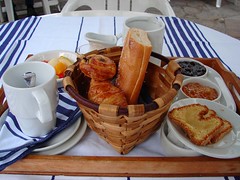
…and by the time I finish and get around to putting up a post, the village clock has done its maximum number of hour clangs.
I do want to set out right then and there, I do I do. But everyone around me is eating the big Sunday lunch. It is my last Sunday in France. How can I not partake?
Reason prevails and instead of sitting down to a big four course meal, I go to a little café-bistro type place (“taberna” says the sing) and order a salad with grilled goat cheese and pine nuts. And I vow that in commemoration of my months in France, I will, hereafter, always eat a Sunday mid afternoon meal of a salad with grilled cheese and pine nuts. With a glass of rose wine. After which I will probably do the nap things. Sorry, I’m digressing.
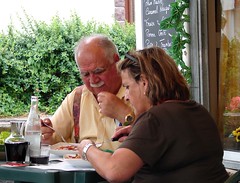
everyone eats
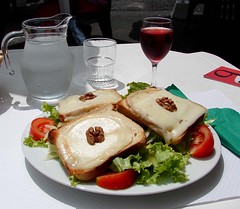
I eat
I had the presence of mind to purchase a detailed map of the area, trails and all. But for my uneducated eye, it was merely a mess of lines on a piece of paper. I had asked the pretty little desk/waitress person (emphasis on young) where I might go for a nice walk/hike in the country and she told me (in her youthful enthusiasm) that there is this ballade I should take. It sounded so lyrical! Yes, definitely, the ballade is just the thing. How long? Maybe four hours…
As I set out, I think of the essentials: food. Just in case I lose my way in the Pyrenees and have to survive on nuts and berries and whatever else I will have brought, for days.
In Sare, it is crucial that you bring home with you baguettes and a Basque cake for the Sunday meal. For any meal, actually. They sell Basque cakes everywhere: flat, cookie like cakes, sometimes laced with cherry jam.
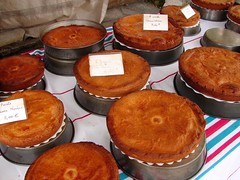
And so I, too, must have a Basque cake-let.
And now off I go. But which way? The map does not fuss with the Sare streets and I get lost even before leaving the village. Remarkable. I ask the madame at the hotel (she is closer to my age and has less of that youthful optimism): which way is the path in the direction of the grotto?
Do you intend to walk there? She looks so incredulous that I think I am perhaps in over my head. It’s only four hours, isn’t it? I ask meekly. She shrugs and points in the direction of the mountains.
As always, these paths are easy at the beginning. I hum to myself, walk briskly, think of all the calories I am burning while taking photos of children playing, as parents dine, at picnic spots and in the shades of trees by their farms and homes.
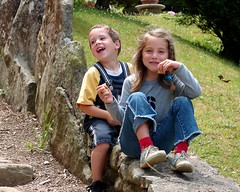
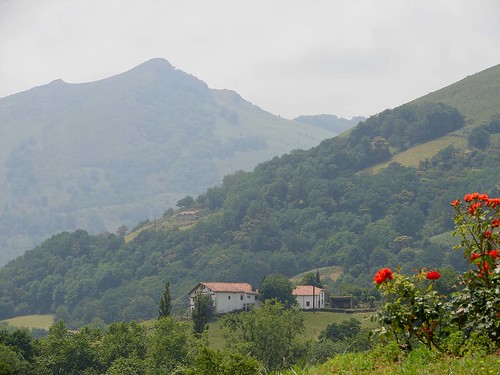
But then, quite suddenly, the path narrows. And obstacle number one appears.
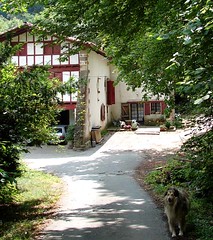
Can you identify the problem? I’ll help: a few steps back, there was a road sign that read: Watch out for the dog. I had noted it, thinking: wow, that must be some special dog, deserving of its own road sign.
And now I know that if there is anything special about this dog it is his viciousness. The animal is growling and barking so fiercely that I stop completely and consider my options. I take a lame step forward (the path passes close to the house), the dog tightens his circle around me and growls louder.
And so I shout toward the house: excuse me! hey you there! The dog is barking, I am shouting, what’s the matter with these people?
Eventually the woman of the house comes out. Yes? Are you looking for the path? It goes behind the house.
But the dog! She shrugs her shoulders and says – he’s nothing.
And so now I understand: the road sign is there to protect not me, but the dog: "slow down, dogs playing." I walk past, the dog whimpers and goes away.
The path is, for the most part, well marked. Where there is a fork, a blue arrow points in the direction you want to go. I concentrate on the scenery, which is stunning.
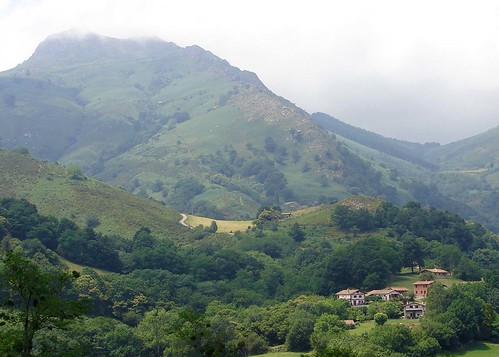
But it is hard going. Elevations change, so there is a lot of up and down. And there are the usual stones and muddy spots. Unlike in the Languedoc, where the wind moves the air around constantly, the air here is still. The sun comes in and out from behind a hazy sky. Flies buzz. I am the only hiker. I encounter exactly one living soul and it is her:
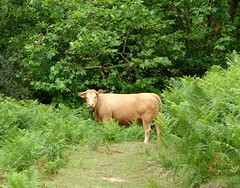
She crosses from one fern field to the next and throws me a “what are you doing here” glance. After the dog encounter, I am bolder and throw her one right back: “I’m hiking, so move out of my way.” She does.
[Ocean warning: readers who are sensitive to blood and gore should maybe just skim the next several paragraphs]
Eventually, the path shoots down to a creek and bends in a wide arch around pastureland. I am in good spirit. I’ve had no mishaps but for a mud splash (I had been so preoccupied with a photo op that I missed the entire mess in front and thus went in ankle deep; a stream helped fix that one).
But now, right in my path, I see a bone. Rather large. Too big for a picnic discard. And there are many many flies. And feathers everywhere. As the path bends once more, I see right before me a dead horse. Or, rather, three fourths of one, fine mane, still glossy brown hide, but parts missing entirely, having obviously provided much nourishment to vultures and such.
No, I did not take a photo. It seemed disrespectful. And no, I did not faint or vomit, even after observing … well, the details of the dismemberment. I walked briskly past, making as big a loop around the poor thing as I could.
And only after I was well past it did I began to wonder: why is there a dead horse here? Why did he die? What (nearby?) beast attacked him to begin with? What the hell happened there? And: hadn’t anyone passing along this path noticed? Don’t they, like, remove road kill on signed paths?
And it is at that point that it strikes me that I had seen no blue arrows lately. I walk further. It is so still there between the ferns and forest. Bird noises, flies buzzing. Nothing more. Possibly, somewhere lurking, the beast that killed the horse.
Ten minutes more and I realize that I am lost. I have to go back, past the horse, that same dead horse that obviously was not on the path because this was not the path, this was some road leading who knows where.
I wish I could say it was, after that, downhill all the way, that I sped like lightening and got to the grotto in no time.
In fact, it suddenly turned uphill all the way. And after three hours of hiking it also became clear that this trail was not a four hour loop but a four hour final destination designation and the destination was not the grotto, but the summit.
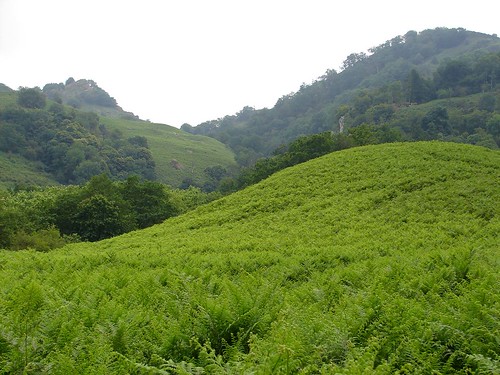
toward the top: where the wild ferns grow
In the middle of all these ferns, I came across a hut that acted as a shelter. A couple of French hikers were sitting enjoying a wine break (really). I asked about the location of the grotto and was told that I had passed it some 500 meters below.
I loop back, find the grotto, stare with amazement at this apparently ancient burial spot and place where cave people frolicked…
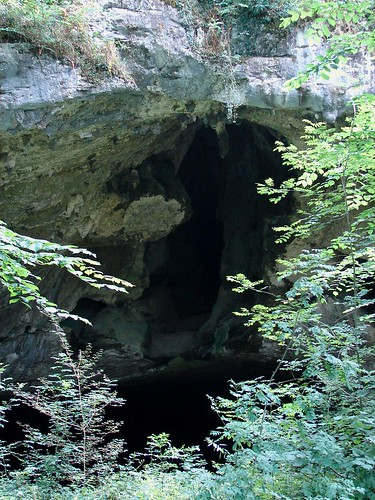
…and start thinking about heading back. And this is where I completely show my hiking weakness: I hate retracing my steps over difficult terrain. If you don’t know what’s coming, you can pretty much hike through anything and either you die or you survive and blog about it. But reliving the experience? No. I opt for the paved road for a more relaxed 10 km jaunt back to the village, sidetracking just toward the end, to get some more of that Basque countryside, farm animals and all.
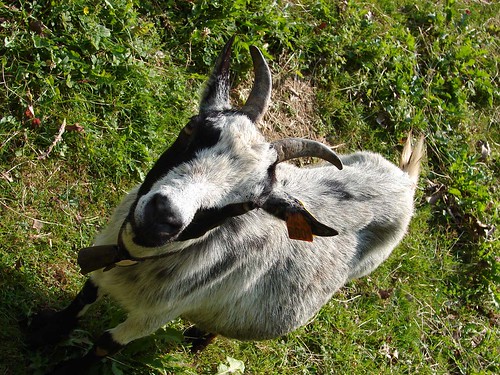
regarding each other
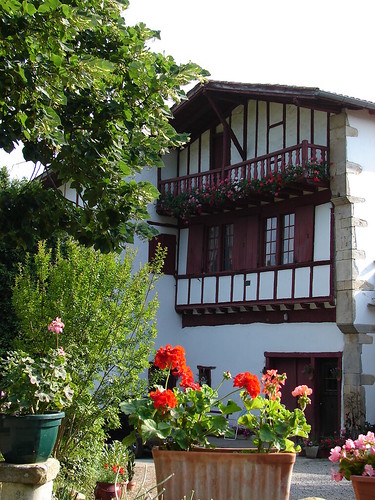
they all look basically like this
BTW, is there anything wrong with feeding a little piece of Basque cake-let to these guys? They came right over when I paused for a photo and I neglected to carry with me a carrot or a lump of sugar. They appeared surprised, as if they had never tasted it before. They sloshed it in their drippy lips for a long time and then nudged around my bag for more. They’re not allergic to cherry jam, are they?
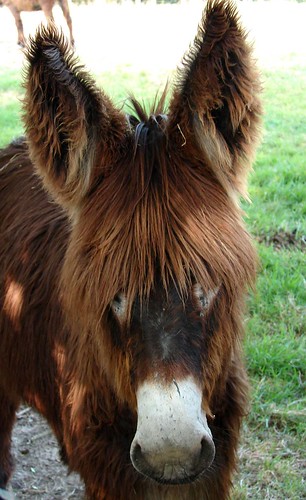
is there more?
Dinner is at an outdoor spot on the square. It is lively and brisk and absolutely delicious. Did I, the evening before, have trepidations about some of the foods in this region? All gone. I love it all.
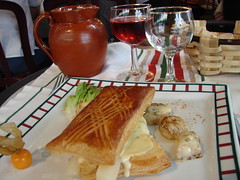
white asparagus, scallops
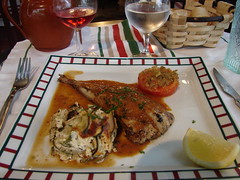
fish, zucchini with egg
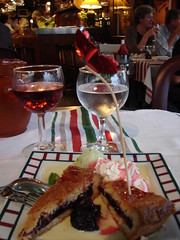
Basque cakes
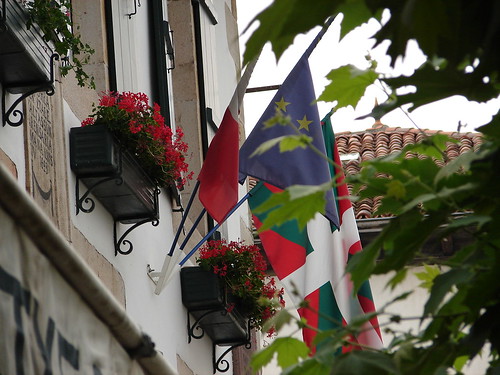
looking up: a furled up France, a partly unfurled Union, in full glory: Pays Basque
Here, in the Pyrenees, things have got to change. There are trails. There are paths. There are maps. Get moving!
Still, I don’t exactly rush the morning. Eventually I do stumble down to this:

…and by the time I finish and get around to putting up a post, the village clock has done its maximum number of hour clangs.
I do want to set out right then and there, I do I do. But everyone around me is eating the big Sunday lunch. It is my last Sunday in France. How can I not partake?
Reason prevails and instead of sitting down to a big four course meal, I go to a little café-bistro type place (“taberna” says the sing) and order a salad with grilled goat cheese and pine nuts. And I vow that in commemoration of my months in France, I will, hereafter, always eat a Sunday mid afternoon meal of a salad with grilled cheese and pine nuts. With a glass of rose wine. After which I will probably do the nap things. Sorry, I’m digressing.

everyone eats

I eat
I had the presence of mind to purchase a detailed map of the area, trails and all. But for my uneducated eye, it was merely a mess of lines on a piece of paper. I had asked the pretty little desk/waitress person (emphasis on young) where I might go for a nice walk/hike in the country and she told me (in her youthful enthusiasm) that there is this ballade I should take. It sounded so lyrical! Yes, definitely, the ballade is just the thing. How long? Maybe four hours…
As I set out, I think of the essentials: food. Just in case I lose my way in the Pyrenees and have to survive on nuts and berries and whatever else I will have brought, for days.
In Sare, it is crucial that you bring home with you baguettes and a Basque cake for the Sunday meal. For any meal, actually. They sell Basque cakes everywhere: flat, cookie like cakes, sometimes laced with cherry jam.

And so I, too, must have a Basque cake-let.
And now off I go. But which way? The map does not fuss with the Sare streets and I get lost even before leaving the village. Remarkable. I ask the madame at the hotel (she is closer to my age and has less of that youthful optimism): which way is the path in the direction of the grotto?
Do you intend to walk there? She looks so incredulous that I think I am perhaps in over my head. It’s only four hours, isn’t it? I ask meekly. She shrugs and points in the direction of the mountains.
As always, these paths are easy at the beginning. I hum to myself, walk briskly, think of all the calories I am burning while taking photos of children playing, as parents dine, at picnic spots and in the shades of trees by their farms and homes.


But then, quite suddenly, the path narrows. And obstacle number one appears.

Can you identify the problem? I’ll help: a few steps back, there was a road sign that read: Watch out for the dog. I had noted it, thinking: wow, that must be some special dog, deserving of its own road sign.
And now I know that if there is anything special about this dog it is his viciousness. The animal is growling and barking so fiercely that I stop completely and consider my options. I take a lame step forward (the path passes close to the house), the dog tightens his circle around me and growls louder.
And so I shout toward the house: excuse me! hey you there! The dog is barking, I am shouting, what’s the matter with these people?
Eventually the woman of the house comes out. Yes? Are you looking for the path? It goes behind the house.
But the dog! She shrugs her shoulders and says – he’s nothing.
And so now I understand: the road sign is there to protect not me, but the dog: "slow down, dogs playing." I walk past, the dog whimpers and goes away.
The path is, for the most part, well marked. Where there is a fork, a blue arrow points in the direction you want to go. I concentrate on the scenery, which is stunning.

But it is hard going. Elevations change, so there is a lot of up and down. And there are the usual stones and muddy spots. Unlike in the Languedoc, where the wind moves the air around constantly, the air here is still. The sun comes in and out from behind a hazy sky. Flies buzz. I am the only hiker. I encounter exactly one living soul and it is her:

She crosses from one fern field to the next and throws me a “what are you doing here” glance. After the dog encounter, I am bolder and throw her one right back: “I’m hiking, so move out of my way.” She does.
[Ocean warning: readers who are sensitive to blood and gore should maybe just skim the next several paragraphs]
Eventually, the path shoots down to a creek and bends in a wide arch around pastureland. I am in good spirit. I’ve had no mishaps but for a mud splash (I had been so preoccupied with a photo op that I missed the entire mess in front and thus went in ankle deep; a stream helped fix that one).
But now, right in my path, I see a bone. Rather large. Too big for a picnic discard. And there are many many flies. And feathers everywhere. As the path bends once more, I see right before me a dead horse. Or, rather, three fourths of one, fine mane, still glossy brown hide, but parts missing entirely, having obviously provided much nourishment to vultures and such.
No, I did not take a photo. It seemed disrespectful. And no, I did not faint or vomit, even after observing … well, the details of the dismemberment. I walked briskly past, making as big a loop around the poor thing as I could.
And only after I was well past it did I began to wonder: why is there a dead horse here? Why did he die? What (nearby?) beast attacked him to begin with? What the hell happened there? And: hadn’t anyone passing along this path noticed? Don’t they, like, remove road kill on signed paths?
And it is at that point that it strikes me that I had seen no blue arrows lately. I walk further. It is so still there between the ferns and forest. Bird noises, flies buzzing. Nothing more. Possibly, somewhere lurking, the beast that killed the horse.
Ten minutes more and I realize that I am lost. I have to go back, past the horse, that same dead horse that obviously was not on the path because this was not the path, this was some road leading who knows where.
I wish I could say it was, after that, downhill all the way, that I sped like lightening and got to the grotto in no time.
In fact, it suddenly turned uphill all the way. And after three hours of hiking it also became clear that this trail was not a four hour loop but a four hour final destination designation and the destination was not the grotto, but the summit.

toward the top: where the wild ferns grow
In the middle of all these ferns, I came across a hut that acted as a shelter. A couple of French hikers were sitting enjoying a wine break (really). I asked about the location of the grotto and was told that I had passed it some 500 meters below.
I loop back, find the grotto, stare with amazement at this apparently ancient burial spot and place where cave people frolicked…

…and start thinking about heading back. And this is where I completely show my hiking weakness: I hate retracing my steps over difficult terrain. If you don’t know what’s coming, you can pretty much hike through anything and either you die or you survive and blog about it. But reliving the experience? No. I opt for the paved road for a more relaxed 10 km jaunt back to the village, sidetracking just toward the end, to get some more of that Basque countryside, farm animals and all.

regarding each other

they all look basically like this
BTW, is there anything wrong with feeding a little piece of Basque cake-let to these guys? They came right over when I paused for a photo and I neglected to carry with me a carrot or a lump of sugar. They appeared surprised, as if they had never tasted it before. They sloshed it in their drippy lips for a long time and then nudged around my bag for more. They’re not allergic to cherry jam, are they?

is there more?
Dinner is at an outdoor spot on the square. It is lively and brisk and absolutely delicious. Did I, the evening before, have trepidations about some of the foods in this region? All gone. I love it all.

white asparagus, scallops

fish, zucchini with egg

Basque cakes

looking up: a furled up France, a partly unfurled Union, in full glory: Pays Basque
posted by nina, 6/19/2006 04:00:00 AM
| link
| (2) comments
Sunday, June 18, 2006
from Sare: what’s in a song?
It is late afternoon when I finally pull into the village square. Chaos!
Inflated slides, a bull ride, tents with food and drink.
Oh, it’s just today, madame, it’s the school fete.
My hotel sits right on the small village square. I love children, but the inflatable slides are, well, not village-like and so I breathe a sigh of relief.
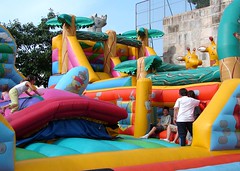
slides
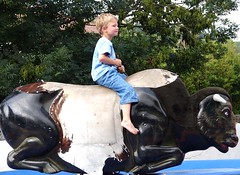
bulls
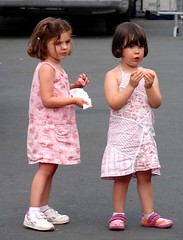
girls watching
As would be expected, the school fete is that by name only. The focus isn’t only on kids. It is tres important that the adults get something out of it as well. Kids play, everyone eats and drinks. Good deal.
I look at the food. I am no longer in the Languedoc. I buy a plateful…
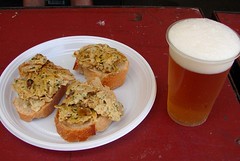
Spicy eggs with fish, beer. I am in Pays Basque.
In the lobby of my small inn, I have, for the first time during my entire French travels, WiFi. Here, in the mountain village of Sare, 3 kilometers from the Spanish border, I can finally cut my blogging time by a half.
Sare has a designation – I can’t remember, it’s flowers or prettiness or some such award. As a result, it does have souvenirs and a handful of tourists passing through. But tonight, the locals have reclaimed their own. They dominate the square.
But it is not a private party.
I am sitting in the lobby, posting at a mile a minute and I hear it: boom, boom boom (in the oompah oompah sense)! I look up at monsieur le proprietair.
They are playing our music. They’re dancing too. You should go watch, it’s very nice.
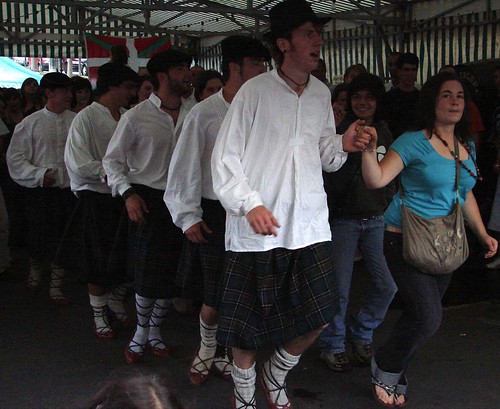
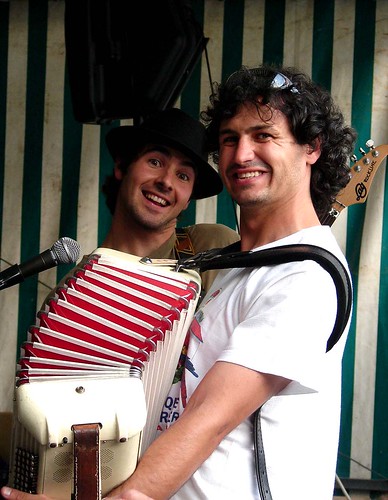
I am reminded of scenes from movies, in your face scenes, where directors want to let you know, through music, the political allegiance of a class of people (Cabaret, for example). Here, in Sare, it is not some traditional costume thing, where older men and women remind themselves of how it was when. This has the energy and participation of the young.
Sometimes the very young.
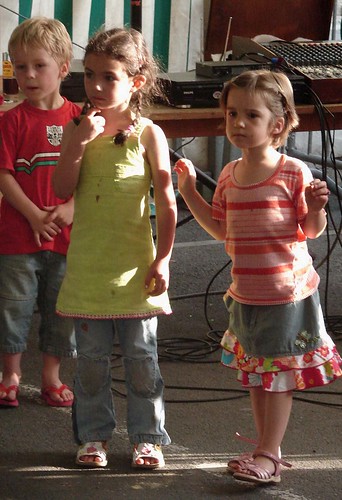
watching, imitating
In case I hadn’t noticed that signs, menus, everything appears in the Basque language, in case I hadn’t seen the Basque flag hanging over the food tent, in case I missed the little note at the bottom of the Inn’s menu (Exte huntako Nagusiak: Esukal Herrian Sortuak -- with the translation, in French: the proprietors of this house were born and raises in the Basque Country), it is as clear as anything to me now that I am not entirely in France. The Pays Basque. And they are proud of it.
For dinner, I plunge, perhaps too forcefully. I am okay at the level of artichokes, cepes and Basque ham...
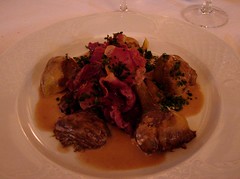
...but I falter at the second course. I asked for a typical Basque dish, I got it. And though I always say that I will eat anything so long as it is fresh and honest, tonight I have to modify that: sometimes, in small doses only. I cannot finish it. It is delicious, it is finely done, but I can eat at best half. I am a failure. I am, as plain as anything, a stranger in this land, someone who cannot finish her mound of shrimp and sweetbreads.
I wake up on and off, listening to the singing out on the square. I remember the spray paint on the cliff outside the village: the Basque problem: solutions through negotiation! In the mean time, they sing and dance.
[In the morning, I hear a conversation at the table next to mine. The mother asks the daughters: qu'est ce qu'on dit a papa? -- what does one say to dad? They look puzzled for a minute and then the bulb goes off: Ah! Bonne fete, papa! To all dads out there, but especially to one remarkable dad who gives his life and soul to his daughters -- bonne fete, papa!]
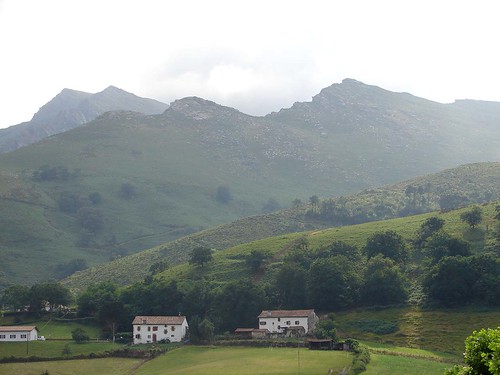
around the village, mountains
Inflated slides, a bull ride, tents with food and drink.
Oh, it’s just today, madame, it’s the school fete.
My hotel sits right on the small village square. I love children, but the inflatable slides are, well, not village-like and so I breathe a sigh of relief.

slides

bulls

girls watching
As would be expected, the school fete is that by name only. The focus isn’t only on kids. It is tres important that the adults get something out of it as well. Kids play, everyone eats and drinks. Good deal.
I look at the food. I am no longer in the Languedoc. I buy a plateful…

Spicy eggs with fish, beer. I am in Pays Basque.
In the lobby of my small inn, I have, for the first time during my entire French travels, WiFi. Here, in the mountain village of Sare, 3 kilometers from the Spanish border, I can finally cut my blogging time by a half.
Sare has a designation – I can’t remember, it’s flowers or prettiness or some such award. As a result, it does have souvenirs and a handful of tourists passing through. But tonight, the locals have reclaimed their own. They dominate the square.
But it is not a private party.
I am sitting in the lobby, posting at a mile a minute and I hear it: boom, boom boom (in the oompah oompah sense)! I look up at monsieur le proprietair.
They are playing our music. They’re dancing too. You should go watch, it’s very nice.


I am reminded of scenes from movies, in your face scenes, where directors want to let you know, through music, the political allegiance of a class of people (Cabaret, for example). Here, in Sare, it is not some traditional costume thing, where older men and women remind themselves of how it was when. This has the energy and participation of the young.
Sometimes the very young.

watching, imitating
In case I hadn’t noticed that signs, menus, everything appears in the Basque language, in case I hadn’t seen the Basque flag hanging over the food tent, in case I missed the little note at the bottom of the Inn’s menu (Exte huntako Nagusiak: Esukal Herrian Sortuak -- with the translation, in French: the proprietors of this house were born and raises in the Basque Country), it is as clear as anything to me now that I am not entirely in France. The Pays Basque. And they are proud of it.
For dinner, I plunge, perhaps too forcefully. I am okay at the level of artichokes, cepes and Basque ham...

...but I falter at the second course. I asked for a typical Basque dish, I got it. And though I always say that I will eat anything so long as it is fresh and honest, tonight I have to modify that: sometimes, in small doses only. I cannot finish it. It is delicious, it is finely done, but I can eat at best half. I am a failure. I am, as plain as anything, a stranger in this land, someone who cannot finish her mound of shrimp and sweetbreads.
I wake up on and off, listening to the singing out on the square. I remember the spray paint on the cliff outside the village: the Basque problem: solutions through negotiation! In the mean time, they sing and dance.
[In the morning, I hear a conversation at the table next to mine. The mother asks the daughters: qu'est ce qu'on dit a papa? -- what does one say to dad? They look puzzled for a minute and then the bulb goes off: Ah! Bonne fete, papa! To all dads out there, but especially to one remarkable dad who gives his life and soul to his daughters -- bonne fete, papa!]

around the village, mountains
posted by nina, 6/18/2006 04:55:00 AM
| link
| (1) comments
Saturday, June 17, 2006
from Pierrerue: ode to rocky road
But I haven’t seen all of it!
Saint Chinian, my patron town, my place of the great market and fine wines, I’ve neglected you for starred villages, warms sands and rogue cowboys.
I go back to you on this, my last day in the Languedoc. I walk, for the first time, in your back alleys and directionless streets.
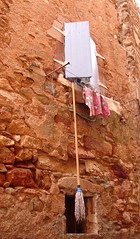
filled window drying line
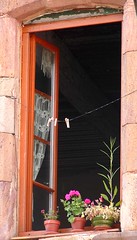
empty window drying line
I’m comparing bakeries today – I had neglected them all and taken the easy route of buying from the bread lady, selling from her truck almost every morning at Pierrerue. First bakery – no, your sweet rolls look too sweet. I want something lighter for lunch on the train tomorrow. Second one: no, not you either. Your croissants look good though… next time, next time. Third one: oh, perfect! You have pine nut tarts. Wonderful! I look up, straight into the eyes of the bread lady.
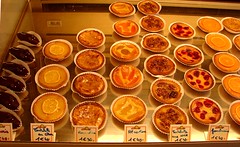
she bakes tarts too
You have a bakery in town? I’m so stupid (stupide), I did not know that!
You have not been here very long, that’s all.
Three weeks, but it seems shorter…
What would it be like to live here, or at least to come for long periods at a time? I visit an immobilier (real estate guy). Excuse me, I don’t really have any money, but I just wanted to know, how much would a small house cost?
You’re staying at the corner house I sold to the British lady… The houses are not that much. People are poor here, they need money, they have so little of it.
Two little girls run in, ahead of their mother. Beautiful children, coming to kiss papa. But they retreat when they see that he is with a client.
Except, I am not a client. I am wistful, curious, in love.
I left my heart in Pierrerue. Wedged into the crevice of this RockyRoad.
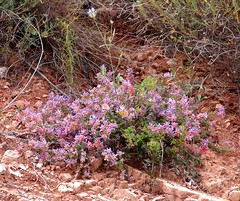
Looking out over the hills, for the hills are the visual masterpiece. Pierrerue opens up to an amphitheater of vines and forests.
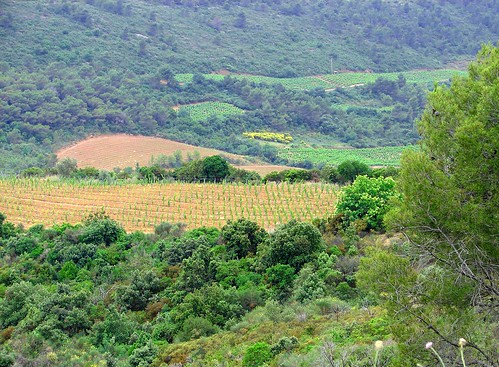
In the evening, my artist neighbors have invited me over for a drink. She comes knocking at 7.
Have you forgotten? I think to myself, maybe Nina has forgotten to come.
No, no! It is the most important thing that I do on this day!
She has parted with two of her paintings. I am taking them back to the loft – I am robbing her of her Fauve rendition of Roquebrun and her Impressionistic take on the bridge and the Chat qui Peche.
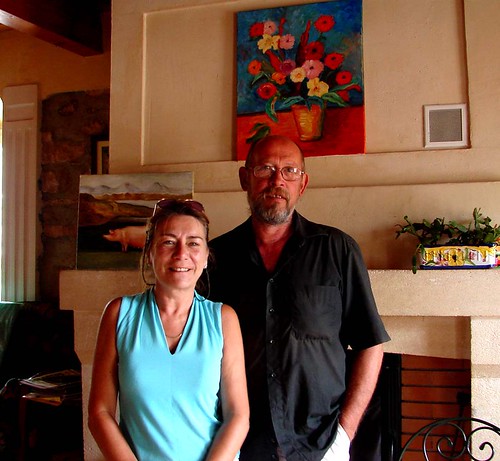
artist neighbors
And now, for the first time in the three weeks that I have been here, the sky is cloudy and small drops of rain fall. A warm rain, a kind rain.
We can sit outside on the patio. There is no wind, the umbrella will protect us.
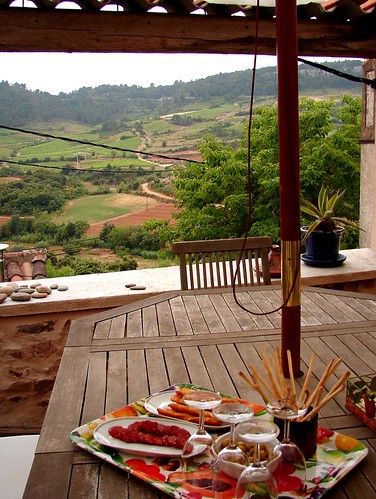
I tell them about my visit to the immobilier and how much lower I find prices here than in the rest of France.
When we moved here from the north eight years ago, they were one third what they are now. People like us, people like you drive the prices up. Everything has become so much more expensive! The melons now, the cherries – I go to the market and I cannot believe the prices.
Me too, I cannot believe how much lower they are here. And how much sweeter the melons and berries are.
He tells me: when we were visiting relatives in California, they had a market eight kilometers away and so I would walk to it. One day, a policeman stopped me and asked me why I was out on the road. That crazy Frenchman, he must have thought. He walks to the market!
In America, it’s so different. Everything is separated: you work in one place, you shop in another, you live in another. And you move between the three by car.
Yes, I know it well. It’s called the suburban lifestyle. It is a privileged existence and people aspire to it.
Here, the locals, they are having such a tough time of it. There is no industry. Wines and agriculture, that’s all. They complain here that the foreigners are buying up their houses and I tell them look, you just put a for sale sign in front of your own door! And you price it so that no Languedoc family could afford it.
She tells me: the most beautiful house of the region, is in a village next to Pierrerue. It’s owned by an American, a woman from Florida. Each time I drive by it I pause to admire it! Such gorgeous detail! I do not know the owner. She does not mix with the locals.
You know, my friend is selling his house. It is small, but it is perfect and it has a terrace with a view, just like this. I think you should buy it! It’s easy to buy houses here!
But I don’t own property. I wont ever own property. I don’t even own a car. Just a bike and a few pieces of art. And a frequent flyer card with miles accumulating at the speed of a bull market.
It is time to go.
Oh, must you? You are such a good neighbor!
Sigh, I am not your neighbor. My neighbors are people I do not know back home. They never ask about my days like you do. They have not opened a bottle of rose wine for me, nor I for them.
I drive to Berlou for a final dinner at Le Faitout. The rain comes and goes. A new fragrance for me, that of wetness.
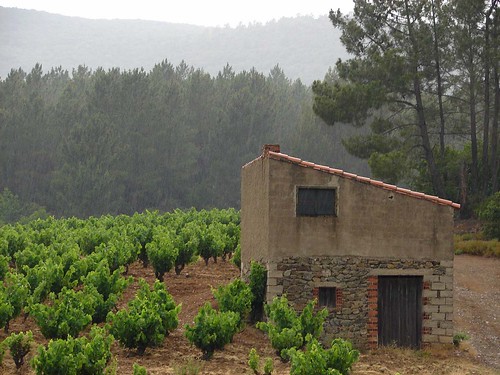
Inside, a large group of older people are eating their second course. Thunder rumbles in the hills. A white-haired woman gets up to close the window.
Just for our protection.
Are they local? I ask Madame.
Yes, they’re from Berlou.
To succeed, you must make the locals happy! It looks like they’re happy.
Yes, but we must also make the tourists happy. The locals alone cannot support us.
I let the chef, Frederic, select my dishes. Just serve me something I haven’t yet eaten here.
Delicious! They are a wonderful team. Ocean awards them top regional stars. Worth a detour. Worth a special trip.
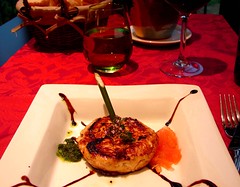
fishy
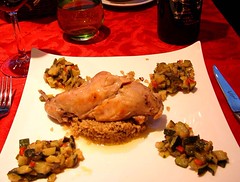
meaty
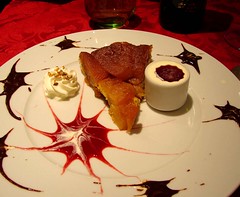
sweet
Come out, come out, chef Frederic, I need to thank you yet again.
Come into my kitchen, I’ll show you where I work.
Oh, can I take a photo?
No, no, it is not looking proper! I am just finishing up for the night.
If I were to buy a house in this region, the requirement would be that it is within fifteen minutes of your restaurant!
In the morning, I load the car: suitcase, backpack with my market straw basket, clipped to its side and my neighbor’s painting, wrapped in bubble wrap and tied with string. She is out at her door waving, shouting out bonne chance.
Saint Chinian, my patron town, my place of the great market and fine wines, I’ve neglected you for starred villages, warms sands and rogue cowboys.
I go back to you on this, my last day in the Languedoc. I walk, for the first time, in your back alleys and directionless streets.

filled window drying line

empty window drying line
I’m comparing bakeries today – I had neglected them all and taken the easy route of buying from the bread lady, selling from her truck almost every morning at Pierrerue. First bakery – no, your sweet rolls look too sweet. I want something lighter for lunch on the train tomorrow. Second one: no, not you either. Your croissants look good though… next time, next time. Third one: oh, perfect! You have pine nut tarts. Wonderful! I look up, straight into the eyes of the bread lady.

she bakes tarts too
You have a bakery in town? I’m so stupid (stupide), I did not know that!
You have not been here very long, that’s all.
Three weeks, but it seems shorter…
What would it be like to live here, or at least to come for long periods at a time? I visit an immobilier (real estate guy). Excuse me, I don’t really have any money, but I just wanted to know, how much would a small house cost?
You’re staying at the corner house I sold to the British lady… The houses are not that much. People are poor here, they need money, they have so little of it.
Two little girls run in, ahead of their mother. Beautiful children, coming to kiss papa. But they retreat when they see that he is with a client.
Except, I am not a client. I am wistful, curious, in love.
I left my heart in Pierrerue. Wedged into the crevice of this RockyRoad.

Looking out over the hills, for the hills are the visual masterpiece. Pierrerue opens up to an amphitheater of vines and forests.

In the evening, my artist neighbors have invited me over for a drink. She comes knocking at 7.
Have you forgotten? I think to myself, maybe Nina has forgotten to come.
No, no! It is the most important thing that I do on this day!
She has parted with two of her paintings. I am taking them back to the loft – I am robbing her of her Fauve rendition of Roquebrun and her Impressionistic take on the bridge and the Chat qui Peche.

artist neighbors
And now, for the first time in the three weeks that I have been here, the sky is cloudy and small drops of rain fall. A warm rain, a kind rain.
We can sit outside on the patio. There is no wind, the umbrella will protect us.

I tell them about my visit to the immobilier and how much lower I find prices here than in the rest of France.
When we moved here from the north eight years ago, they were one third what they are now. People like us, people like you drive the prices up. Everything has become so much more expensive! The melons now, the cherries – I go to the market and I cannot believe the prices.
Me too, I cannot believe how much lower they are here. And how much sweeter the melons and berries are.
He tells me: when we were visiting relatives in California, they had a market eight kilometers away and so I would walk to it. One day, a policeman stopped me and asked me why I was out on the road. That crazy Frenchman, he must have thought. He walks to the market!
In America, it’s so different. Everything is separated: you work in one place, you shop in another, you live in another. And you move between the three by car.
Yes, I know it well. It’s called the suburban lifestyle. It is a privileged existence and people aspire to it.
Here, the locals, they are having such a tough time of it. There is no industry. Wines and agriculture, that’s all. They complain here that the foreigners are buying up their houses and I tell them look, you just put a for sale sign in front of your own door! And you price it so that no Languedoc family could afford it.
She tells me: the most beautiful house of the region, is in a village next to Pierrerue. It’s owned by an American, a woman from Florida. Each time I drive by it I pause to admire it! Such gorgeous detail! I do not know the owner. She does not mix with the locals.
You know, my friend is selling his house. It is small, but it is perfect and it has a terrace with a view, just like this. I think you should buy it! It’s easy to buy houses here!
But I don’t own property. I wont ever own property. I don’t even own a car. Just a bike and a few pieces of art. And a frequent flyer card with miles accumulating at the speed of a bull market.
It is time to go.
Oh, must you? You are such a good neighbor!
Sigh, I am not your neighbor. My neighbors are people I do not know back home. They never ask about my days like you do. They have not opened a bottle of rose wine for me, nor I for them.
I drive to Berlou for a final dinner at Le Faitout. The rain comes and goes. A new fragrance for me, that of wetness.

Inside, a large group of older people are eating their second course. Thunder rumbles in the hills. A white-haired woman gets up to close the window.
Just for our protection.
Are they local? I ask Madame.
Yes, they’re from Berlou.
To succeed, you must make the locals happy! It looks like they’re happy.
Yes, but we must also make the tourists happy. The locals alone cannot support us.
I let the chef, Frederic, select my dishes. Just serve me something I haven’t yet eaten here.
Delicious! They are a wonderful team. Ocean awards them top regional stars. Worth a detour. Worth a special trip.

fishy

meaty

sweet
Come out, come out, chef Frederic, I need to thank you yet again.
Come into my kitchen, I’ll show you where I work.
Oh, can I take a photo?
No, no, it is not looking proper! I am just finishing up for the night.
If I were to buy a house in this region, the requirement would be that it is within fifteen minutes of your restaurant!
In the morning, I load the car: suitcase, backpack with my market straw basket, clipped to its side and my neighbor’s painting, wrapped in bubble wrap and tied with string. She is out at her door waving, shouting out bonne chance.
posted by nina, 6/17/2006 12:25:00 PM
| link
| (0) comments
Friday, June 16, 2006
from Pierrerue: skinny legs and wild manes
I had always wanted to see the Camargue, but it was never on the way to anything. It spills out into the Mediterranean and sort of straddles the bottom corner of Provence and the top corner of Languedoc.
It’s an odd place, not what you would necessarily regard as a good tourist destination: marshland. And lots of it. But I had heard stories of the once wild Camargue, with its birds and ponies and sort of savage looking types who fight bulls for fun.
I looked at the map and decided it was close enough. If I sped along the coast I could get there in about two hours. And I wasn’t at all discouraged by the one or two who said – wild horses and birds? You’re dreaming. More likely you’ll just see a lot of mud.
People can be such pessimists.
I had two ports of call on my list and a lot of rambling in between. I intended to briefly stop (a late lunch maybe?) at Aigues-Mortes and then head on to Les Saintes Maries de la Mer. I know you never heard of either, so just fyi, Aigues Mortes is a medieval gem, France’s first port of access to the sea and Les Saintes Maries de la Mer – I can’t quite figure that one out, even after having been there. More on this later.
Aigues Mortes did not permit me the intended half an hour pop in, pop out type of thing. Initially, the distractions were trivial. I spent, for instance, twenty minutes alone deciding which biscuits to buy here:
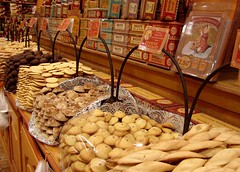
Then, having walked past numerous shops and cafes, I decided to do something a little more meaningful, like maybe scale the ramparts and see what was beyond. But it’s a long wall, and although it afforded wonderful views of the inside and the outside…
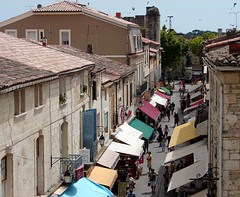
looking inside the wall
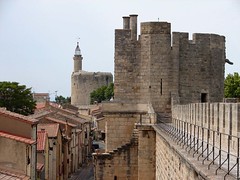
looking at the wall
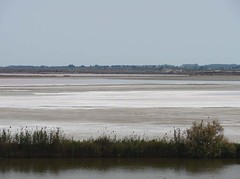
looking at the salt fields outside the wall
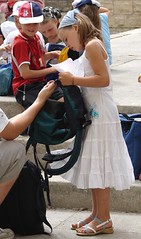
looking at a group of school children on the wall
[digression: note the girl above; must be around 9 years old; white dress with a light blue design, blue kerchief, white and blue sandals. I have not looked so coordinated and well put together for decades! They learn young.]
…I noticed that it was 4:30 by the time I finished wall-promenading. Did I say this? - It really is a long wall.
And I had not even paused for lunch yet. Up to now, I had been eating my daily lunch on my neighbor’s patio at Pierrerue, but in an effort to head out earlier than 3, I had cut that pleasant little hour out of the day. So here I am, in the middle of Aigues Mortes, hungry, in between times where any place worth its ingredients would be preparing food, with only a toe thus far set into the region of the Camargue.
This required contemplation and deliberation and so I left the busy shopping area and walked up and down the quite little side streets, hoping that great thoughts would come.
Side streets are often sprinkled with jewels, and this one was no exception. I happened across a tiny little place with two tables outside and a chalkboard with neat little descriptions of several salads and tidbits from Provence, to be sampled with an accompaniment of wine from the family winery, the Chateau de l’Isolette.
I read the chalkboard and am smitten to the core. What could be more perfect than an assiette a l’accent d’Oc, Oc, being the old Roman language spoken here centuries ago (so now you know how the region got its name: Langue –d’Oc) and the assiette, or plate, holding such magnificence as warm Camargue chevre with a salad and veggies and tapinades made with the flavors of Provence, accompanied by a glass of rose wine?
I walk in and inquire about the possibility of eating. Jean-Francois is there, welcoming, but telling me that the cook has stepped out for a while.
How long will he be gone?
It’s a she.
Oops. How long will she be gone?
Five minutes, maybe ten.
I hesitate. The clock's ticking and the Camargue is still but a dream. But, I am so set on that assiette a l’accent d’Oc. And so I sit down to wait.
Five minutes in the south of France is a range. Madame is definitely straying into the outer limits of that range, when, after half an hour, she is not back yet. But I tell myself that I just have to rearrange my images of the day somewhat. Because, in truth, I am having a wonderful time, there at the little table of the Chateau de l’Isolette. Jean-Francois gives me samples of Provence paté and talks about the individual small producers behind them. Ouside, the street is quiet. A neighbor comes out to gossip with another, a man walks by with a fresh baguette. It is a half hour of bliss.
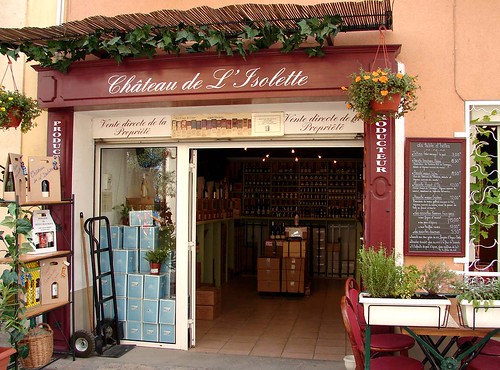
When Carole, the woman behind the food comes back, she whips up such a fine assiette, that I know that lunch and dinner have become one for me and they are here at the little Isolette.
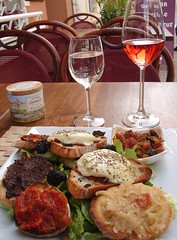
Of course, being a young and with it couple, they would notice my camera being out more than being in. And since the French world is divided into two camps: those with Internet access and those who pretend they haven’t heard of the Internet, and Jean-Francois and Carole belong to the first camp, before the ink dried on the scribbled Ocean address (they asked for it, they got it), there they were, logging on and bringing up photos of Carcassone and ice creams and children on beaches. Ocean has come to Isolette.
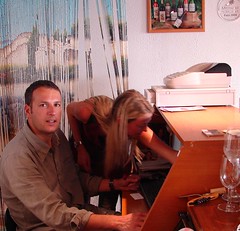
taking a look at Ocean
And I have to give credit to this most charming place with a terrific little repas: asking for food at around five in France is like asking for milk in your coffee after noon. You just cannot expect anyone will take you seriously.
So thank you, Jean-Francois and Carole, you are tops with me and anyone who goes to Aigues Mortes and neglects to walk the wall and have wine and food at your little corner of heaven will have missed out big time.
However, it was now getting to be awfully close to 6.
How far is les Saintes Maries de la Mer anyway?
Maybe fifteen, twenty minutes.
Oh, that’s nothing.
You Americans, you are used to such great distances! We traveled to California to taste your wines and everything was so far apart! Hundreds of kilometers. We measure distances in small doses.
And what did you think of the wineries in California?
They are so big (does this theme sound familiar?)! They are nice, but very different from here.
And they don’t have great rosé wines...
It’s true! Americans only ask for red or white...
Finally, at 6:30, I drive into Les Saintes Maries de la Mer.
And I drive right out. The place is a zoo! Perhaps it has worth, but I could not see it, hidden that it was behind the crowds and shops and Luna Park type attractions.
But I cannot say that the drive there was a waste. In the marshes surrounding these two towns, I got my first glimpse of these:
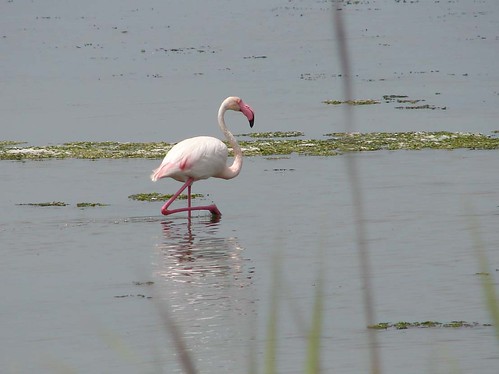
Excited as I was when I spotted the first flock of pink birds, I must say that it was small pennies to all that I saw as the evening progressed.
The Camargue is full of wildlife. And birds. (And insects, particularly at dusk.) Flamingos have made this area their stopping place and they are everywhere. If you feel you want to see them en masse, you can do as I did, drive down to the nature preserve. But you needn’t bother, for you cannot help but run into those toothpick legs and pink-tinged wings. Where there is water, there they shall be, poking around in the mud for their grub.
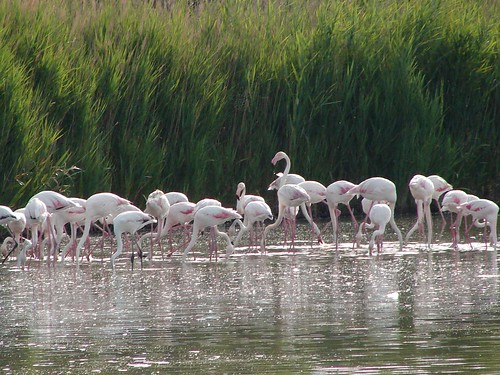
What I found was missing from my total Camargue experience were the horses. I see them everywhere, white, beautiful horses, grazing on pretty much every field you pass.
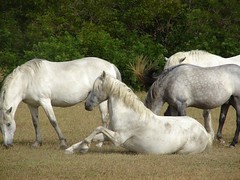
But how do you get close to them?
It is significantly past seven. I should be heading toward the highway. It’s a long trip home to Pierrerue. Instead, I pull over, randomly, on a whim, to one of the many many Camargue horse farms. It’ll have to be dinner or a horse and I choose a horse.
Can I ride a horse out into the Camargue this evening? I ask this of a guy who could not fit the image better: dark from the sun, high leather strapped boots, a few missing teeth. He studies me for a while.
Have you ever ridden before?
Well, yes, it’s been a while though.
He turns to his partner, brother, fellow cowboy, who is rinsing a tin cup in a small sink.
Ride with her.
I am given Oublie – the forgotten one.
Good horse, my riding companion says. I learn that he is a man of few words.
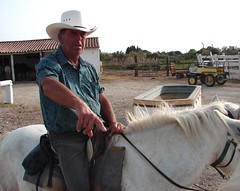
Oublie goes only two ways: too fast or too slow. He lags behind my cowboy, forcing him to wave his hand and command me to allez! Make him go already!
And so I nudge Oublie to trot forward. Oublie loves to trot. Or to lag.
Occasionally, the cowboy points with his hand to birds or animals that I may not have noticed: otters, turtles and the flocks of birds.
Ca va? He asks, after a while, to make sure Oublie and I are still on board, or, rather, that I am on board Oublie.
Ca va.
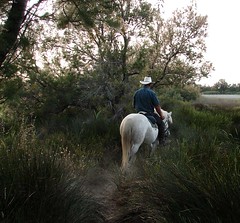
We ride in silence. I try to take photos, but believe me, working a camera and commanding the reigns on a trotting horse is only slightly less ridiculous than working a camera in a kayak going over rapids. Once, Oublie took advantage of my distraction and chose to go off on a different path. The cowboy waited, I came around.
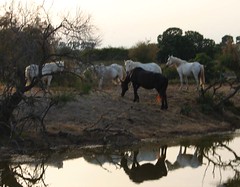
As we paused to cross the highway to head back to the farm, he turned to me and asked:
Almagne? (Germany?)
No, American.
American?
A wealth of communication, in just those four words.
I take Oublie to the water tub and ask my cowboy for a photo.
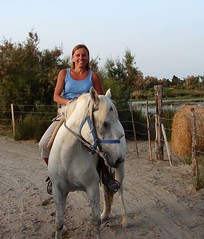
I had wanted to tip him with a five Euro note, but somewhere, when I was fiddling with my camera and the reigns, I let go of the note. It’s there, in the Camargue marshes, with the horses and the birds.
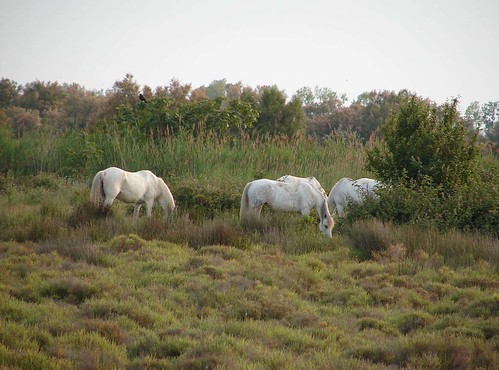
It’s an odd place, not what you would necessarily regard as a good tourist destination: marshland. And lots of it. But I had heard stories of the once wild Camargue, with its birds and ponies and sort of savage looking types who fight bulls for fun.
I looked at the map and decided it was close enough. If I sped along the coast I could get there in about two hours. And I wasn’t at all discouraged by the one or two who said – wild horses and birds? You’re dreaming. More likely you’ll just see a lot of mud.
People can be such pessimists.
I had two ports of call on my list and a lot of rambling in between. I intended to briefly stop (a late lunch maybe?) at Aigues-Mortes and then head on to Les Saintes Maries de la Mer. I know you never heard of either, so just fyi, Aigues Mortes is a medieval gem, France’s first port of access to the sea and Les Saintes Maries de la Mer – I can’t quite figure that one out, even after having been there. More on this later.
Aigues Mortes did not permit me the intended half an hour pop in, pop out type of thing. Initially, the distractions were trivial. I spent, for instance, twenty minutes alone deciding which biscuits to buy here:

Then, having walked past numerous shops and cafes, I decided to do something a little more meaningful, like maybe scale the ramparts and see what was beyond. But it’s a long wall, and although it afforded wonderful views of the inside and the outside…

looking inside the wall

looking at the wall

looking at the salt fields outside the wall

looking at a group of school children on the wall
[digression: note the girl above; must be around 9 years old; white dress with a light blue design, blue kerchief, white and blue sandals. I have not looked so coordinated and well put together for decades! They learn young.]
…I noticed that it was 4:30 by the time I finished wall-promenading. Did I say this? - It really is a long wall.
And I had not even paused for lunch yet. Up to now, I had been eating my daily lunch on my neighbor’s patio at Pierrerue, but in an effort to head out earlier than 3, I had cut that pleasant little hour out of the day. So here I am, in the middle of Aigues Mortes, hungry, in between times where any place worth its ingredients would be preparing food, with only a toe thus far set into the region of the Camargue.
This required contemplation and deliberation and so I left the busy shopping area and walked up and down the quite little side streets, hoping that great thoughts would come.
Side streets are often sprinkled with jewels, and this one was no exception. I happened across a tiny little place with two tables outside and a chalkboard with neat little descriptions of several salads and tidbits from Provence, to be sampled with an accompaniment of wine from the family winery, the Chateau de l’Isolette.
I read the chalkboard and am smitten to the core. What could be more perfect than an assiette a l’accent d’Oc, Oc, being the old Roman language spoken here centuries ago (so now you know how the region got its name: Langue –d’Oc) and the assiette, or plate, holding such magnificence as warm Camargue chevre with a salad and veggies and tapinades made with the flavors of Provence, accompanied by a glass of rose wine?
I walk in and inquire about the possibility of eating. Jean-Francois is there, welcoming, but telling me that the cook has stepped out for a while.
How long will he be gone?
It’s a she.
Oops. How long will she be gone?
Five minutes, maybe ten.
I hesitate. The clock's ticking and the Camargue is still but a dream. But, I am so set on that assiette a l’accent d’Oc. And so I sit down to wait.
Five minutes in the south of France is a range. Madame is definitely straying into the outer limits of that range, when, after half an hour, she is not back yet. But I tell myself that I just have to rearrange my images of the day somewhat. Because, in truth, I am having a wonderful time, there at the little table of the Chateau de l’Isolette. Jean-Francois gives me samples of Provence paté and talks about the individual small producers behind them. Ouside, the street is quiet. A neighbor comes out to gossip with another, a man walks by with a fresh baguette. It is a half hour of bliss.

When Carole, the woman behind the food comes back, she whips up such a fine assiette, that I know that lunch and dinner have become one for me and they are here at the little Isolette.

Of course, being a young and with it couple, they would notice my camera being out more than being in. And since the French world is divided into two camps: those with Internet access and those who pretend they haven’t heard of the Internet, and Jean-Francois and Carole belong to the first camp, before the ink dried on the scribbled Ocean address (they asked for it, they got it), there they were, logging on and bringing up photos of Carcassone and ice creams and children on beaches. Ocean has come to Isolette.

taking a look at Ocean
And I have to give credit to this most charming place with a terrific little repas: asking for food at around five in France is like asking for milk in your coffee after noon. You just cannot expect anyone will take you seriously.
So thank you, Jean-Francois and Carole, you are tops with me and anyone who goes to Aigues Mortes and neglects to walk the wall and have wine and food at your little corner of heaven will have missed out big time.
However, it was now getting to be awfully close to 6.
How far is les Saintes Maries de la Mer anyway?
Maybe fifteen, twenty minutes.
Oh, that’s nothing.
You Americans, you are used to such great distances! We traveled to California to taste your wines and everything was so far apart! Hundreds of kilometers. We measure distances in small doses.
And what did you think of the wineries in California?
They are so big (does this theme sound familiar?)! They are nice, but very different from here.
And they don’t have great rosé wines...
It’s true! Americans only ask for red or white...
Finally, at 6:30, I drive into Les Saintes Maries de la Mer.
And I drive right out. The place is a zoo! Perhaps it has worth, but I could not see it, hidden that it was behind the crowds and shops and Luna Park type attractions.
But I cannot say that the drive there was a waste. In the marshes surrounding these two towns, I got my first glimpse of these:

Excited as I was when I spotted the first flock of pink birds, I must say that it was small pennies to all that I saw as the evening progressed.
The Camargue is full of wildlife. And birds. (And insects, particularly at dusk.) Flamingos have made this area their stopping place and they are everywhere. If you feel you want to see them en masse, you can do as I did, drive down to the nature preserve. But you needn’t bother, for you cannot help but run into those toothpick legs and pink-tinged wings. Where there is water, there they shall be, poking around in the mud for their grub.

What I found was missing from my total Camargue experience were the horses. I see them everywhere, white, beautiful horses, grazing on pretty much every field you pass.

But how do you get close to them?
It is significantly past seven. I should be heading toward the highway. It’s a long trip home to Pierrerue. Instead, I pull over, randomly, on a whim, to one of the many many Camargue horse farms. It’ll have to be dinner or a horse and I choose a horse.
Can I ride a horse out into the Camargue this evening? I ask this of a guy who could not fit the image better: dark from the sun, high leather strapped boots, a few missing teeth. He studies me for a while.
Have you ever ridden before?
Well, yes, it’s been a while though.
He turns to his partner, brother, fellow cowboy, who is rinsing a tin cup in a small sink.
Ride with her.
I am given Oublie – the forgotten one.
Good horse, my riding companion says. I learn that he is a man of few words.

Oublie goes only two ways: too fast or too slow. He lags behind my cowboy, forcing him to wave his hand and command me to allez! Make him go already!
And so I nudge Oublie to trot forward. Oublie loves to trot. Or to lag.
Occasionally, the cowboy points with his hand to birds or animals that I may not have noticed: otters, turtles and the flocks of birds.
Ca va? He asks, after a while, to make sure Oublie and I are still on board, or, rather, that I am on board Oublie.
Ca va.

We ride in silence. I try to take photos, but believe me, working a camera and commanding the reigns on a trotting horse is only slightly less ridiculous than working a camera in a kayak going over rapids. Once, Oublie took advantage of my distraction and chose to go off on a different path. The cowboy waited, I came around.

As we paused to cross the highway to head back to the farm, he turned to me and asked:
Almagne? (Germany?)
No, American.
American?
A wealth of communication, in just those four words.
I take Oublie to the water tub and ask my cowboy for a photo.

I had wanted to tip him with a five Euro note, but somewhere, when I was fiddling with my camera and the reigns, I let go of the note. It’s there, in the Camargue marshes, with the horses and the birds.

posted by nina, 6/16/2006 08:05:00 AM
| link
| (5) comments
Thursday, June 15, 2006
from Pierrerue: longing for the smell of ewe
If I am going to set destinations that are hours away from Pierrerue, I should not leave Pierrerue after 3:30.
But the sun doesn’t set until ten and if I can pick up a highway, I can get to the northern-most edges of Languedoc in a flash.
Truly, the new superhighways that have recently linked cities in this part of the country are remarkable.
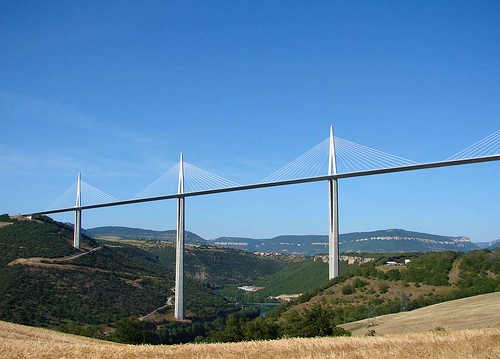
near Millau (my destination point for the day)
Once close to where I want to be, I defer to the country lanes, often so narrow, that second gear seems too fast.
But the reason for going further afield at such late hours is, well, stubbornness. It's not that I care deeply about getting to Millau. The books like it, but I happen to think it’s not worth a detour, let alone a destination. Big-ish city, nice enough in a ho hum, seen one seen ‘em all sort of way. But if you follow a narrow road some twenty kilometers to the side of it, you enter this little town:
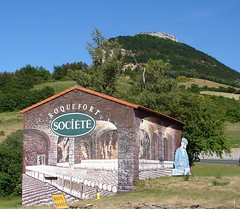
painted house, at the entrance to it
I not only like Roquefort cheese, I once taught a class at l'Etoile on French cheeses and the story of Roquefort filled a good one-fourth of class time, so I owe it a big thank you.
It’s a great story of a long dedication to quality in food and drink. You would think that name protection (Roquefort, Champagne, they all have it) is a modern concept, but no! Roquefort first came to be protected, both in name and cheese, back in 1411. [So when you ask -- why are the French so fussy about their foods, the answer I think has to be that it's in their make-up – they can’t help it, they’ve been fussing for centuries.]
Of course, by the time I actually got to Roquefort, there was no way I could do a big inspection of the caves. I made do with a little inspection and a lot of cheese sampling. Predictably, the caves are cool, humid and apparently perfect for the penicillum roqueforti to do its blue magic. The smell of ewe’s milk ripening into cheese is everywhere. You have to wonder if, living here, your nose shuts down in protest.
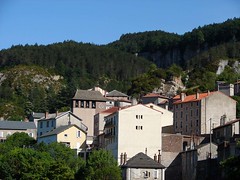
houses with caves
And as I am on the subject of protest, outside the village, I saw signs of another type of protest – on boards posted along the road, and even harvested into a design on fields, the words “pas d’OGM dans ma commune” (standing for Organisme Génétiquement Modifié). We have GMO-free shelves of milk in some stores. Here, they have OGM-free farming regions. A quick look at this website shows how widespread the movement is in France.
I toyed with the idea of heading back to Pierrerue when I noticed that even food stores were closing by the time I reached the city of Millau. Food stores are the last to shut down. The typical bakery bakes up a fresh hot batch of baguettes in time for the evening meal and stays open until 7:30 so that every last French person can pick up one or two on the way home (after a pause at a café, of course; they will have stopped working long before that).
But there I was, so close to the land of gorges – some of the most beautiful in Europe, I hear. Was I to turn my back on them? Of course not. It’s eerie, in a beautiful sort of way, to drive along in the shadows of the receding sun, down through ravines, past cliffs above and gushing waters below.
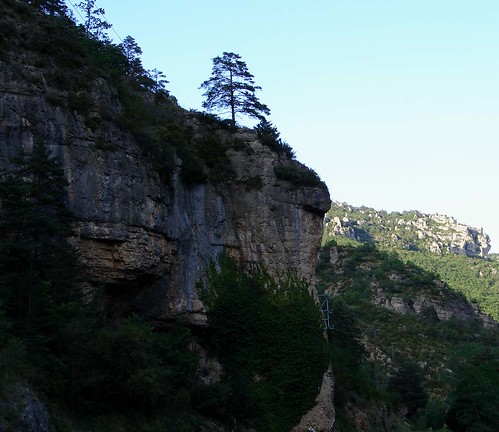
looking up
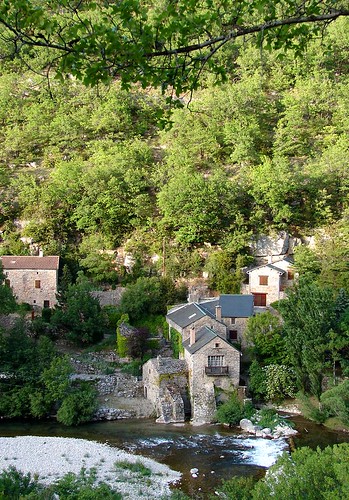
looking down
I have a newfound healthy respect for those rushing streams and kayaks that attempt to navigate them. At this hour though, I pass only an occasional fisherman. The narrow roads are (thankfully) empty. I do have a goal. I read somewhere that one of the most interesting villages in France (there we go again, the most) is around here. Cantobre, built right into the edge of one of the cliffs.
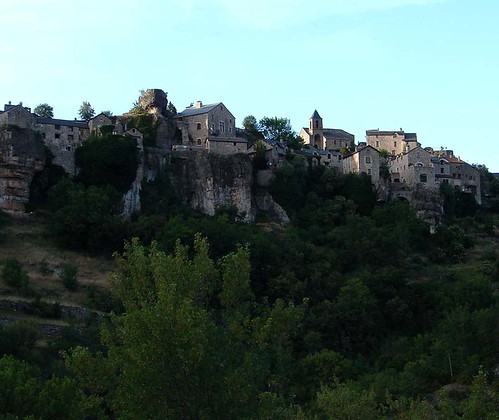
It’s a small place and I can’t think why anyone would have built it up there to begin with, but I’m fascinated by it, especially now that it stands in the shadows of dusk. It calls for a pause. I had forgotten to eat lunch, forgotten to make plans for dinner, but no matter, there is a café up there in the rocky cliff and I am able to revive myself with this:
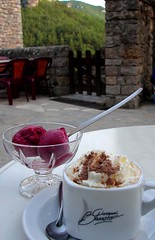
It's not quite midnight when I finally drive up the hill to Pierrerue, but awfully close to it. Dinner? Well, there are the tomatoes, and this, picked up in the land of the Roquefort.
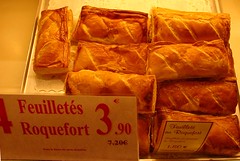
But the sun doesn’t set until ten and if I can pick up a highway, I can get to the northern-most edges of Languedoc in a flash.
Truly, the new superhighways that have recently linked cities in this part of the country are remarkable.

near Millau (my destination point for the day)
Once close to where I want to be, I defer to the country lanes, often so narrow, that second gear seems too fast.
But the reason for going further afield at such late hours is, well, stubbornness. It's not that I care deeply about getting to Millau. The books like it, but I happen to think it’s not worth a detour, let alone a destination. Big-ish city, nice enough in a ho hum, seen one seen ‘em all sort of way. But if you follow a narrow road some twenty kilometers to the side of it, you enter this little town:

painted house, at the entrance to it
I not only like Roquefort cheese, I once taught a class at l'Etoile on French cheeses and the story of Roquefort filled a good one-fourth of class time, so I owe it a big thank you.
It’s a great story of a long dedication to quality in food and drink. You would think that name protection (Roquefort, Champagne, they all have it) is a modern concept, but no! Roquefort first came to be protected, both in name and cheese, back in 1411. [So when you ask -- why are the French so fussy about their foods, the answer I think has to be that it's in their make-up – they can’t help it, they’ve been fussing for centuries.]
Of course, by the time I actually got to Roquefort, there was no way I could do a big inspection of the caves. I made do with a little inspection and a lot of cheese sampling. Predictably, the caves are cool, humid and apparently perfect for the penicillum roqueforti to do its blue magic. The smell of ewe’s milk ripening into cheese is everywhere. You have to wonder if, living here, your nose shuts down in protest.

houses with caves
And as I am on the subject of protest, outside the village, I saw signs of another type of protest – on boards posted along the road, and even harvested into a design on fields, the words “pas d’OGM dans ma commune” (standing for Organisme Génétiquement Modifié). We have GMO-free shelves of milk in some stores. Here, they have OGM-free farming regions. A quick look at this website shows how widespread the movement is in France.
I toyed with the idea of heading back to Pierrerue when I noticed that even food stores were closing by the time I reached the city of Millau. Food stores are the last to shut down. The typical bakery bakes up a fresh hot batch of baguettes in time for the evening meal and stays open until 7:30 so that every last French person can pick up one or two on the way home (after a pause at a café, of course; they will have stopped working long before that).
But there I was, so close to the land of gorges – some of the most beautiful in Europe, I hear. Was I to turn my back on them? Of course not. It’s eerie, in a beautiful sort of way, to drive along in the shadows of the receding sun, down through ravines, past cliffs above and gushing waters below.

looking up

looking down
I have a newfound healthy respect for those rushing streams and kayaks that attempt to navigate them. At this hour though, I pass only an occasional fisherman. The narrow roads are (thankfully) empty. I do have a goal. I read somewhere that one of the most interesting villages in France (there we go again, the most) is around here. Cantobre, built right into the edge of one of the cliffs.

It’s a small place and I can’t think why anyone would have built it up there to begin with, but I’m fascinated by it, especially now that it stands in the shadows of dusk. It calls for a pause. I had forgotten to eat lunch, forgotten to make plans for dinner, but no matter, there is a café up there in the rocky cliff and I am able to revive myself with this:

It's not quite midnight when I finally drive up the hill to Pierrerue, but awfully close to it. Dinner? Well, there are the tomatoes, and this, picked up in the land of the Roquefort.

posted by nina, 6/15/2006 04:35:00 AM
| link
| (2) comments
Wednesday, June 14, 2006
from Pierrerue: windows
Carcassonne. Someone once said: the problem with it is that it’s just a little too perfect. An old town, crumbling, decayed, then, in a flurry of activity, rebuilt some two hundred years ago so that it now shines.
But you know, phrases like “it’s a little too perfect” are just not going to scare me away. I’m fearless. Besides, my artist neighbor approved of the trip and I am in awe of her. She dresses in silks and linen slacks daily, even though on some days the only people she sees are her husband and me. Somehow, I don’t think she does it for either of us. She has the style gene.
And, moreover, Carcassonne is a big town, with a reputation for great chocolates. I need gifts for some of the people of Pierrerue: for Marie-Rose for helping me navigate the Pierrerue street(s), for Celine for opening her house to me last Sunday, for my artist neighbor for letting me eat my lunch daily on her wonderful, secluded patio so that I can look out at the hills and let the sun warm my bare shoulders.
Alright, reasons enough to go. But this time I am no fool. I don’t just plunge into errands and sight seeing. I start the afternoon right:
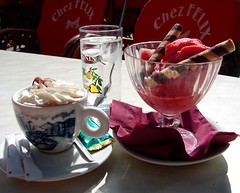
As I make my way up the hill to the old walled part of the city, the wind really picks up. It is intensely difficult to navigate across a bridge with your skirt flying in every direction especially of an upward type and with your packets of chocolate flapping away like out of control boat flags against a wobbly mast (that would be me). But I am undaunted. I am made of hearty peasant stock.
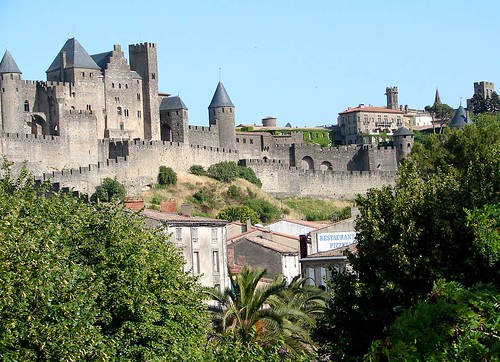
from the bridge, looking up at it
The town itself is significantly empty. The wind has little to do with that. You don’t come to these parts of France if you have issues with winds. It is le football that creates the feeling of a French town abandoned by its own kind.
So that the numerous restaurants on the square look like this:
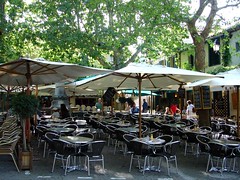
Though if you looked hard enough, inside the bars, you will find this:
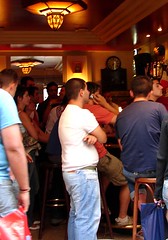
It is very very late by the time I pulled in to the Canal-side restaurant, Pourquois Pas. My landlady is there, serving a tableful of boat people (the vacation barges sometimes stop here for dinner). This time it is a bunch of American dentists with their wives, in France for a brief and very luxurious jaunt along the Canal du Midi.
I talk to them because they have that Midwestern “I am friendly” air that invites conversation. They speak of their trip thus far and they keep repeating how shockingly friendly the French are – in Paris and even more so, here in the south of France.
They told me Parisians were snooty. Parisians helped my wife constantly with her suitcase or when she was having trouble navigating the stairs! And here, we just cannot grasp how it can be that we talk about them as haughty. Everywhere we go, everyone is so nice to us.
This particular dentist had not traveled much up to now (money is not the issue here), but this year he is seizing the travel bull by its horns.
My wife and I noticed that we are getting those little creaks in our bones. We have a window. The children are out, we still hobble around well enough. We have to see the world for ourselves. I’m finally taking time off to do that.
Carcassonne missed its window. Hundreds of years ago, when they were building the Canal du Midi, Riquet (the architect of it) proposed that it should run through town. The citizens would not put up the money for it. And so it was routed a few kilometers north of it. As a result, other towns prospered and Carcassonne fell by the way side. More than a hundred years later, the city changed its mind and so the Canal was rerouted right through town. Too late. Water commerce was on the decline. Carcassonne blew it.
So I did not say to the dentist better late than never.
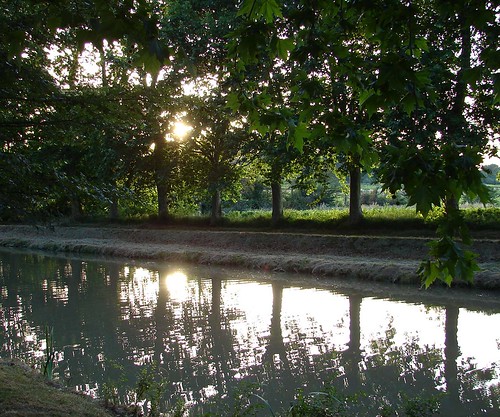
Canal by the restaurant, around 9 in the evening
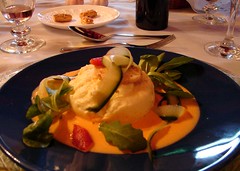
baked cheese on a blue plate
But you know, phrases like “it’s a little too perfect” are just not going to scare me away. I’m fearless. Besides, my artist neighbor approved of the trip and I am in awe of her. She dresses in silks and linen slacks daily, even though on some days the only people she sees are her husband and me. Somehow, I don’t think she does it for either of us. She has the style gene.
And, moreover, Carcassonne is a big town, with a reputation for great chocolates. I need gifts for some of the people of Pierrerue: for Marie-Rose for helping me navigate the Pierrerue street(s), for Celine for opening her house to me last Sunday, for my artist neighbor for letting me eat my lunch daily on her wonderful, secluded patio so that I can look out at the hills and let the sun warm my bare shoulders.
Alright, reasons enough to go. But this time I am no fool. I don’t just plunge into errands and sight seeing. I start the afternoon right:

As I make my way up the hill to the old walled part of the city, the wind really picks up. It is intensely difficult to navigate across a bridge with your skirt flying in every direction especially of an upward type and with your packets of chocolate flapping away like out of control boat flags against a wobbly mast (that would be me). But I am undaunted. I am made of hearty peasant stock.

from the bridge, looking up at it
The town itself is significantly empty. The wind has little to do with that. You don’t come to these parts of France if you have issues with winds. It is le football that creates the feeling of a French town abandoned by its own kind.
So that the numerous restaurants on the square look like this:

Though if you looked hard enough, inside the bars, you will find this:

It is very very late by the time I pulled in to the Canal-side restaurant, Pourquois Pas. My landlady is there, serving a tableful of boat people (the vacation barges sometimes stop here for dinner). This time it is a bunch of American dentists with their wives, in France for a brief and very luxurious jaunt along the Canal du Midi.
I talk to them because they have that Midwestern “I am friendly” air that invites conversation. They speak of their trip thus far and they keep repeating how shockingly friendly the French are – in Paris and even more so, here in the south of France.
They told me Parisians were snooty. Parisians helped my wife constantly with her suitcase or when she was having trouble navigating the stairs! And here, we just cannot grasp how it can be that we talk about them as haughty. Everywhere we go, everyone is so nice to us.
This particular dentist had not traveled much up to now (money is not the issue here), but this year he is seizing the travel bull by its horns.
My wife and I noticed that we are getting those little creaks in our bones. We have a window. The children are out, we still hobble around well enough. We have to see the world for ourselves. I’m finally taking time off to do that.
Carcassonne missed its window. Hundreds of years ago, when they were building the Canal du Midi, Riquet (the architect of it) proposed that it should run through town. The citizens would not put up the money for it. And so it was routed a few kilometers north of it. As a result, other towns prospered and Carcassonne fell by the way side. More than a hundred years later, the city changed its mind and so the Canal was rerouted right through town. Too late. Water commerce was on the decline. Carcassonne blew it.
So I did not say to the dentist better late than never.

Canal by the restaurant, around 9 in the evening

baked cheese on a blue plate
posted by nina, 6/14/2006 07:10:00 AM
| link
| (3) comments
Tuesday, June 13, 2006
from Pierrerue: easy going
It’s irresistible, that Mediterranean is. Two-thirty, I still have some free Internet time left but what the hell, I can work off line. And so I pack a folder of papers and speed to the coast.
An hour, that’s all it takes to put me on the nicest of the great beaches. And it’s a pleasant hour of passing the known to me by now villages of the great St Chinian wines. “Village en peril,” reads one big sign. Villages that depend on booming wine sales. Villages that are no longer seeing booming wine sales as the global marketplace has flooded stores with cheap alternatives to the French stuff.
Why does Puisserguier (just east of St Chinian) have an extra big sign before it saying that it is dying? -- I ask people from around here.
You know, the militant defenders of French agriculture, they come from here, from the south. But that village is no different from the rest. We all depend on the wine markets. And we, here in the Languedoc region, we don’t know how to market ourselves abroad. We don’t know how to show off our wines.
The struggle to succeed. The desire to define success differently.
The daughter of Celine tells me: at the University where I work (she does research on autism), my colleagues, they give 40% of themselves. When I worked in San Francisco, I gave 120%. It was exciting!
Her mother protests: people work hard here. You see just one corner of the world over there in Montpellier. Here, they take time off, but when they are working, they work hard.
The young measure excitement differently.
The daughter of Marie Rose comes to see me this morning. She is a nurse at the hospital. Her fiancée is a computer guy. They are going to California for a while. She wants to know what it’s like to have a baby in America. As so many others here, she intends to get pregnant before getting married. Are there nurseries for small ones, like here?
Here, school starts at the age of two. It’s free, but even before that, subsidies make nannies and nurseries completely affordable. It is both good and not so good that it does not pay for a mother to work when her children are young.
Celine chose work anyway.
I had my mother and mother-in-law help me and the nurseries here are good. I never slowed down.
But her fast paced job at the Wine Cooperative still allows her long periods of time at home, for all meals, for long holidays, for five week vacations.
I talk to my neighbor, the artist. Why do young people want to travel to America? To make money?
No, I don’t think so. It’s for the adventure. You earn more there, but everything costs more. My cousin lives in California, I visited her. I could not believe her housing costs, the food costs! But then, everything is so big there! I never saw such large refrigerators before. And the bottles inside –huge! You know what gave me the biggest surprise though? That people ate inside their cars. I saw it, they took out foods and beverages, just like that!
Marie Rose’s daughter plans on keeping her house, here in Pierrerue. No one lets go of their village house. Nothing is ever for sale here they say.
I drive to the beach, with my stack of papers and several bottles of water. I pass these villages and the vineyards around them, I listen to French radio: two French songs, one American and an occasional Italian, that’s the ratio. Commercials for Citroen, for Splash Park, updates on the World Cup. Tuesday is the big day – France plays. The men will watch, the women still roll their eyes at the whole thing.
Sixty-one minutes later, my road curves and runs parallel to the water. I pull over and walk onto the sand. I spread my towel, take off all but what’s necessary to remain respectable and lie down.
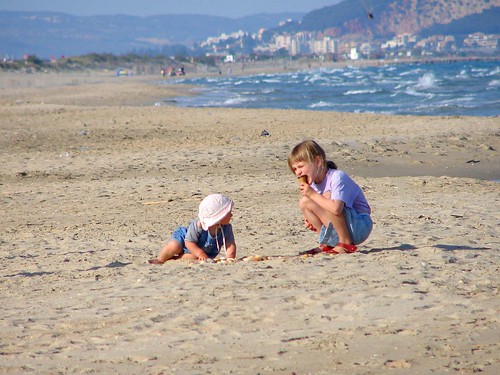
watching the disappearing ice cream cone
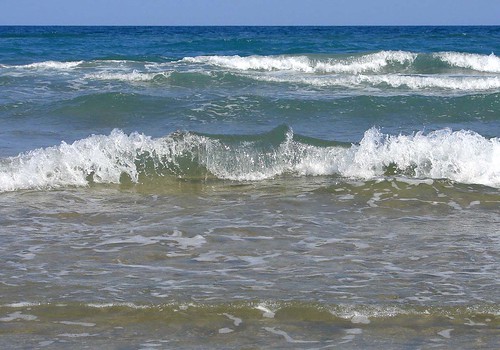
watching the waves
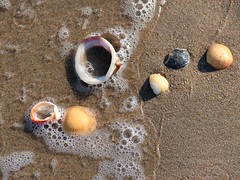
...and what they leave behind
I stop by my neighbor the artist’s house this morning.
You are home? I thought you were going to Spain for the day.
No, a change of plans. My husband wants to watch the game tonight.
Oh, too bad. Maybe you’ll go on the week-end?
The week-end? She smiles. For us, everyday is like the week-end.
It’s evening. The breeze on the beach becomes cooler now. Time to head back. Bread, sautéed veggies, cheese, wine. White peaches, sweet melon and a tart filled with pine nuts. A day like any other.
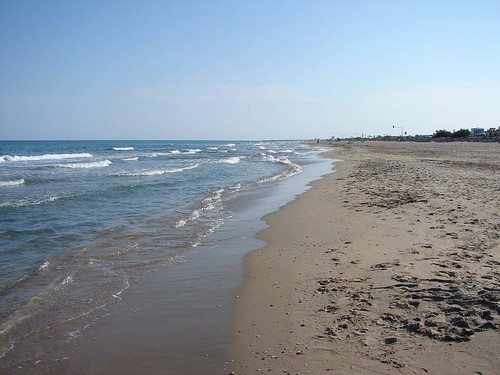
empty in the early evening
An hour, that’s all it takes to put me on the nicest of the great beaches. And it’s a pleasant hour of passing the known to me by now villages of the great St Chinian wines. “Village en peril,” reads one big sign. Villages that depend on booming wine sales. Villages that are no longer seeing booming wine sales as the global marketplace has flooded stores with cheap alternatives to the French stuff.
Why does Puisserguier (just east of St Chinian) have an extra big sign before it saying that it is dying? -- I ask people from around here.
You know, the militant defenders of French agriculture, they come from here, from the south. But that village is no different from the rest. We all depend on the wine markets. And we, here in the Languedoc region, we don’t know how to market ourselves abroad. We don’t know how to show off our wines.
The struggle to succeed. The desire to define success differently.
The daughter of Celine tells me: at the University where I work (she does research on autism), my colleagues, they give 40% of themselves. When I worked in San Francisco, I gave 120%. It was exciting!
Her mother protests: people work hard here. You see just one corner of the world over there in Montpellier. Here, they take time off, but when they are working, they work hard.
The young measure excitement differently.
The daughter of Marie Rose comes to see me this morning. She is a nurse at the hospital. Her fiancée is a computer guy. They are going to California for a while. She wants to know what it’s like to have a baby in America. As so many others here, she intends to get pregnant before getting married. Are there nurseries for small ones, like here?
Here, school starts at the age of two. It’s free, but even before that, subsidies make nannies and nurseries completely affordable. It is both good and not so good that it does not pay for a mother to work when her children are young.
Celine chose work anyway.
I had my mother and mother-in-law help me and the nurseries here are good. I never slowed down.
But her fast paced job at the Wine Cooperative still allows her long periods of time at home, for all meals, for long holidays, for five week vacations.
I talk to my neighbor, the artist. Why do young people want to travel to America? To make money?
No, I don’t think so. It’s for the adventure. You earn more there, but everything costs more. My cousin lives in California, I visited her. I could not believe her housing costs, the food costs! But then, everything is so big there! I never saw such large refrigerators before. And the bottles inside –huge! You know what gave me the biggest surprise though? That people ate inside their cars. I saw it, they took out foods and beverages, just like that!
Marie Rose’s daughter plans on keeping her house, here in Pierrerue. No one lets go of their village house. Nothing is ever for sale here they say.
I drive to the beach, with my stack of papers and several bottles of water. I pass these villages and the vineyards around them, I listen to French radio: two French songs, one American and an occasional Italian, that’s the ratio. Commercials for Citroen, for Splash Park, updates on the World Cup. Tuesday is the big day – France plays. The men will watch, the women still roll their eyes at the whole thing.
Sixty-one minutes later, my road curves and runs parallel to the water. I pull over and walk onto the sand. I spread my towel, take off all but what’s necessary to remain respectable and lie down.

watching the disappearing ice cream cone

watching the waves

...and what they leave behind
I stop by my neighbor the artist’s house this morning.
You are home? I thought you were going to Spain for the day.
No, a change of plans. My husband wants to watch the game tonight.
Oh, too bad. Maybe you’ll go on the week-end?
The week-end? She smiles. For us, everyday is like the week-end.
It’s evening. The breeze on the beach becomes cooler now. Time to head back. Bread, sautéed veggies, cheese, wine. White peaches, sweet melon and a tart filled with pine nuts. A day like any other.

empty in the early evening
posted by nina, 6/13/2006 06:25:00 AM
| link
| (3) comments
Monday, June 12, 2006
from Pierrerue: l’invitation
It’s midnight, Saturday. I’ve bunny hopped and discoed and cha chad at the Fete de Pierrerue and now it’s time to go home.
As I say good bye to the people at my table, Celine asks:
Will you come to the Sunday meal with my family?
I am flooded with good will and, soon after, panic. I had managed four hours of French conversation during the Fete, but let’s face it, it’s a lot easier to keep going when you have built in interruptions such as dancing and choking on a tomato.
And there are the obvious worries: what do I wear? If I overdress, I’ll look stupid. If I underdress, I’ll insult my hosts.
The gift, too. At home, there is no question: you bring wine. It is so much the norm that I think anyone who still neglects this custom must be doing it on purpose. But here, am I to bring wine to a family who has for generations made a business of it? Isn’t it like bringing chocolate chip cookies to a pastry chef? Here, I know you have perfected the art of baking Napoleons, but let me present you with some nice and chewy cookies from a recipe off of a Nestle’s chocolate chip package.
Marie-Rose offers to walk me to Celine’s house. Marie Rose knows that I cannot get the bread lady’s schedule straight nor swallow tomatoes properly and am, therefore, likely to lose my way even in this one street village. She is sweet to be concerned.
But indeed, I am thrilled to accept the invitation. It is both an honor and a pleasure for me. I will try hard. I will read up on the village life of a Catalan woman (see post below).
Sunday morning, I wash every last piece of clothing in case I decide to wear any of it. Then, off to the market. I pick up a good Muscat – the preferred aperitif here – and a bunch of roses. At 12:30, Marie Rose and I set off. I ask if she wants me to drive – Celine's house is at the edge of the village, a kilometer uphill, but she says no, it’s good for her cellulite to walk. It astonishes me that old-world Marie Rose worries about cellulite.
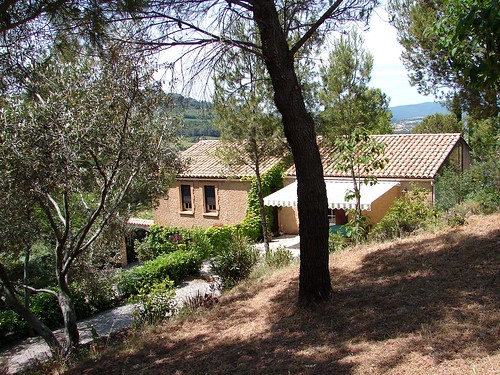
Celine and Pierre's home
Marie Rose does not stay – she has her own 92-year old mother back home to attend to. Inside the gate, Celine is waiting. Her daughter shows off their garden and we go inside. The table is set, le dejeuner with maman, papa, fille and fils (though fils will be late as his summer job down at the village café will keep him running until 3) and grandmere is about to begin.
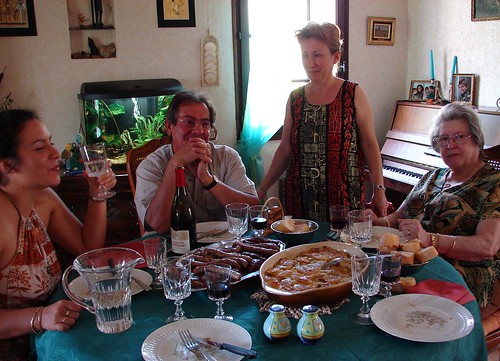
I know, it was to be expected. The meal was wonderful, all four hours of it. Little pizzettes with the aperitif (I could have stopped right there, foodwise), salads, grilled meats and sausages (I had to try all four types), a potato cake (I had seconds), a tray of pastries (I ate the whole thing), melon with champagne (my cup runneth over), espresso.
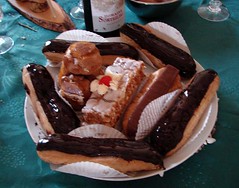
Certainly, I walked away with a new and improved idea of what it’s like to live in this quiet corner of southern France. Myths got debunked, but my respect and love for this village remains firm. I am, however, completely set straight now on the following:
- not all French eat croissants everyday for breakfast. Those baguette slices from the previous night’s dinner? Perfect as toast and jam the next morning;
- five weeks per year are the French vacation minimum, but not all is taken in the summer. Take Pierre, Celine’s husband. He hunts wild birds in the winter, along with his pals. Three weeks needed for that alone;
- time may have stood still in the Languedoc (this region of southern France), but yoga has come to the villages, at least to the one next door. Celine partakes, along with a handful of other women. She shows us some poses, turns pink, giggles, trips and sits down. Forget the meditation part, she’s after the feeling supple and looking great bit;
- a small village is not one small gossip circuit. An example of how little is known about others: they tell me Marie Rose is the village traditionalist. She prays a lot and has conservative ideas. But they know nothing of my other neighbors, the artists, even though these guys have lived here for more than five years. Marie Rose, on the other hand, knows the artists, but isn’t quite sure what he does for a living. A policeman maybe? No one knows much of anything about my English landlady. Until this day, when I invited her in to look around, Marie Rose had never even been inside my little apartment (no love lost between the two women) and Celine and Pierre were stunned to know that my landlady was the owner of the well known restaurant, Pourquois Pas;
- it is true, however, that women hanging around village cafés in the afternoon raise eyebrows and that women on a Petanque court are a rarity. Celine’s older daughter summarized it thus: Petanque is boring. Why would I want to do that anyway?
- It is also true that if you order a café crème (coffee with milk) in the afternoon, you will be pegged as someone with a weird digestive system. The French are absolutely convinced that mixing milk with coffee after the sun has passed its high point for the day will ruin you;
- A nap after a long lunch is a must. The grandmere, the fils and the papa all fell asleep before I left. That might lead you to believe that I overstayed my welcome, but no, I made every effort to leave when grandmere first let out a gentle little snore. But I could not do it. The women were engaged and engaging and only after a promise of future contact could I retreat to give them, too, a chance to exhale.
They tell me this part of the France is the last of the pays sauvage. I do not know how to translate it, but it does strike the right image: It is not wild, nor savage, or maybe it is both. It remains, most certainly unspoiled. Yes, they say that Johnny Depp bought a house near Montpellier and the entire province cannot stop talking about it. Over dinner, every day, in a leisurely way, until the last word has been said and the last sip of espresso finished.
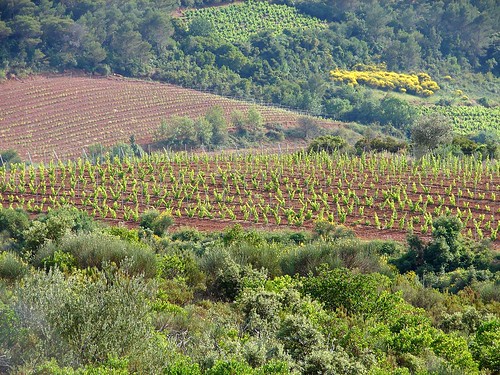
along the road, back to the village
As I say good bye to the people at my table, Celine asks:
Will you come to the Sunday meal with my family?
I am flooded with good will and, soon after, panic. I had managed four hours of French conversation during the Fete, but let’s face it, it’s a lot easier to keep going when you have built in interruptions such as dancing and choking on a tomato.
And there are the obvious worries: what do I wear? If I overdress, I’ll look stupid. If I underdress, I’ll insult my hosts.
The gift, too. At home, there is no question: you bring wine. It is so much the norm that I think anyone who still neglects this custom must be doing it on purpose. But here, am I to bring wine to a family who has for generations made a business of it? Isn’t it like bringing chocolate chip cookies to a pastry chef? Here, I know you have perfected the art of baking Napoleons, but let me present you with some nice and chewy cookies from a recipe off of a Nestle’s chocolate chip package.
Marie-Rose offers to walk me to Celine’s house. Marie Rose knows that I cannot get the bread lady’s schedule straight nor swallow tomatoes properly and am, therefore, likely to lose my way even in this one street village. She is sweet to be concerned.
But indeed, I am thrilled to accept the invitation. It is both an honor and a pleasure for me. I will try hard. I will read up on the village life of a Catalan woman (see post below).
Sunday morning, I wash every last piece of clothing in case I decide to wear any of it. Then, off to the market. I pick up a good Muscat – the preferred aperitif here – and a bunch of roses. At 12:30, Marie Rose and I set off. I ask if she wants me to drive – Celine's house is at the edge of the village, a kilometer uphill, but she says no, it’s good for her cellulite to walk. It astonishes me that old-world Marie Rose worries about cellulite.

Celine and Pierre's home
Marie Rose does not stay – she has her own 92-year old mother back home to attend to. Inside the gate, Celine is waiting. Her daughter shows off their garden and we go inside. The table is set, le dejeuner with maman, papa, fille and fils (though fils will be late as his summer job down at the village café will keep him running until 3) and grandmere is about to begin.

I know, it was to be expected. The meal was wonderful, all four hours of it. Little pizzettes with the aperitif (I could have stopped right there, foodwise), salads, grilled meats and sausages (I had to try all four types), a potato cake (I had seconds), a tray of pastries (I ate the whole thing), melon with champagne (my cup runneth over), espresso.

Certainly, I walked away with a new and improved idea of what it’s like to live in this quiet corner of southern France. Myths got debunked, but my respect and love for this village remains firm. I am, however, completely set straight now on the following:
- not all French eat croissants everyday for breakfast. Those baguette slices from the previous night’s dinner? Perfect as toast and jam the next morning;
- five weeks per year are the French vacation minimum, but not all is taken in the summer. Take Pierre, Celine’s husband. He hunts wild birds in the winter, along with his pals. Three weeks needed for that alone;
- time may have stood still in the Languedoc (this region of southern France), but yoga has come to the villages, at least to the one next door. Celine partakes, along with a handful of other women. She shows us some poses, turns pink, giggles, trips and sits down. Forget the meditation part, she’s after the feeling supple and looking great bit;
- a small village is not one small gossip circuit. An example of how little is known about others: they tell me Marie Rose is the village traditionalist. She prays a lot and has conservative ideas. But they know nothing of my other neighbors, the artists, even though these guys have lived here for more than five years. Marie Rose, on the other hand, knows the artists, but isn’t quite sure what he does for a living. A policeman maybe? No one knows much of anything about my English landlady. Until this day, when I invited her in to look around, Marie Rose had never even been inside my little apartment (no love lost between the two women) and Celine and Pierre were stunned to know that my landlady was the owner of the well known restaurant, Pourquois Pas;
- it is true, however, that women hanging around village cafés in the afternoon raise eyebrows and that women on a Petanque court are a rarity. Celine’s older daughter summarized it thus: Petanque is boring. Why would I want to do that anyway?
- It is also true that if you order a café crème (coffee with milk) in the afternoon, you will be pegged as someone with a weird digestive system. The French are absolutely convinced that mixing milk with coffee after the sun has passed its high point for the day will ruin you;
- A nap after a long lunch is a must. The grandmere, the fils and the papa all fell asleep before I left. That might lead you to believe that I overstayed my welcome, but no, I made every effort to leave when grandmere first let out a gentle little snore. But I could not do it. The women were engaged and engaging and only after a promise of future contact could I retreat to give them, too, a chance to exhale.
They tell me this part of the France is the last of the pays sauvage. I do not know how to translate it, but it does strike the right image: It is not wild, nor savage, or maybe it is both. It remains, most certainly unspoiled. Yes, they say that Johnny Depp bought a house near Montpellier and the entire province cannot stop talking about it. Over dinner, every day, in a leisurely way, until the last word has been said and the last sip of espresso finished.

along the road, back to the village
posted by nina, 6/12/2006 04:25:00 AM
| link
| (2) comments
Sunday, June 11, 2006
from Pierrerue: painters and parties
I went to Ceret in the late afternoon both because it is at the foothills of the Pyrenees and because it was once a place of escape for artists and intellectuals. They left traces of their work behind: Picasso, Chagall, Kisling, Cocteau among countless others. I wanted to see the place for myself to see what the draw was (besides freedom from oppressive and belligerent regimes).
Of course, I am curious about other stuff too. Ceret is just a few kilometers from Spain. When faced with a border, I want to cross it. What’s it like on the other side?
And so before proceeding to Ceret, I turned south, dug out my passport and recalled a few Spanish words I thought might be useful. Ola. Mui rico. They’re all greetings, or comments on food.
I must admit, crossing over to Spain was one of those bad decisions. I had sped south for two hours and was due back at Pierrerue before 8. My time was limited and should not have been given over to border towns packed with shoppers buying up tobacco and motorbikes and God knows what else.
The snaking line of traffic was discouraging and I was prepared to spend even more time at the border itself. Thankfully, the Spanish control person chose at this hour to take a nap and I was happy to see traffic whiz by his booth without him so much as opening an eye. I thought for a minute he may be dead, all sprawled out as he was and so I was relieved to see his stomach move up and down with some regularity.
Having snuck past that, I breathed a (premature) sigh of relief. Seconds later, however, I was pulled over by a very pleasant if official looking woman. I watched with envy as all others sailed through without attracting hers or anyone’s attention.
Where are you going and how long will you be there? She asked.
Ashamed of my reasons for being there (for the hell of it), I eeked out: twenty minutes.
Not staying overnight?
No…
And you are driving a rented car?
Is that it? Am I not allowed to bring in a rented car here? I should have checked. Still…
Yes, it’s rented. Listen, I can turn back… Interest in a peek at Spain was vanishing. I’ve been in Spain plenty. Why this detour? Foolish.
Just one more thing. How old are you??
Now that just gave me pause and so I asked –why do you want to know?
For the survey, of course. I am from the Tourist Bureau and we are conducting random surveys of visitors.
It seems prudent to disclose this information at the outset, but I am not here to make a fuss, so I tell her my age and drive on.
Reflecting that Spain is a pretty place even if this particular spot does not adequately display her splendors, I decide to at least find a café that would do me up a fine cappuccino. And I did find a restaurant off to the side somewhere, boasting fresh ingredients and Catalan food and so I ordered a Catalan Cream in addition to the coffee and proceeded to have a fine discussion on the merits of the Catalan Cream over the French Crème Brulee. The former, I’m told, has flavors of orange and honey and a richness that I am assured cannot be found in something as plain as a Crème Brulee, which, after all, is merely eggs, cream and sugar.
It was past five when I finally arrived in Ceret. That turned out to work in Ceret’s favor. The colors of houses, the dappled plane trees, the mellowness of a late afternoon light all made the town lovely to behold.
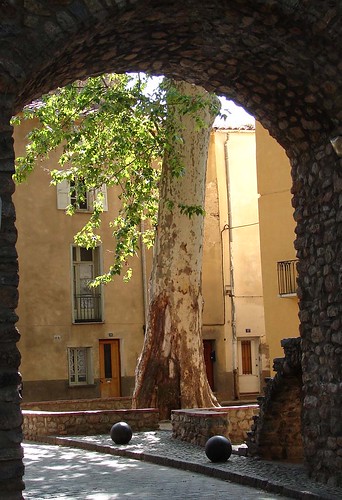
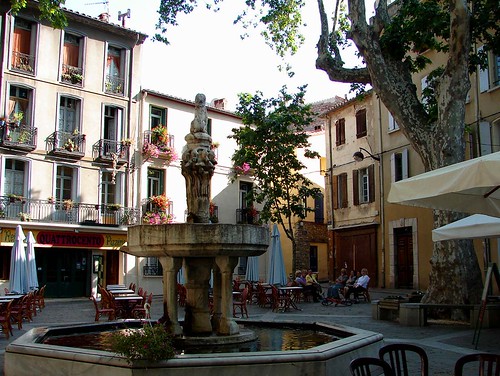
In the Museum of Modern Art, I saw a more somber story, of course. Artists escaping war and repression are inevitably going to work through their stress in their creations and indeed, Picasso’s gift to the museum was a painting depicting evil and Chagall’s magnificent painting on the theme of war could not be more moving in a very sad sort of way.
True, Picasso also left behind ceramics depicting bull fights, which were very a propos, this being a town that goes in for that sort of thing. And there was an occasional Dufy and we know Dufy can paint no evil, so that was a bit of a relief.
I also went to a bookstore and asked if they had any book at all that would help me out a little with the finer nuance of French grammar. I was tired of hearing myself speak incorrectly.
Ceret’s bookstores are a bit on the pretentious side. They have serious little volumes on art, philosophy and on the human condition in general. There was not a grammar book to be had, but I was assured that I would do well reading to myself the memoirs of a Catalan woman – something about having to leave home and suffering separation anxiety from the village of her youth. I was flattered that my French was pegged at such a level. Or maybe she wrote in a particularly accessible way. In any case, I have the book with me and will get to it as soon as the tempo of life here in the south of France slows down for me even more.
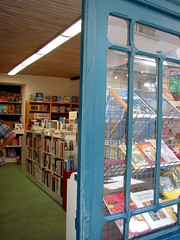
In the evening there was, of course, the annual Pierrerue Fete. I went down with great trepidation. I knew hardly anyone in town. Why had I thought this to be a good idea?
Madame Marie-Rose rescued me. Literally, she saved my life as I managed to, early on, choke on a tomato wedge and without her resounding slap on my back, delivered with the force of a woman who has seen death and would not like to repeat the experience just that evening, I would have been but ashes in the cemetery at the bottom of the Pierrerue hill.
The Fete itself was possibly the highpoint of highpoints. 160 people showed up from Pierrerue and its sister village just down the hill (Combejean). The village youth prepared and served the food, counting on a profit that would allow them to party to high heaven later in the season.
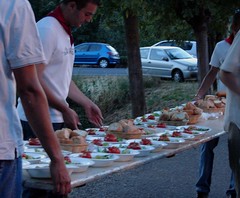
delivering
Of course, this being an intergenerational kind of place, on this night both young and old mixed, ate and danced together late into the night and I am told in July the old will again show up to the party of the young and, just as on this night, they will start with the slower dances, move right into a multiage bunny hop and wind the evening down with some hearty disco stuff.
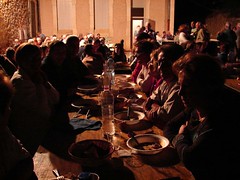
my table
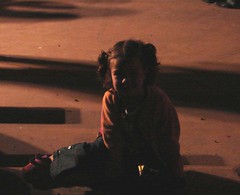
taking it in
Such an evening! I will long remember Celine* (my age) explaining across the table to Marie-Rose what life is like in America. Her daughter had done graduate work in San Francisco and so she knew the scoop. America, from a French person’s perspective: there is great concern that we do not use trains enough and that we lack bread stores in every village.
Celine works at the wine cooperative. Her father and grandfather were “wine growers” (vignerons). If you asked her if she ever thought about leaving Pierrerue she would laugh. Entre deux. Pierrerue is an entre deux village – it lies between the two: mountains and sea. It is, in the eyes of its residents, a perfect location, like no other on earth. They love this place. Me too, outsider that I am.
*where people have offered personal stories out of friendship rather of a service, I have disguised identifiers – the most obvious being names. I’ve changed most of them.
Of course, I am curious about other stuff too. Ceret is just a few kilometers from Spain. When faced with a border, I want to cross it. What’s it like on the other side?
And so before proceeding to Ceret, I turned south, dug out my passport and recalled a few Spanish words I thought might be useful. Ola. Mui rico. They’re all greetings, or comments on food.
I must admit, crossing over to Spain was one of those bad decisions. I had sped south for two hours and was due back at Pierrerue before 8. My time was limited and should not have been given over to border towns packed with shoppers buying up tobacco and motorbikes and God knows what else.
The snaking line of traffic was discouraging and I was prepared to spend even more time at the border itself. Thankfully, the Spanish control person chose at this hour to take a nap and I was happy to see traffic whiz by his booth without him so much as opening an eye. I thought for a minute he may be dead, all sprawled out as he was and so I was relieved to see his stomach move up and down with some regularity.
Having snuck past that, I breathed a (premature) sigh of relief. Seconds later, however, I was pulled over by a very pleasant if official looking woman. I watched with envy as all others sailed through without attracting hers or anyone’s attention.
Where are you going and how long will you be there? She asked.
Ashamed of my reasons for being there (for the hell of it), I eeked out: twenty minutes.
Not staying overnight?
No…
And you are driving a rented car?
Is that it? Am I not allowed to bring in a rented car here? I should have checked. Still…
Yes, it’s rented. Listen, I can turn back… Interest in a peek at Spain was vanishing. I’ve been in Spain plenty. Why this detour? Foolish.
Just one more thing. How old are you??
Now that just gave me pause and so I asked –why do you want to know?
For the survey, of course. I am from the Tourist Bureau and we are conducting random surveys of visitors.
It seems prudent to disclose this information at the outset, but I am not here to make a fuss, so I tell her my age and drive on.
Reflecting that Spain is a pretty place even if this particular spot does not adequately display her splendors, I decide to at least find a café that would do me up a fine cappuccino. And I did find a restaurant off to the side somewhere, boasting fresh ingredients and Catalan food and so I ordered a Catalan Cream in addition to the coffee and proceeded to have a fine discussion on the merits of the Catalan Cream over the French Crème Brulee. The former, I’m told, has flavors of orange and honey and a richness that I am assured cannot be found in something as plain as a Crème Brulee, which, after all, is merely eggs, cream and sugar.
It was past five when I finally arrived in Ceret. That turned out to work in Ceret’s favor. The colors of houses, the dappled plane trees, the mellowness of a late afternoon light all made the town lovely to behold.


In the Museum of Modern Art, I saw a more somber story, of course. Artists escaping war and repression are inevitably going to work through their stress in their creations and indeed, Picasso’s gift to the museum was a painting depicting evil and Chagall’s magnificent painting on the theme of war could not be more moving in a very sad sort of way.
True, Picasso also left behind ceramics depicting bull fights, which were very a propos, this being a town that goes in for that sort of thing. And there was an occasional Dufy and we know Dufy can paint no evil, so that was a bit of a relief.
I also went to a bookstore and asked if they had any book at all that would help me out a little with the finer nuance of French grammar. I was tired of hearing myself speak incorrectly.
Ceret’s bookstores are a bit on the pretentious side. They have serious little volumes on art, philosophy and on the human condition in general. There was not a grammar book to be had, but I was assured that I would do well reading to myself the memoirs of a Catalan woman – something about having to leave home and suffering separation anxiety from the village of her youth. I was flattered that my French was pegged at such a level. Or maybe she wrote in a particularly accessible way. In any case, I have the book with me and will get to it as soon as the tempo of life here in the south of France slows down for me even more.

In the evening there was, of course, the annual Pierrerue Fete. I went down with great trepidation. I knew hardly anyone in town. Why had I thought this to be a good idea?
Madame Marie-Rose rescued me. Literally, she saved my life as I managed to, early on, choke on a tomato wedge and without her resounding slap on my back, delivered with the force of a woman who has seen death and would not like to repeat the experience just that evening, I would have been but ashes in the cemetery at the bottom of the Pierrerue hill.
The Fete itself was possibly the highpoint of highpoints. 160 people showed up from Pierrerue and its sister village just down the hill (Combejean). The village youth prepared and served the food, counting on a profit that would allow them to party to high heaven later in the season.

delivering
Of course, this being an intergenerational kind of place, on this night both young and old mixed, ate and danced together late into the night and I am told in July the old will again show up to the party of the young and, just as on this night, they will start with the slower dances, move right into a multiage bunny hop and wind the evening down with some hearty disco stuff.

my table

taking it in
Such an evening! I will long remember Celine* (my age) explaining across the table to Marie-Rose what life is like in America. Her daughter had done graduate work in San Francisco and so she knew the scoop. America, from a French person’s perspective: there is great concern that we do not use trains enough and that we lack bread stores in every village.
Celine works at the wine cooperative. Her father and grandfather were “wine growers” (vignerons). If you asked her if she ever thought about leaving Pierrerue she would laugh. Entre deux. Pierrerue is an entre deux village – it lies between the two: mountains and sea. It is, in the eyes of its residents, a perfect location, like no other on earth. They love this place. Me too, outsider that I am.
*where people have offered personal stories out of friendship rather of a service, I have disguised identifiers – the most obvious being names. I’ve changed most of them.
posted by nina, 6/11/2006 04:20:00 PM
| link
| (0) comments
Saturday, June 10, 2006
from Pierrerue: mirror mirror
I wanted to catch the 2:15 train to Montpellier. I worked hard to get stuff done, but in the end, even though I drove demonically to Beziers in the hopes of making it, I missed it by two minutes and had to settle for the 3:09. It is almost an hour ride from Beziers, which meant that it wasn’t until after 4 that I exited the train station of Montpellier La Roche. Late, considering I absolutely had to be on the 6:47 return in order to make my dinner reservation up in the little village just beyond Pierrerue.
Montpellier is a big city. And it is actually very pretty, all cleaned up and spiffy, with large boulevards, flashy modern blue and yellow tram cars moving along the main circuit, squares, parks, and I hear it has a fascinating old town.
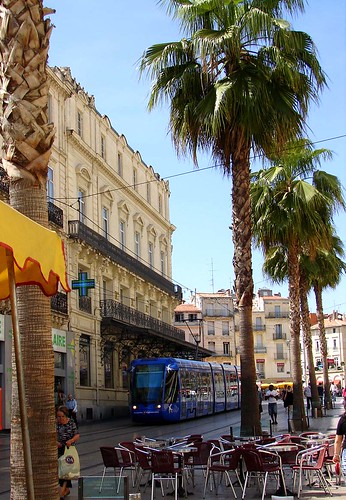
I saw hardly any of it. Here’s why:
In my rural ramblings, I have been missing this one aspect of city life: the café. Village cafés are different. Oftentimes they are right in the midst of traffic, just so you can catch every single car and person that passes through. They are not pretty, they’re functional. A pastis or an espresso, a chat and you’re off.
Sure, they are good for people watching and especially of older men watching, as they are the most frequent habitués of the village café. This was taken yesterday, over a café noisette (forget about cappuccino at the village; the cappuccino to them demands whipped cream; most often, the café-bar has none and therefore will refuse your cappuccino request).
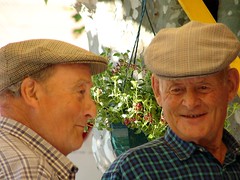
the men of St. Chinian
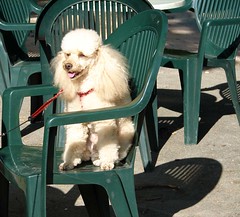
okay, the St. Chinian poodle could feel at home at any city or village in France
But there’s something about a grand outdoor café that a city provides, out there on the open boulevard or closed-to-traffic square, something that just cannot be replicated elsewhere – not on the corner of St Chinian, not on State Street in Madison. It’s certainly not better than the latter, it’s simply different and after two weeks of village life, I was hankering for an afternoon of that difference.
And sure enough, Montpellier has an abundance of outdoor cafés. Indeed, the focal point is a large square which, like in Krakow, Venice or any other large European city, has been handed over to the café crowds. And they are different than my wonderfully capped men of St Chinian. (Again, not at all better and hardly more interesting, just very different.) Compare and contrast.
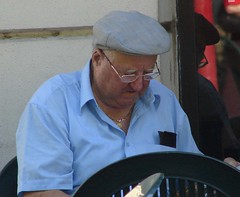
St Chinian cafe
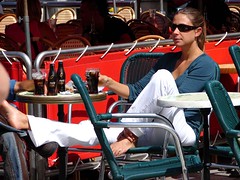
Montpellier cafe
But before sitting down for my coveted and adored cappuccino, I make the mistake of entering the Galleries Lafayette and trying on a beautiful blue and yellow scarf.
I look in the mirror and freeze.
Pierrerue does not have much of a mirror. There is something resembling one hanging in the bathroom, but the lightbulb there has long gone out and I haven’t bothered climbing up to replace it. And now, in the bright lights of the Galleries Lafayette I could witness the true state of my hair: under the influence of the southern sun, it had turned almost completely blonde.
That’s fine. I have no problem with being a blonde in the summer of 2006. The problem is that the roots, hidden there under layers of blondeness, are having a hard time catching up. Brown roots, a splash of gray at the temples and a mound of basic blondness. I can’t believe I have been out in public like this!
It is 5:30. I enter a haircut store conveniently positioned outside the doors of the Galleries Lafayette and tell the desk person: do something! Is there a product you can sell me? Anything!
She looks at me, spins around and runs off to get the manager. He comes to the front, looks at me, frowns, reaches for some product and proceeds to explain how I might use it and what I may hope to accomplish for an interim solution.
I lost him on step number 43. It could be that after going through this, I will wind up looking worse than I look right now.
I have a train to catch in one hour and fifteen minutes. Can you fix my cheveux in that time, please?
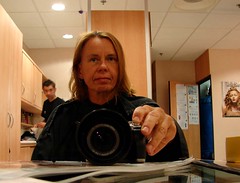
Jason's replacement in the background
Fifty five minutes, that’s all they needed. He painted and hummed so that my roots caught up to the rest of the south of France effect. She scrubbed, conditioned and conditioned some more. Want me to cut it too? Oh, go for it. Snip, snip, two minutes later she is done. My man Jason back home would be appalled.
Fact is, though, I can’t say I’d be looking much better after a Jason afternoon. And the price? One third that of Madison’s. I’m thinking: if I saved on hair by tending to it here and used the savings for airfare, could I make it to Montpellier, say, every two months and come out even?
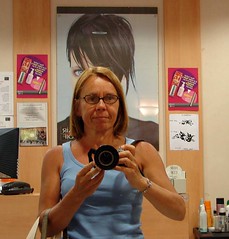
No café this time. I ran in my flashy flowered sandals, without even pausing for an ice cream cone. But late at night, as I worked my way through the multicourse presentation of chef Frederic at my favorite village restaurant, I did think for the first time that I looked at least presentable. No little girl shoes, no denim skirt, perfectly styled hair with no dark roots. France is transforming me.
The night ended with cheeses and gratineed fruits.
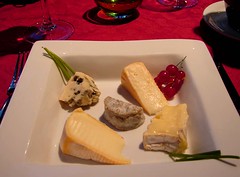
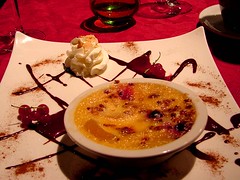
Montpellier is a big city. And it is actually very pretty, all cleaned up and spiffy, with large boulevards, flashy modern blue and yellow tram cars moving along the main circuit, squares, parks, and I hear it has a fascinating old town.

I saw hardly any of it. Here’s why:
In my rural ramblings, I have been missing this one aspect of city life: the café. Village cafés are different. Oftentimes they are right in the midst of traffic, just so you can catch every single car and person that passes through. They are not pretty, they’re functional. A pastis or an espresso, a chat and you’re off.
Sure, they are good for people watching and especially of older men watching, as they are the most frequent habitués of the village café. This was taken yesterday, over a café noisette (forget about cappuccino at the village; the cappuccino to them demands whipped cream; most often, the café-bar has none and therefore will refuse your cappuccino request).

the men of St. Chinian

okay, the St. Chinian poodle could feel at home at any city or village in France
But there’s something about a grand outdoor café that a city provides, out there on the open boulevard or closed-to-traffic square, something that just cannot be replicated elsewhere – not on the corner of St Chinian, not on State Street in Madison. It’s certainly not better than the latter, it’s simply different and after two weeks of village life, I was hankering for an afternoon of that difference.
And sure enough, Montpellier has an abundance of outdoor cafés. Indeed, the focal point is a large square which, like in Krakow, Venice or any other large European city, has been handed over to the café crowds. And they are different than my wonderfully capped men of St Chinian. (Again, not at all better and hardly more interesting, just very different.) Compare and contrast.

St Chinian cafe

Montpellier cafe
But before sitting down for my coveted and adored cappuccino, I make the mistake of entering the Galleries Lafayette and trying on a beautiful blue and yellow scarf.
I look in the mirror and freeze.
Pierrerue does not have much of a mirror. There is something resembling one hanging in the bathroom, but the lightbulb there has long gone out and I haven’t bothered climbing up to replace it. And now, in the bright lights of the Galleries Lafayette I could witness the true state of my hair: under the influence of the southern sun, it had turned almost completely blonde.
That’s fine. I have no problem with being a blonde in the summer of 2006. The problem is that the roots, hidden there under layers of blondeness, are having a hard time catching up. Brown roots, a splash of gray at the temples and a mound of basic blondness. I can’t believe I have been out in public like this!
It is 5:30. I enter a haircut store conveniently positioned outside the doors of the Galleries Lafayette and tell the desk person: do something! Is there a product you can sell me? Anything!
She looks at me, spins around and runs off to get the manager. He comes to the front, looks at me, frowns, reaches for some product and proceeds to explain how I might use it and what I may hope to accomplish for an interim solution.
I lost him on step number 43. It could be that after going through this, I will wind up looking worse than I look right now.
I have a train to catch in one hour and fifteen minutes. Can you fix my cheveux in that time, please?

Jason's replacement in the background
Fifty five minutes, that’s all they needed. He painted and hummed so that my roots caught up to the rest of the south of France effect. She scrubbed, conditioned and conditioned some more. Want me to cut it too? Oh, go for it. Snip, snip, two minutes later she is done. My man Jason back home would be appalled.
Fact is, though, I can’t say I’d be looking much better after a Jason afternoon. And the price? One third that of Madison’s. I’m thinking: if I saved on hair by tending to it here and used the savings for airfare, could I make it to Montpellier, say, every two months and come out even?

No café this time. I ran in my flashy flowered sandals, without even pausing for an ice cream cone. But late at night, as I worked my way through the multicourse presentation of chef Frederic at my favorite village restaurant, I did think for the first time that I looked at least presentable. No little girl shoes, no denim skirt, perfectly styled hair with no dark roots. France is transforming me.
The night ended with cheeses and gratineed fruits.


posted by nina, 6/10/2006 04:25:00 AM
| link
| (5) comments
Friday, June 09, 2006
from Pierrerue: two stories, one theme
First story:
Late in the afternoon I drive to the village of Olargues. It is in the mountains north and west of here. Even the cherry trees give up by the time you get to it. Vineyards? No, not that either. I see signs in front of houses announcing the sale of honey, so I guess bees like it up here.
Bees and the Committee for the Selection of the Prettiest Villages of France (if such a committee there is).
I have said this before: France ranks and rewards most everything you could imagine. Food preparation alone is eligible for rosettes, forks, torques, stars, young chef awards (Alain of Atmospheres in the Savoie won one of those last year), oh you name it, they give it.
And villages as well: that one is worth one flower. Another: two. Olargues gets three stars and a designation: it belongs to the elite group of “Prettiest Villages.”
Pierrerue isn’t even rated, that’s how insignificant it is in the eyes of the Committee for the Selection of the Prettiest Villages of France.
For Olargues, I think it has become a self-fulfilling prophecy. Once adorned and adored, you start puffing yourself out (villages are like people in this respect). Flowers magically appear.
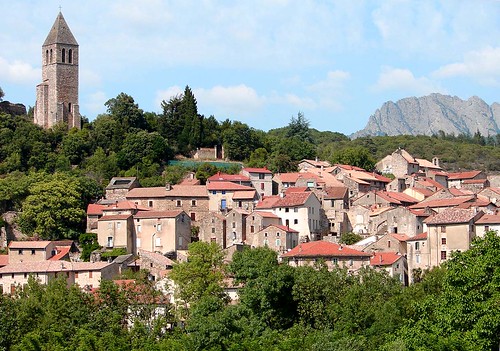
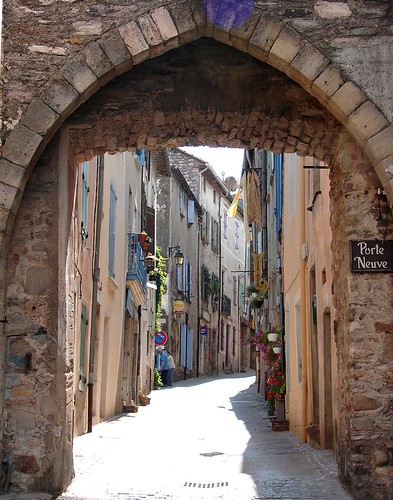
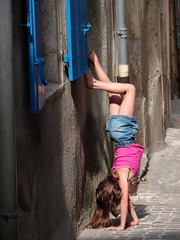
even in pretty villages, children play
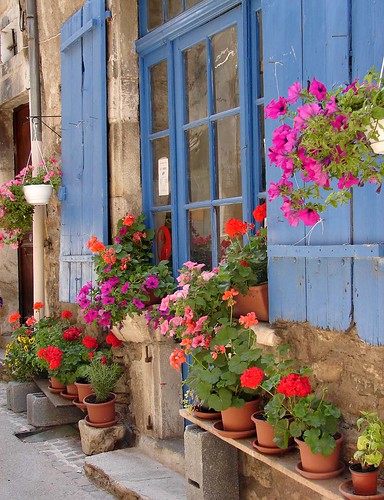
And the tourists come. It is worth a detour, the books say.
Initially, I set out to disprove Olargues' worth. But I cave after I step into a bakery for an afternoon snack. They have the best madeleines in the world, ones that would make Proust jump out of bed for more. I mellow after that.
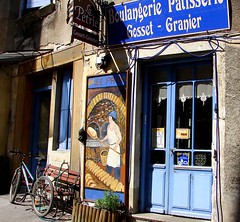
But do not misunderstand (Side Story follows): in my heart, I am with Pierrerue. Pierrerue cares deeply about keeping itself nice and tidy, even though it cannot compete with medieval villages perched on mountains. It cares about its one street. It cares about its Mairie, about its little church. And it cares about its garbage.
Here’s how I know: I had been environmentally friendly, I thought and I had been saving my little plastic bags from market trips and using them as trash can liners. True, the bags are small, but so is my kitchen trash can.
Because the garbage dumpsters are a bit of a walk, I pushed the limits: I filled the damn things pretty tightly before carrying them down.
Two days ago, a neighbor came by. She said she wanted to give me my allotment of garbage bags, courtesy of the village of Pierrerue.
As compared to the absolutely neat blue bags of garbage in the village bins, nicely tied and securely holding in all garbage, my little market bags must have been an eyesore. I cannot be certain, but I am thinking they had a village meeting. And someone had une idée: give Madame Nina some bags, call it an allotment and let’s see what she does.
I got the nudge. The bins are spotless once again. Even the weeds growing around them are inviting.
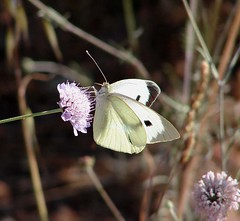
weeds and butterflies
Second story:
There is an old farmhouse outside one of the mountain towns just half an hour away from Pierrerue (that town’s rating: one star, which means it’s okay, but not worth a detour).
The farmhouse has been converted into an inn. I went there to eat dinner.
The owner, Monsieur Gilles, is an art collector and he displays paintings of local artists in a little gallery to the side. I was smitten by some pieces, especially those painted by a woman by the name of Pamella, so much so that I took a tiny something of hers home. Delighted with my appreciation of his collection, Monsieur Gilles took me around the inn, pointing out paintings that he had been especially commissioned to fit into some demanding wall spaces.
My mother does not like it that I am replacing the old stuff. She says the old decorations have been here for years! I tell her, that’s the problem: they have been here for years! (Monsieur Gilles is, I would guess, in his late fifties and so I am glad he no longer listens to his mother.)
Dinner was wonderful. The home made paté with Muscat jelly, the scallops with braised endive, the six cheeses, chocolate cakes, cookies, all of it fantastic (and all courses together, costing less than just one main dish at Madison’s upscale restaurants). Monsieur Gilles and I hit it off. I like the food, I like the paintings, what more can one ask of your guests. In return, he fusses and brings a shawl for me when he thinks the night air is getting too cool. Hearing that I was born in Poland, he puts on Chopin’s Nocturnes as background music.
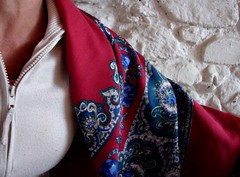
And at the end, Monsieur Gilles snips a beautiful rose from the garden and brings it to my table along with the little picture done by Pamella. He presents me with both and tells me that my credit card isn’t going through the machine, but not to worry, if it does it does, if it does not – so be it.
He walks me to the car, plants a kiss and I drive away, puffed up and determined to wear something other than a denim skirt and a zip-up hoodie next time I go out.
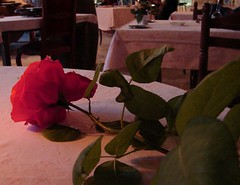
a rose is a rose
Late in the afternoon I drive to the village of Olargues. It is in the mountains north and west of here. Even the cherry trees give up by the time you get to it. Vineyards? No, not that either. I see signs in front of houses announcing the sale of honey, so I guess bees like it up here.
Bees and the Committee for the Selection of the Prettiest Villages of France (if such a committee there is).
I have said this before: France ranks and rewards most everything you could imagine. Food preparation alone is eligible for rosettes, forks, torques, stars, young chef awards (Alain of Atmospheres in the Savoie won one of those last year), oh you name it, they give it.
And villages as well: that one is worth one flower. Another: two. Olargues gets three stars and a designation: it belongs to the elite group of “Prettiest Villages.”
Pierrerue isn’t even rated, that’s how insignificant it is in the eyes of the Committee for the Selection of the Prettiest Villages of France.
For Olargues, I think it has become a self-fulfilling prophecy. Once adorned and adored, you start puffing yourself out (villages are like people in this respect). Flowers magically appear.



even in pretty villages, children play

And the tourists come. It is worth a detour, the books say.
Initially, I set out to disprove Olargues' worth. But I cave after I step into a bakery for an afternoon snack. They have the best madeleines in the world, ones that would make Proust jump out of bed for more. I mellow after that.

But do not misunderstand (Side Story follows): in my heart, I am with Pierrerue. Pierrerue cares deeply about keeping itself nice and tidy, even though it cannot compete with medieval villages perched on mountains. It cares about its one street. It cares about its Mairie, about its little church. And it cares about its garbage.
Here’s how I know: I had been environmentally friendly, I thought and I had been saving my little plastic bags from market trips and using them as trash can liners. True, the bags are small, but so is my kitchen trash can.
Because the garbage dumpsters are a bit of a walk, I pushed the limits: I filled the damn things pretty tightly before carrying them down.
Two days ago, a neighbor came by. She said she wanted to give me my allotment of garbage bags, courtesy of the village of Pierrerue.
As compared to the absolutely neat blue bags of garbage in the village bins, nicely tied and securely holding in all garbage, my little market bags must have been an eyesore. I cannot be certain, but I am thinking they had a village meeting. And someone had une idée: give Madame Nina some bags, call it an allotment and let’s see what she does.
I got the nudge. The bins are spotless once again. Even the weeds growing around them are inviting.

weeds and butterflies
Second story:
There is an old farmhouse outside one of the mountain towns just half an hour away from Pierrerue (that town’s rating: one star, which means it’s okay, but not worth a detour).
The farmhouse has been converted into an inn. I went there to eat dinner.
The owner, Monsieur Gilles, is an art collector and he displays paintings of local artists in a little gallery to the side. I was smitten by some pieces, especially those painted by a woman by the name of Pamella, so much so that I took a tiny something of hers home. Delighted with my appreciation of his collection, Monsieur Gilles took me around the inn, pointing out paintings that he had been especially commissioned to fit into some demanding wall spaces.
My mother does not like it that I am replacing the old stuff. She says the old decorations have been here for years! I tell her, that’s the problem: they have been here for years! (Monsieur Gilles is, I would guess, in his late fifties and so I am glad he no longer listens to his mother.)
Dinner was wonderful. The home made paté with Muscat jelly, the scallops with braised endive, the six cheeses, chocolate cakes, cookies, all of it fantastic (and all courses together, costing less than just one main dish at Madison’s upscale restaurants). Monsieur Gilles and I hit it off. I like the food, I like the paintings, what more can one ask of your guests. In return, he fusses and brings a shawl for me when he thinks the night air is getting too cool. Hearing that I was born in Poland, he puts on Chopin’s Nocturnes as background music.

And at the end, Monsieur Gilles snips a beautiful rose from the garden and brings it to my table along with the little picture done by Pamella. He presents me with both and tells me that my credit card isn’t going through the machine, but not to worry, if it does it does, if it does not – so be it.
He walks me to the car, plants a kiss and I drive away, puffed up and determined to wear something other than a denim skirt and a zip-up hoodie next time I go out.

a rose is a rose
posted by nina, 6/09/2006 04:25:00 AM
| link
| (2) comments
Thursday, June 08, 2006
from Pierrerue: drifting
You would think that I am supernaturally drawn to people who worry about food for a living. I seem to cross paths with them a lot, sometimes quite unintentionally.
Take, for instance, my (absent) landlord at Pierrerue. Would you have guessed that she, along with her Kenyan husband, runs one of the more successful restaurants down here, along the Canal du Midi? Indeed.
I stayed clear of the place the first week. I admit, I could not get myself excited about a place run by a pair of expats, basically from Britain. We all have our biases and mine run deep about the eating culture across the Channel.
But my neighbors here, at Pierrerue egged me on to try it. Phrases like “you have to” “it’s really wonderful” “it’s tiny, so book way in advance” kept coming up in idle conversation about the weather and so I finally broke down.
Booking a table for the evening around here means you show up well after eight or you are going to look like the biggest fool on the planet and you most certainly will be eating alone. Still, I was ready for a break at three in the afternoon and so I headed toward the Canal then, thinking I’d kill time biking around a bit.
The Office of Tourism at Capestang, the Canal-side town closest to Pourquoi Pas (the restaurant of my landlady), opened its doors again in the late afternoon, after a multi-hour lunch break. Perfect. I show up close to four and rent a bike.
You can return it tonight, by six – we close at six – or keep it until tomorrow.
I’ll be back in two hours. I cannot take the bike back to Pierrerue with me.
The path along the Canal is lovely. It strikes me as fun to follow it and get as far as the restaurant I am about to dine in. Can’t be too distant.
After an hour, I reflect on my progress. I’ve bounced around rocky and rooted terrain and still, I see nothing. But it could be just around the bend. ...lying 'round the bend, my Huckleberry friend... Let me keep going. I'll hustle like the winds on the return trip. Worst case scenario, I miss the return time, leave the bike at the restaurant and return it tomorrow.
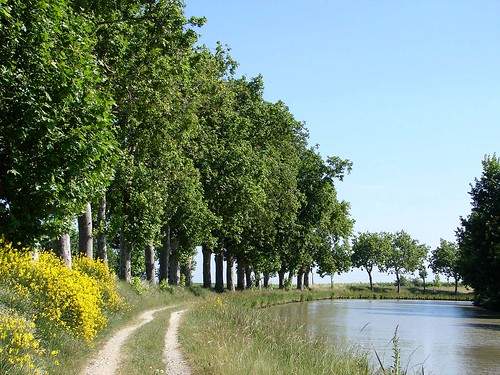
bucolic, fragrant, but slow going
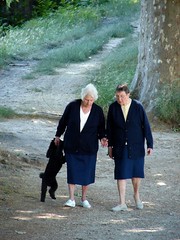
encountered: 2 women, 1 French poodle
Finally. I see it. I climb up on the bridge along with my Mr.B substitute and study it. There used to be stables here a long time ago, along this lonely stretch of the Canal. Now food is served to weary travelers like me.
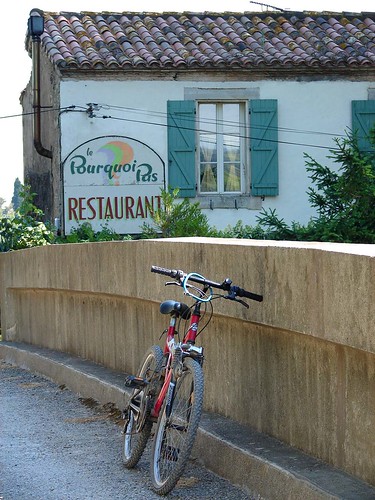
Mercifully there is a country road that winds back to Capestang so that I can put a little zip into the return trip to town and make it to the Office of Tourism just seconds before closing.
Madame is back!
What’s the big deal? A welcome that is disproportionate to the event. Did she think I’d fall into the Canal?
Madame walked away with the keys to my car! I would not be able to get home tonight if Madame did not return.
Oops.
The Pourquois Pas is indeed lovely, inside and out. Choose between a meat dish or a fish, but the rest is up to the chef. I am given an asparagus mousse and a guinea fowl, followed by cheeses and a flourless chocolate cake.
I talk to Kirsty throughout the evening and it is evident to me that the Purquois Pas will not be around forever. Steve, her husband, is a drifter, like I am. Raised in one culture, transported to another, finding a home in a third. …two drifters, off to see the world… She worked the barges for tourists … barges, I would like to go with you, I would like to sail the ocean blue… he trained as a chef. They met here, but are not ready to call this their final adventure.
There are people like that – who are always considering other possibilities, always rearranging their lives because something comes up that is worth stepping out of one’s routines for. There are people like that, I just don’t know too many.
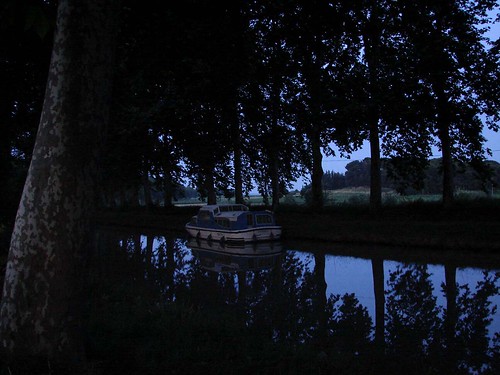
night drive back
Take, for instance, my (absent) landlord at Pierrerue. Would you have guessed that she, along with her Kenyan husband, runs one of the more successful restaurants down here, along the Canal du Midi? Indeed.
I stayed clear of the place the first week. I admit, I could not get myself excited about a place run by a pair of expats, basically from Britain. We all have our biases and mine run deep about the eating culture across the Channel.
But my neighbors here, at Pierrerue egged me on to try it. Phrases like “you have to” “it’s really wonderful” “it’s tiny, so book way in advance” kept coming up in idle conversation about the weather and so I finally broke down.
Booking a table for the evening around here means you show up well after eight or you are going to look like the biggest fool on the planet and you most certainly will be eating alone. Still, I was ready for a break at three in the afternoon and so I headed toward the Canal then, thinking I’d kill time biking around a bit.
The Office of Tourism at Capestang, the Canal-side town closest to Pourquoi Pas (the restaurant of my landlady), opened its doors again in the late afternoon, after a multi-hour lunch break. Perfect. I show up close to four and rent a bike.
You can return it tonight, by six – we close at six – or keep it until tomorrow.
I’ll be back in two hours. I cannot take the bike back to Pierrerue with me.
The path along the Canal is lovely. It strikes me as fun to follow it and get as far as the restaurant I am about to dine in. Can’t be too distant.
After an hour, I reflect on my progress. I’ve bounced around rocky and rooted terrain and still, I see nothing. But it could be just around the bend. ...lying 'round the bend, my Huckleberry friend... Let me keep going. I'll hustle like the winds on the return trip. Worst case scenario, I miss the return time, leave the bike at the restaurant and return it tomorrow.

bucolic, fragrant, but slow going

encountered: 2 women, 1 French poodle
Finally. I see it. I climb up on the bridge along with my Mr.B substitute and study it. There used to be stables here a long time ago, along this lonely stretch of the Canal. Now food is served to weary travelers like me.

Mercifully there is a country road that winds back to Capestang so that I can put a little zip into the return trip to town and make it to the Office of Tourism just seconds before closing.
Madame is back!
What’s the big deal? A welcome that is disproportionate to the event. Did she think I’d fall into the Canal?
Madame walked away with the keys to my car! I would not be able to get home tonight if Madame did not return.
Oops.
The Pourquois Pas is indeed lovely, inside and out. Choose between a meat dish or a fish, but the rest is up to the chef. I am given an asparagus mousse and a guinea fowl, followed by cheeses and a flourless chocolate cake.
I talk to Kirsty throughout the evening and it is evident to me that the Purquois Pas will not be around forever. Steve, her husband, is a drifter, like I am. Raised in one culture, transported to another, finding a home in a third. …two drifters, off to see the world… She worked the barges for tourists … barges, I would like to go with you, I would like to sail the ocean blue… he trained as a chef. They met here, but are not ready to call this their final adventure.
There are people like that – who are always considering other possibilities, always rearranging their lives because something comes up that is worth stepping out of one’s routines for. There are people like that, I just don’t know too many.

night drive back
posted by nina, 6/08/2006 07:15:00 AM
| link
| (0) comments
Wednesday, June 07, 2006
from Pierrerue: the thrill of color
My neighbors across the alley are artists. She paints, he sculpts. They aren’t the first northern French types to have settled here, in the south of France because of its climate, its light and its colors.
One hundred and one years ago another painter did the same and he brought with him a bunch of others and before you knew it, you had a movement. I am thinking of Matisse and the Fauves and their love of the light and colors of the small Mediterranean port of Collioure.
I am a fan of Matisse and the vibrant colors used by the Fauves, even if they did sort of displace my adored Impressionists who came before them. I mean, I do get that painters (people?) have to put forth new ideas through their art (their life?) and that to propose something new, you sometimes have to throw some punches at the old stuff.
My neighbor dabbles in the Fauve style. She says it is extremely difficult, but I think she is just saying that because I offered to take off her hands the wonderful little painting she did of Roquebrun and she is hesitating to part with it, claiming that great toil and sweat went into doing it. Perhpas. I do not argue with toil and sweat.
Yesterday, I went to Collioure, perhaps to get my fill of Fauve-like colors and perhaps to demonstrate to my neighbor, the artist, my deep appreciation for the Fauve style of painting. I am trying to stay in good with the artist couple, not only because of the painting issue, but because whispers of letting me stay in their beautiful little over-the-garage apartment next summer have been floating about and I want those whispers to become shouts and promises.
It’s a bit of a drive, as Collioure is just at the Spanish border. Even hopping onto the 80-plus mile per hour superhighway for a short stretch does not reduce the driving time much. It’s easily two hours each way. But, oh, am I glad I went.
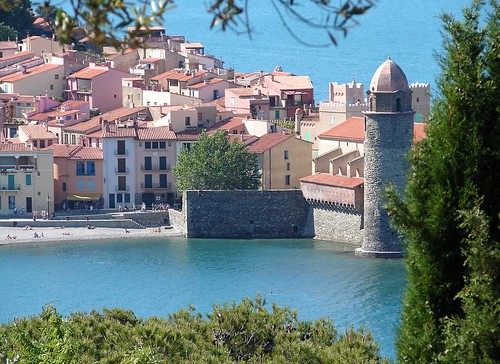
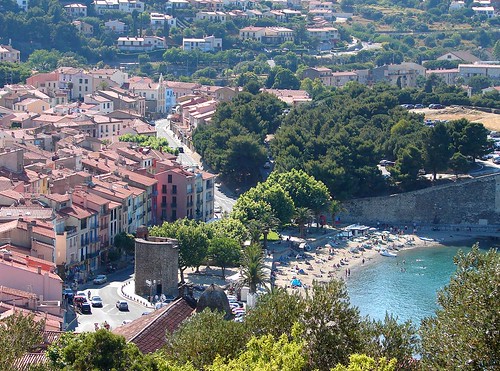
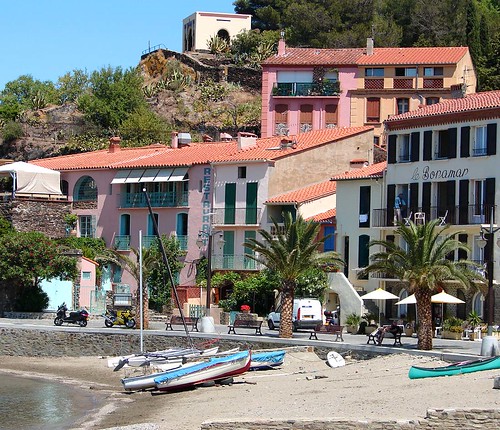
Of course, tourism is a big thing there now, but we are still in the early days of June and so the cafes are less crowded and the little beaches have only a small number of bathers – enough to provide people watching opportunities, but not enough to make the pebbly bays appear overrun by humankind.
The cafes spill out onto the beaches and I have to think that they are, later in the season, filled with foreign tourists who sit and count the number of women tanning their breasts just before them.
Here is one café that I especially liked as it seemed to require that you wear yellow and blue to sit on its yellow chairs underneath blue umbrellas.
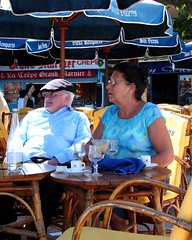
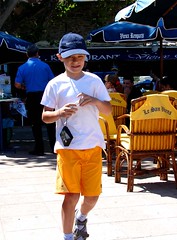
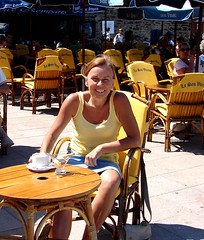
In the picture above, the woman in the denim skirt looks like she is eating jeune peche (yellow peach) ice cream. Fitting , given the color scheme.
I took a photo of where their gaze may have been directed to – or at least of one subject, a beach couple, clothed, but still doing the French thing.
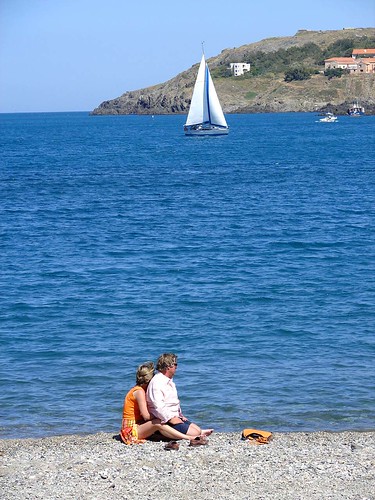
I also visited the tiny Museum of Modern Art here, but of course, all the great works of Matisse and Derain have been moved to Paris, which is understandable, but still a shame since they fit into this world of bright yellows, blues and reds.
Afterwards, I drove up the coast where the winds gust like crazy and provide yet another opportunity for French men to show off their athleticism. There is, not surprisingly, a popular wind surfing spot here and I watched for a while.
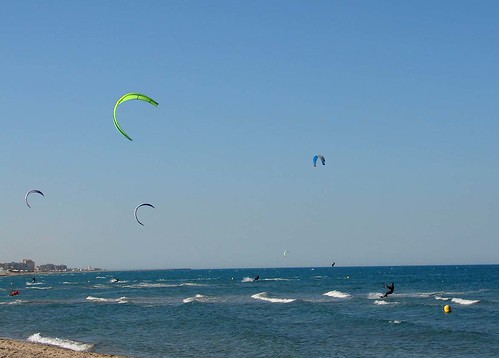
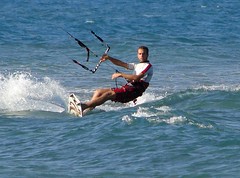
…and no, I was not tempted. Frankly, I found the following much more appealing and I made a mental note to soon return to a beach just to sit and engage in the art of doing nothing.
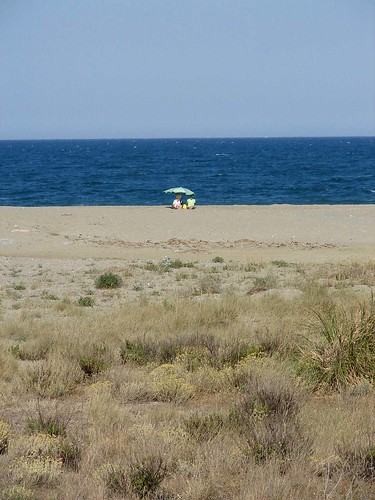
my speed
One hundred and one years ago another painter did the same and he brought with him a bunch of others and before you knew it, you had a movement. I am thinking of Matisse and the Fauves and their love of the light and colors of the small Mediterranean port of Collioure.
I am a fan of Matisse and the vibrant colors used by the Fauves, even if they did sort of displace my adored Impressionists who came before them. I mean, I do get that painters (people?) have to put forth new ideas through their art (their life?) and that to propose something new, you sometimes have to throw some punches at the old stuff.
My neighbor dabbles in the Fauve style. She says it is extremely difficult, but I think she is just saying that because I offered to take off her hands the wonderful little painting she did of Roquebrun and she is hesitating to part with it, claiming that great toil and sweat went into doing it. Perhpas. I do not argue with toil and sweat.
Yesterday, I went to Collioure, perhaps to get my fill of Fauve-like colors and perhaps to demonstrate to my neighbor, the artist, my deep appreciation for the Fauve style of painting. I am trying to stay in good with the artist couple, not only because of the painting issue, but because whispers of letting me stay in their beautiful little over-the-garage apartment next summer have been floating about and I want those whispers to become shouts and promises.
It’s a bit of a drive, as Collioure is just at the Spanish border. Even hopping onto the 80-plus mile per hour superhighway for a short stretch does not reduce the driving time much. It’s easily two hours each way. But, oh, am I glad I went.



Of course, tourism is a big thing there now, but we are still in the early days of June and so the cafes are less crowded and the little beaches have only a small number of bathers – enough to provide people watching opportunities, but not enough to make the pebbly bays appear overrun by humankind.
The cafes spill out onto the beaches and I have to think that they are, later in the season, filled with foreign tourists who sit and count the number of women tanning their breasts just before them.
Here is one café that I especially liked as it seemed to require that you wear yellow and blue to sit on its yellow chairs underneath blue umbrellas.



In the picture above, the woman in the denim skirt looks like she is eating jeune peche (yellow peach) ice cream. Fitting , given the color scheme.
I took a photo of where their gaze may have been directed to – or at least of one subject, a beach couple, clothed, but still doing the French thing.

I also visited the tiny Museum of Modern Art here, but of course, all the great works of Matisse and Derain have been moved to Paris, which is understandable, but still a shame since they fit into this world of bright yellows, blues and reds.
Afterwards, I drove up the coast where the winds gust like crazy and provide yet another opportunity for French men to show off their athleticism. There is, not surprisingly, a popular wind surfing spot here and I watched for a while.


…and no, I was not tempted. Frankly, I found the following much more appealing and I made a mental note to soon return to a beach just to sit and engage in the art of doing nothing.

my speed
posted by nina, 6/07/2006 07:25:00 AM
| link
| (3) comments
Tuesday, June 06, 2006
from Pierrerue: into the swim of things
It is morning. The bread lady comes. Marie-Rose runs to tell me, anxious, because last week I missed the delivery and everyone felt awful. To compensate, I buy way more bread than I need for the day.
You are going to the beach? The bread lady asks.
Now why would she say that? Ah, the shorts. No woman ever wears shorts here. Unless she is going to the beach.
No, no, I am going to Roquebrun. After work, this afternoon, I am renting a kayak and doing the rapids on the river Orb. I hope I will see you tomorrow.
Indeed. I have done a lot of kayaking in my life, but never on rapids.
The set up is well orchestrated. You rent a kayak or canoe (the difference amuses me; the boats are identical, only the paddle varies) for a half day or a full day. A van drops you and your boat up river (twice the distance for the full day) and you paddle down. Simple.
Except that there are rapids.
Here are two bins for your belongings. Put your things in the little one and put the little one into the big barrel. Shut it tight. Double protection.
Protection from what?
Do people roll over?
Yes, all the time. She looks surprised that I should ask.
I notice children are required to wear helmets. Why aren’t adults given double head protection? Our heads are bigger, there’s more to crack.
Are the rapids treacherous?
Medium. The bigger ones are on the full day.
Of course, the French bike up hills and mountains. What is medium to them is horrifically insane to me.
And what valuables should I put in my double bin protection? I took only my car keys and a ten Euro note, just in case I get stranded and have to bribe someone to help me out.
There is, however, the issue of the camera. And here is a cautionary note: you should not go solo in a kayak through rapids and expect to take photos. There you are, scraped and pounded from all sides by boulders, sprayed by water so that there is as much in your boat as outside of it – what does not belong (apart from, arguably, you)? The little Sony digital SLR. Especially outside its double bin protection.
But, I am stubborn. I want pictures. And so what follows is a combination of pulling up to the shore for a minute, paddling upstream to reconsider what just happened, finding quiet spaces, intersperesed with not a small amount of risk taking, whereby, through a series of rapid maneuvers, I quickly unscrew bins, take out camera, snap like crazy, throw it back inside, seal the damn barrels shut and continue, all in the space of 2 seconds. And so, I am able to indulge my stubbornness.
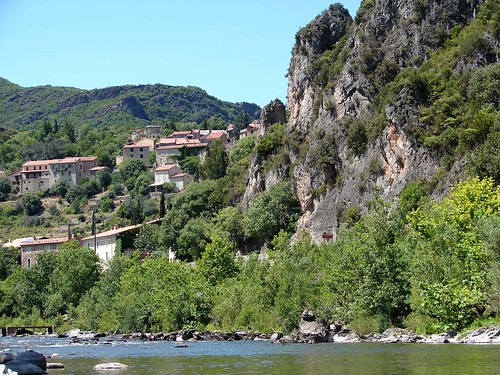
all is calm, views are grand
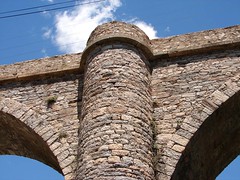
looking up...oops, heading into the bridge
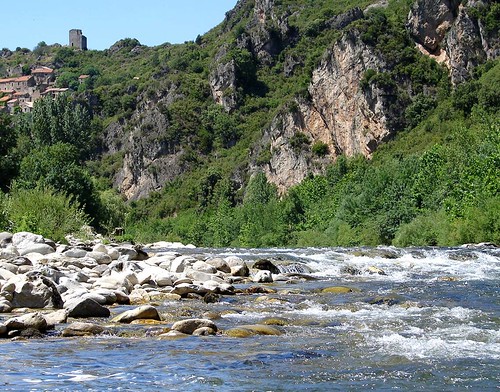
troubled waters
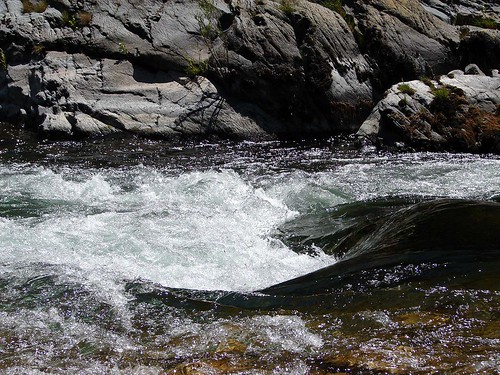
the plunge
Foolish? Perhaps.
But oh, the rewards!
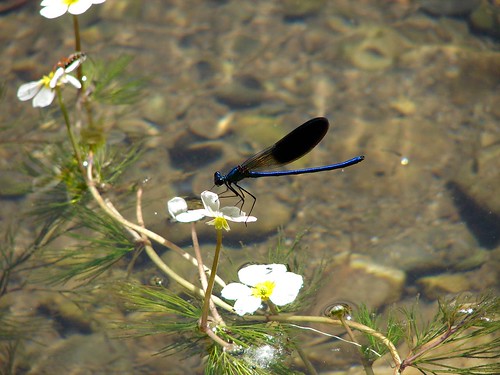
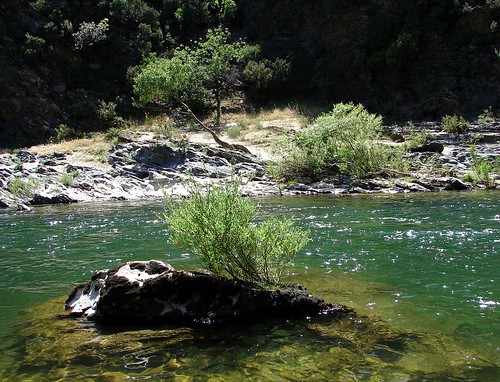
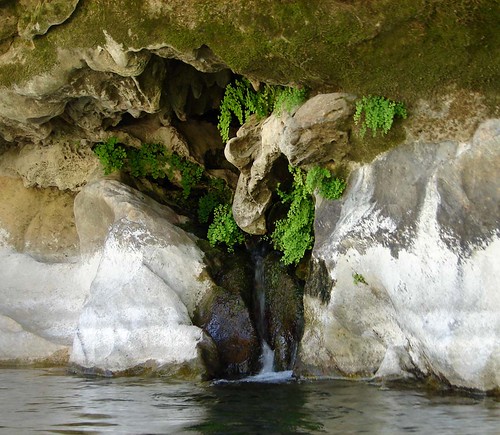
I had chatted earlier with someone who had done rapids and his advice was to paddle backwards and survey the rapid before you go in. Wonderful advice. True, in the end, I would conclude that the only way to survive is to paddle furiously right into the swirling mass of water and rock and hope for the best. I became quite good at the “paddle furiously into the swirling mass of water and rock” bit.
Indeed, my proudest moment happened when I approached a series of sharp bends between boulders. To the side, three young men were bathing. One was climbing out on a rock and I noticed he was completely naked, deeply tanned buttocks and all. This is France. I had encountered here and there the occasional swimmer, topless even, but men somehow managed to keep their skimpy pants on up to now.
As he sprawled on the rock, letting the sun dry off various parts of his magnificent body, he watched me approach the S curve. I plunged, back paddled, turned again, plunged and came out right side up, with only the usual tub full of water inside. The young man stood up and applauded. Well done, he shouted. I felt alive!
[Of course, ten minutes later, I wedged my kayak between two rocks, sideways and watched in horror as torrents of water came gushing in. The muscle I used to get me out of that mess needs at least a month’s rest.]
So why did I do it? Why risk losing a camera, nay, my life (okay, perhaps not that) on a brilliant Monday afternoon?
For this, the moment where I pull over to a shallow area, get out of the boat and, in shorts, tank top and running shoes, lie down in the water and watch the ripples form around my shoes:
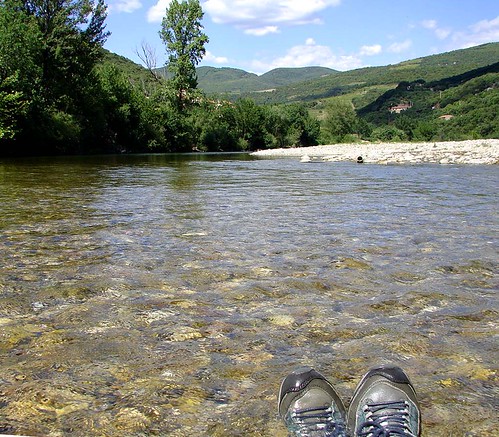
bliss
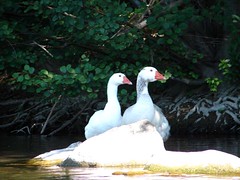
watching fools rush in
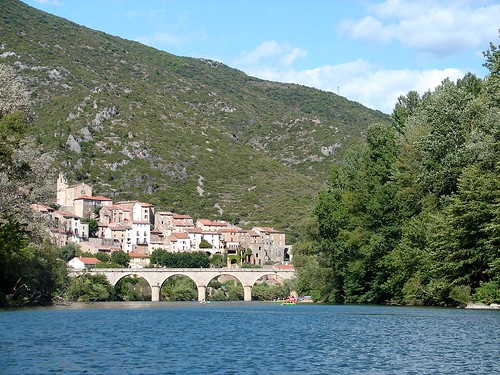
at the end, Roquebrun
You are going to the beach? The bread lady asks.
Now why would she say that? Ah, the shorts. No woman ever wears shorts here. Unless she is going to the beach.
No, no, I am going to Roquebrun. After work, this afternoon, I am renting a kayak and doing the rapids on the river Orb. I hope I will see you tomorrow.
Indeed. I have done a lot of kayaking in my life, but never on rapids.
The set up is well orchestrated. You rent a kayak or canoe (the difference amuses me; the boats are identical, only the paddle varies) for a half day or a full day. A van drops you and your boat up river (twice the distance for the full day) and you paddle down. Simple.
Except that there are rapids.
Here are two bins for your belongings. Put your things in the little one and put the little one into the big barrel. Shut it tight. Double protection.
Protection from what?
Do people roll over?
Yes, all the time. She looks surprised that I should ask.
I notice children are required to wear helmets. Why aren’t adults given double head protection? Our heads are bigger, there’s more to crack.
Are the rapids treacherous?
Medium. The bigger ones are on the full day.
Of course, the French bike up hills and mountains. What is medium to them is horrifically insane to me.
And what valuables should I put in my double bin protection? I took only my car keys and a ten Euro note, just in case I get stranded and have to bribe someone to help me out.
There is, however, the issue of the camera. And here is a cautionary note: you should not go solo in a kayak through rapids and expect to take photos. There you are, scraped and pounded from all sides by boulders, sprayed by water so that there is as much in your boat as outside of it – what does not belong (apart from, arguably, you)? The little Sony digital SLR. Especially outside its double bin protection.
But, I am stubborn. I want pictures. And so what follows is a combination of pulling up to the shore for a minute, paddling upstream to reconsider what just happened, finding quiet spaces, intersperesed with not a small amount of risk taking, whereby, through a series of rapid maneuvers, I quickly unscrew bins, take out camera, snap like crazy, throw it back inside, seal the damn barrels shut and continue, all in the space of 2 seconds. And so, I am able to indulge my stubbornness.

all is calm, views are grand

looking up...oops, heading into the bridge

troubled waters

the plunge
Foolish? Perhaps.
But oh, the rewards!



I had chatted earlier with someone who had done rapids and his advice was to paddle backwards and survey the rapid before you go in. Wonderful advice. True, in the end, I would conclude that the only way to survive is to paddle furiously right into the swirling mass of water and rock and hope for the best. I became quite good at the “paddle furiously into the swirling mass of water and rock” bit.
Indeed, my proudest moment happened when I approached a series of sharp bends between boulders. To the side, three young men were bathing. One was climbing out on a rock and I noticed he was completely naked, deeply tanned buttocks and all. This is France. I had encountered here and there the occasional swimmer, topless even, but men somehow managed to keep their skimpy pants on up to now.
As he sprawled on the rock, letting the sun dry off various parts of his magnificent body, he watched me approach the S curve. I plunged, back paddled, turned again, plunged and came out right side up, with only the usual tub full of water inside. The young man stood up and applauded. Well done, he shouted. I felt alive!
[Of course, ten minutes later, I wedged my kayak between two rocks, sideways and watched in horror as torrents of water came gushing in. The muscle I used to get me out of that mess needs at least a month’s rest.]
So why did I do it? Why risk losing a camera, nay, my life (okay, perhaps not that) on a brilliant Monday afternoon?
For this, the moment where I pull over to a shallow area, get out of the boat and, in shorts, tank top and running shoes, lie down in the water and watch the ripples form around my shoes:

bliss

watching fools rush in

at the end, Roquebrun
posted by nina, 6/06/2006 03:25:00 AM
| link
| (11) comments
Monday, June 05, 2006
from Pierrerue: red is the color of my true love’s tablecloth
Someone said this to me recently: your passion is food. Look at Ocean! You end each post with photos of dishes that delight you, you are enamored with the whole eating thing.
I think it was intended as a compliment, but I’m not sure.
But I think, at the very least, it is a simplification of things, as I come in contact with a lot of wonderful food and it leaves me cold.
It is the entirety that matters. Sure, the trees have to be beautiful but it is the forest that makes it or breaks it. And the forest is composed of the food, the setting, the mood – the terroir of eating!
An example: I love my morning croissant and café, eaten in the warm sun on the step outside my door at Pierrerue. It is a yoga-like experience for me (I mean, I imagine it is thus, since I don’t much do yoga; too much stretching and too little movement for restless me). And I equally adored the breakfasts at Dubrovnik where we would linger for hours out there on the patio, engaged in so much more than just the food.
Here, in the south of France, I have blogged variously about eating. St Chinian (the closest town with places to eat) has one pretty good dining spot. I was a little put off last time, because Madame brought me a glass of Muscat with dessert and I found later that the little sucker cost me almost as much as the entire meal, but still, I like the food just fine. But bliss requires more.
Yesterday, I found bliss. And I refer here not to the food (though the food was quite magnificent) but to the entire two and a half hour lunch experience.
It happened on a red tablecloth, hence the post title.
But let me not just write about the food. Indeed, let me put the food away for this post. You have been confused into thinking that this is the thing that matters and I intend to prove you wrong.
It started with an outing toward the mountain village of Mons la Trivalle. I am bordered by rocky hills and summits to the north and I have been waiting for a day to explore these. I had an excuse this Sunday. My market cheese man had told me he would be at Mons la Trivalle on this day for their annual cherry festival. Naturally, I saw this as an opportunity.
Cherry festival in the south of France. I don’t know what I thought. People coming out into the streets, adorned in crisp blouses with cherries embroidered on them? Cherry cakes, cherry everything sold, sampled, presented, to the tune of cherry melodies wafting over the village square?
My images were a little off. I can say this much: it was better than the Traverse City Michigan cherry festival which, in my time, I also attended. There, I literally saw not a single edible cherry. It was all about rides in those portable amusement parks and booths where you could win junk. Awful junk, awful festival.
In Mons la Trivalle they did put up an inflatable slide for kiddies. That is because in France they do not appear to believe in exorbitantly expensive playground equipment in every park and backyard and so that one inflatable slide was quite the novelty.
Apart from this, there were stands put up by locals with old family junk for sale – chipped plates that grandmere had, that kind of stuff.
And then there were, well, cherries. Lots and lots of cherries. At 2 – 3 Euro a kilo. Many varieties of cherries. And an occasional baked good with cherries.
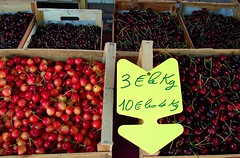
lots and lots of cherries
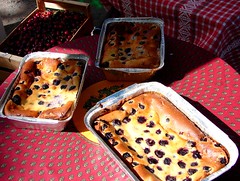
cherries here as well
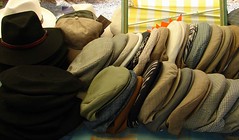
occasionally, something other than cherries
That is because, you guessed it, against the backdrop of these lovely rugged peaks they grow vines, of course, and cherries.
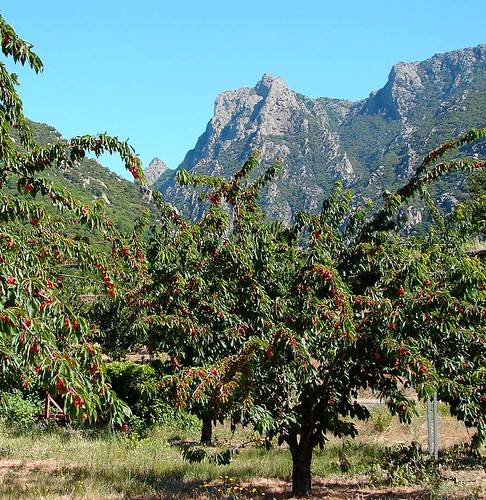
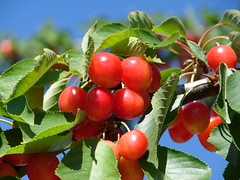
I had my fill of red sweet cherry fruit after a brief while. I was not even a fan of the village as it was the only place during my entire trip thus far, where I got a frown for my photo taking – from the baker!And after I had purchased my baguette, no less. He asked what on earth I was doing, I explained and he did say okay, but the damage was done. I hate him and his lousy bread. (In truth, he made some of the best baguettes I’ve tasted thus far and the competition is stiffer than stiff.)
So I slowly ambled back toward Berlou, a village just two down from Pierrerue (translates into a ten minute drive from where I live). There is where I booked a table for my Sunday afternoon dejeuner. The French eat big meals in the afternoon on this day and so shall I!
I did make several stops, having plenty of time on my hands and one notable stop was at Roquebrun – the only village in the vicinity that competes with Pierrerue as a place where I may want to hang out for an extended period of time, though it ultimately loses as it is on the summer tourist route and Pierrerue is on no one’s tourist route, nor will it ever be because there is nothing here to see.
Roquebrun is on the river Orb and it is stunning.
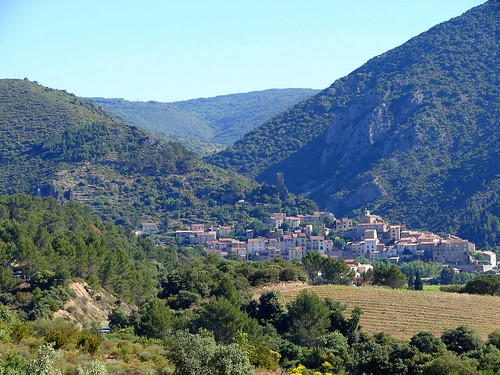
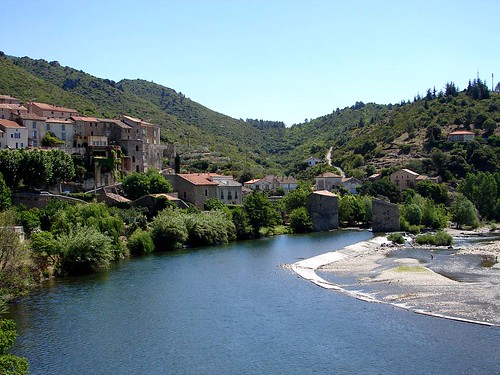
a river runs through it
Like Pierrerue, it has a microclimate that is pretty near Mediterranean by name and nature. It translates into constant sunshine, lesser winds and beautiful vegetation. More on that on a return visit. For now, just pause for a while and watch the families bring their children to the river on a Sunday afternoon, so that they can throw pebbles and step gingerly across the rocks.
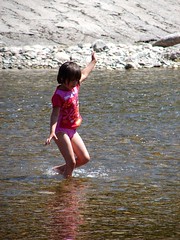
Okay, I am back on the road now, careening wildly to get to Berlou, as suddenly I am late. Too much idling away will do that to you.
I arrive at Faitout Restaurant. It is brand new. The proprietors, Frederic and Nathalie Revilla opened it just at the end of April. And to me, it is stunning.
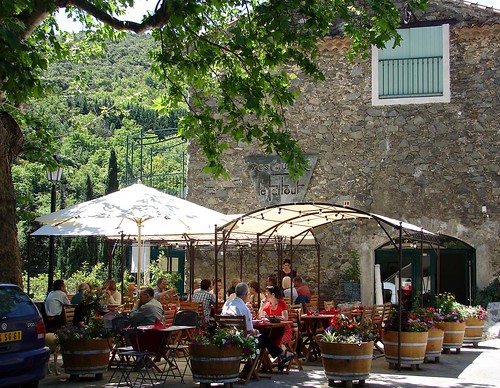
I mean, it has what I look for in a restaurant: it’ll be off somewhere, in its own quiet corner. It will have a casual air, a crispness, a vibrant feel. A clientele that loves food but also loves being there. A chef with charisma, a partner who knows when to ask you how things are and who answers your smile with her own.
It helps that the food is splendid, yes it does. But as I look at my notes from the lunch, they are not just about the food. Here are some:
Suddenly, chef Frederic flies out, hops onto his motorbike and whizzes away. The French table looks in the direction where he left. What has he forgotten? We hope he comes back! Suddenly, the entire terrace is laughing. He comes back. With fanfare.
The British table: a family with several adults and a toddler. I smile at the toddler, she smiles back. On the way out they come over and each say good bye to me. The mother is wearing Mephistos. A black bra strap is hanging down, a bobby pin is holding her hair back. She has been constantly rubbing sun screen on the delicate white skin of her girl. She speaks French haltingly, but she does try.
[My French neighbors at Pierrerue said this about the British here, around St. Chinian: they are different than those who have bought up great chunks of Provence. And I agree. This is not a moneyed crowd. There are no swimming pools, no villas, and no expensive stores or pretentious eateries that cater to them. The French here say that they like it this way. I do as well.]
The family of the proprietors arrives. The boy runs over, kisses his dad, his mom. The grandparents are here. I am thinking they will be eating as soon as the last guest leaves. A table is set, waiting. Still, Frederic is there, welcoming stragglers who come at 3:30 and ask only for a cup of coffee.
And so on.
Yes, I can end with a photo run of the food. But I wont. Instead, see if you can get a feel for the experience by these random shots of the red table cloth and the fleeting appearances of Frederic. Because really, these were the best hours of the day and stuffing food into my mouth occupied just a few minutes of that time.
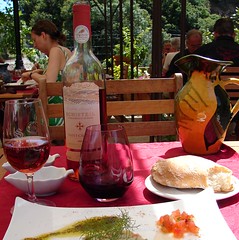
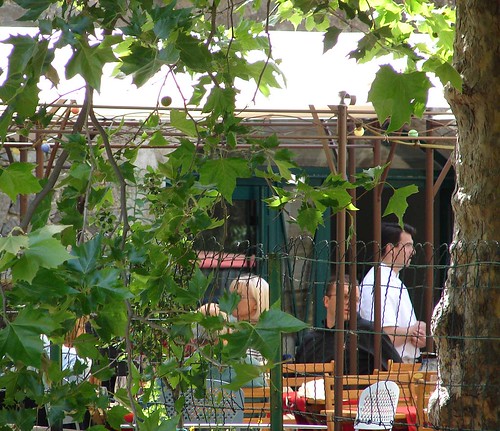
I think it was intended as a compliment, but I’m not sure.
But I think, at the very least, it is a simplification of things, as I come in contact with a lot of wonderful food and it leaves me cold.
It is the entirety that matters. Sure, the trees have to be beautiful but it is the forest that makes it or breaks it. And the forest is composed of the food, the setting, the mood – the terroir of eating!
An example: I love my morning croissant and café, eaten in the warm sun on the step outside my door at Pierrerue. It is a yoga-like experience for me (I mean, I imagine it is thus, since I don’t much do yoga; too much stretching and too little movement for restless me). And I equally adored the breakfasts at Dubrovnik where we would linger for hours out there on the patio, engaged in so much more than just the food.
Here, in the south of France, I have blogged variously about eating. St Chinian (the closest town with places to eat) has one pretty good dining spot. I was a little put off last time, because Madame brought me a glass of Muscat with dessert and I found later that the little sucker cost me almost as much as the entire meal, but still, I like the food just fine. But bliss requires more.
Yesterday, I found bliss. And I refer here not to the food (though the food was quite magnificent) but to the entire two and a half hour lunch experience.
It happened on a red tablecloth, hence the post title.
But let me not just write about the food. Indeed, let me put the food away for this post. You have been confused into thinking that this is the thing that matters and I intend to prove you wrong.
It started with an outing toward the mountain village of Mons la Trivalle. I am bordered by rocky hills and summits to the north and I have been waiting for a day to explore these. I had an excuse this Sunday. My market cheese man had told me he would be at Mons la Trivalle on this day for their annual cherry festival. Naturally, I saw this as an opportunity.
Cherry festival in the south of France. I don’t know what I thought. People coming out into the streets, adorned in crisp blouses with cherries embroidered on them? Cherry cakes, cherry everything sold, sampled, presented, to the tune of cherry melodies wafting over the village square?
My images were a little off. I can say this much: it was better than the Traverse City Michigan cherry festival which, in my time, I also attended. There, I literally saw not a single edible cherry. It was all about rides in those portable amusement parks and booths where you could win junk. Awful junk, awful festival.
In Mons la Trivalle they did put up an inflatable slide for kiddies. That is because in France they do not appear to believe in exorbitantly expensive playground equipment in every park and backyard and so that one inflatable slide was quite the novelty.
Apart from this, there were stands put up by locals with old family junk for sale – chipped plates that grandmere had, that kind of stuff.
And then there were, well, cherries. Lots and lots of cherries. At 2 – 3 Euro a kilo. Many varieties of cherries. And an occasional baked good with cherries.

lots and lots of cherries

cherries here as well

occasionally, something other than cherries
That is because, you guessed it, against the backdrop of these lovely rugged peaks they grow vines, of course, and cherries.


I had my fill of red sweet cherry fruit after a brief while. I was not even a fan of the village as it was the only place during my entire trip thus far, where I got a frown for my photo taking – from the baker!And after I had purchased my baguette, no less. He asked what on earth I was doing, I explained and he did say okay, but the damage was done. I hate him and his lousy bread. (In truth, he made some of the best baguettes I’ve tasted thus far and the competition is stiffer than stiff.)
So I slowly ambled back toward Berlou, a village just two down from Pierrerue (translates into a ten minute drive from where I live). There is where I booked a table for my Sunday afternoon dejeuner. The French eat big meals in the afternoon on this day and so shall I!
I did make several stops, having plenty of time on my hands and one notable stop was at Roquebrun – the only village in the vicinity that competes with Pierrerue as a place where I may want to hang out for an extended period of time, though it ultimately loses as it is on the summer tourist route and Pierrerue is on no one’s tourist route, nor will it ever be because there is nothing here to see.
Roquebrun is on the river Orb and it is stunning.


a river runs through it
Like Pierrerue, it has a microclimate that is pretty near Mediterranean by name and nature. It translates into constant sunshine, lesser winds and beautiful vegetation. More on that on a return visit. For now, just pause for a while and watch the families bring their children to the river on a Sunday afternoon, so that they can throw pebbles and step gingerly across the rocks.

Okay, I am back on the road now, careening wildly to get to Berlou, as suddenly I am late. Too much idling away will do that to you.
I arrive at Faitout Restaurant. It is brand new. The proprietors, Frederic and Nathalie Revilla opened it just at the end of April. And to me, it is stunning.

I mean, it has what I look for in a restaurant: it’ll be off somewhere, in its own quiet corner. It will have a casual air, a crispness, a vibrant feel. A clientele that loves food but also loves being there. A chef with charisma, a partner who knows when to ask you how things are and who answers your smile with her own.
It helps that the food is splendid, yes it does. But as I look at my notes from the lunch, they are not just about the food. Here are some:
Suddenly, chef Frederic flies out, hops onto his motorbike and whizzes away. The French table looks in the direction where he left. What has he forgotten? We hope he comes back! Suddenly, the entire terrace is laughing. He comes back. With fanfare.
The British table: a family with several adults and a toddler. I smile at the toddler, she smiles back. On the way out they come over and each say good bye to me. The mother is wearing Mephistos. A black bra strap is hanging down, a bobby pin is holding her hair back. She has been constantly rubbing sun screen on the delicate white skin of her girl. She speaks French haltingly, but she does try.
[My French neighbors at Pierrerue said this about the British here, around St. Chinian: they are different than those who have bought up great chunks of Provence. And I agree. This is not a moneyed crowd. There are no swimming pools, no villas, and no expensive stores or pretentious eateries that cater to them. The French here say that they like it this way. I do as well.]
The family of the proprietors arrives. The boy runs over, kisses his dad, his mom. The grandparents are here. I am thinking they will be eating as soon as the last guest leaves. A table is set, waiting. Still, Frederic is there, welcoming stragglers who come at 3:30 and ask only for a cup of coffee.
And so on.
Yes, I can end with a photo run of the food. But I wont. Instead, see if you can get a feel for the experience by these random shots of the red table cloth and the fleeting appearances of Frederic. Because really, these were the best hours of the day and stuffing food into my mouth occupied just a few minutes of that time.


posted by nina, 6/05/2006 05:25:00 AM
| link
| (2) comments
Sunday, June 04, 2006
from Pierrerue: the games men play
I had heard that two villages down from Pierrerue, they were having a Petanque concurs today.
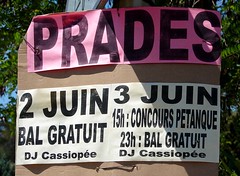
Independently, I had heard that Pierrerue men and men from villages further down regarded themselves as Petanque champs. Put a Pierrerue guy next to one from, say Capestang (south of here) or Roquebrun (a bit more north) and my villager will beat the pants off of either one.
Speaking of pants, in a comment to a post below, Ann had wondered if men around here wore short pants. I had an answer for her, just from looking around markets and café bars, but what better place to test this than in a gathering of men.
For Petanque is a game for men. And boys. (It’s not a rule, it’s just the way it is. I was asked several times if I would like to try, but I know not to place my skirt where it does not belong.) They start young. Here’s someone who knew how to handle the balls:
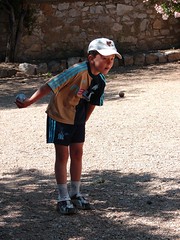
Back to pants. I have yet to see a single woman, young or old, in short pants of any sort. It’s all about skirts for the madame and the teeny set does the American jeans thing. So that the local girls who came out on their motorbikes to root for their boys, looked like this:
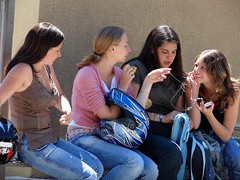
Men, on the other hand, young and old (by old, I mean older than me, of course) are heavily into cropped pants.
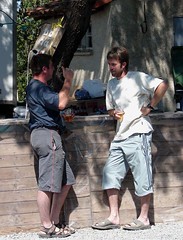
So this is the scene: they show up, they greet: salut! -- for the casual acquaintance, a handshake for the better pal and always kisses (yes, between men as well) on both cheeks for the "known you all my life" sort. And these are not air kisses, these are loud smackers to be heard a block away.
They stand around and talk (this takes a while), holding their boules behind their back. [There is a stance that is adopted – it is the man with boules stance and it looks like this:]
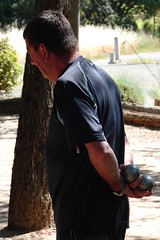
And then they play. They form teams. Here are the scorekeepers:
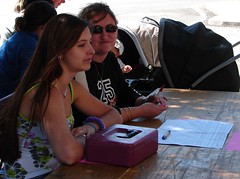
And then, in every corner, in the courtyard, in the gravel parking lot, in front of the Mairie, they start their games. Young and old, in mixed teams. Such grace there is in tossing that ball, to get it closer to the little tiny speck of a ball up ahead!
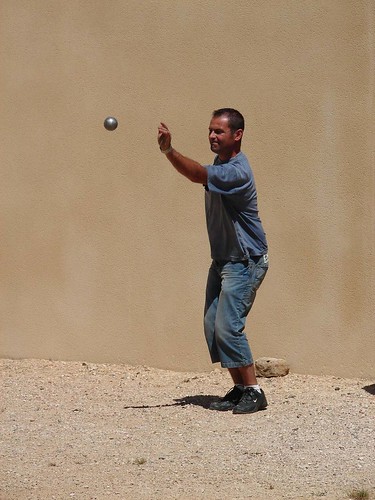
I had to smile thinking back to my loft in Madison. In front of it, they built a Petanque court. I do not know what they were thinking. No one I know in Madison knows how to play Petanque. My landlord bragged how it’s regulation size. It is finely graded and graveled.
Here, in the small village of Prades in Southern France, no one cares about finely graded and graveled. The gravel is uneven, they mark the starting line with their foot and they manifest such skill in tossing that thing about that you cannot tear yourself away from watching.
But I did eventually turn away. The games went on for a long time, aided by a makeshift stand where soft drinks, wine and beer were sold by the glass (wine was cheapest, beer was the priciest).
Hiking back up the hill to Pierrerue, I passed the usual assortment of grape vines and stunning terrain, but what stood out and deserved a photo was the sight of a man working the fields on this brilliant day. Salut to you, too. Sorry you could not join the rest.
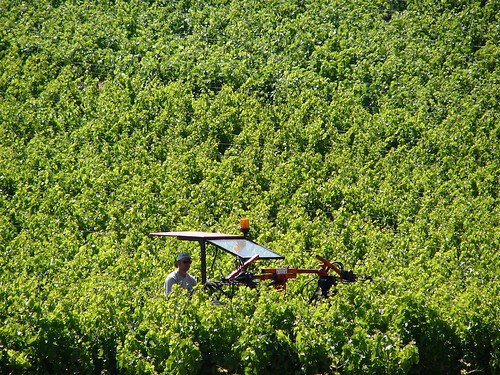
In Pierrerue, I found that at least a handful of men from my village had scorned the games of the neighbors. They were in front of the Mairie, engaged in their own Saturday routine. I watched and took a photo or two. They liked the attention. They bantered and egged each other on about messing up for the madame with the camera.
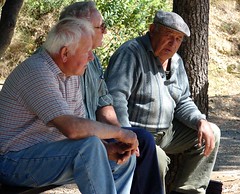
the men of Pierrerue
In the early evening I took the car down to St. Chinian. I needed a baguette for my dinner of a calamari salad back home. I passed the village square and remembered that I had arrived at this time exactly a week ago. I had noticed the older men and the boules then and here they were again. I stopped and watched. Is it Petanque as well? No, explained one. This is Boules Lyonaise. Played not on gravel but on packed dirt. It’s all about precision here. A guy marks spots carefully and measures distances with a marker.
I am told they have been playing for years. Petanque -- that’s just for fun. This is serious stuff. It used to be that every village had a Lyonaise team and there would be real competitions. Now, its’ mostly just in the towns, like St Chinian.
They don’t play boules in America? He asked, surprised.
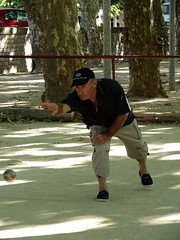
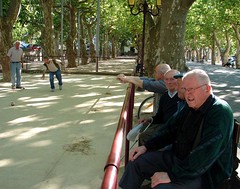

Independently, I had heard that Pierrerue men and men from villages further down regarded themselves as Petanque champs. Put a Pierrerue guy next to one from, say Capestang (south of here) or Roquebrun (a bit more north) and my villager will beat the pants off of either one.
Speaking of pants, in a comment to a post below, Ann had wondered if men around here wore short pants. I had an answer for her, just from looking around markets and café bars, but what better place to test this than in a gathering of men.
For Petanque is a game for men. And boys. (It’s not a rule, it’s just the way it is. I was asked several times if I would like to try, but I know not to place my skirt where it does not belong.) They start young. Here’s someone who knew how to handle the balls:

Back to pants. I have yet to see a single woman, young or old, in short pants of any sort. It’s all about skirts for the madame and the teeny set does the American jeans thing. So that the local girls who came out on their motorbikes to root for their boys, looked like this:

Men, on the other hand, young and old (by old, I mean older than me, of course) are heavily into cropped pants.

So this is the scene: they show up, they greet: salut! -- for the casual acquaintance, a handshake for the better pal and always kisses (yes, between men as well) on both cheeks for the "known you all my life" sort. And these are not air kisses, these are loud smackers to be heard a block away.
They stand around and talk (this takes a while), holding their boules behind their back. [There is a stance that is adopted – it is the man with boules stance and it looks like this:]

And then they play. They form teams. Here are the scorekeepers:

And then, in every corner, in the courtyard, in the gravel parking lot, in front of the Mairie, they start their games. Young and old, in mixed teams. Such grace there is in tossing that ball, to get it closer to the little tiny speck of a ball up ahead!

I had to smile thinking back to my loft in Madison. In front of it, they built a Petanque court. I do not know what they were thinking. No one I know in Madison knows how to play Petanque. My landlord bragged how it’s regulation size. It is finely graded and graveled.
Here, in the small village of Prades in Southern France, no one cares about finely graded and graveled. The gravel is uneven, they mark the starting line with their foot and they manifest such skill in tossing that thing about that you cannot tear yourself away from watching.
But I did eventually turn away. The games went on for a long time, aided by a makeshift stand where soft drinks, wine and beer were sold by the glass (wine was cheapest, beer was the priciest).
Hiking back up the hill to Pierrerue, I passed the usual assortment of grape vines and stunning terrain, but what stood out and deserved a photo was the sight of a man working the fields on this brilliant day. Salut to you, too. Sorry you could not join the rest.

In Pierrerue, I found that at least a handful of men from my village had scorned the games of the neighbors. They were in front of the Mairie, engaged in their own Saturday routine. I watched and took a photo or two. They liked the attention. They bantered and egged each other on about messing up for the madame with the camera.

the men of Pierrerue
In the early evening I took the car down to St. Chinian. I needed a baguette for my dinner of a calamari salad back home. I passed the village square and remembered that I had arrived at this time exactly a week ago. I had noticed the older men and the boules then and here they were again. I stopped and watched. Is it Petanque as well? No, explained one. This is Boules Lyonaise. Played not on gravel but on packed dirt. It’s all about precision here. A guy marks spots carefully and measures distances with a marker.
I am told they have been playing for years. Petanque -- that’s just for fun. This is serious stuff. It used to be that every village had a Lyonaise team and there would be real competitions. Now, its’ mostly just in the towns, like St Chinian.
They don’t play boules in America? He asked, surprised.


posted by nina, 6/04/2006 01:25:00 PM
| link
| (4) comments
Saturday, June 03, 2006
from Pierrerue: no choice but to go
And what can’t you resist? People talk about chocolate, wine, an adoring lover, volumes have been written about giving in to temptations of all sorts.
I can turn my back on it all. I have will power. I can not enter French shoe stores if I must, I can skip the aperitif, the cappuccino. It would be hard, but I can do it.
But bring out the sun, point to an empty road leading through vineyards to the sea and I am on it.
At least I stopped work closer to three, a little better than noon the previous day. But I did not admit to myself what I was doing. It was a windy day and I cannot emphasize this enough – when the winds blow through here, they really blow. So I thought I’d just head out for a little drive. Maybe to a town a little south of here, maybe for a simple pleasure of a café, somewhere in a pretty setting. (St. Chinian’s cafes are not remarkable in this respect; they spill out onto the street alright, exactly at the intersection of the busiest road so that you can basically watch the trucks and tractors race by.)
Oh, indeed, it was a beautiful ride! Let me show you:
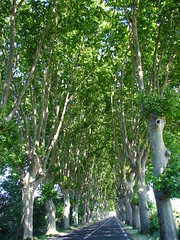
road beckons
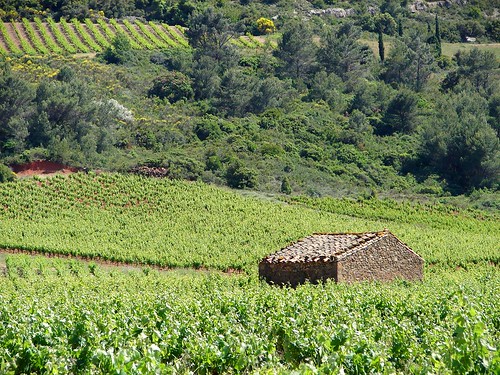
one of many
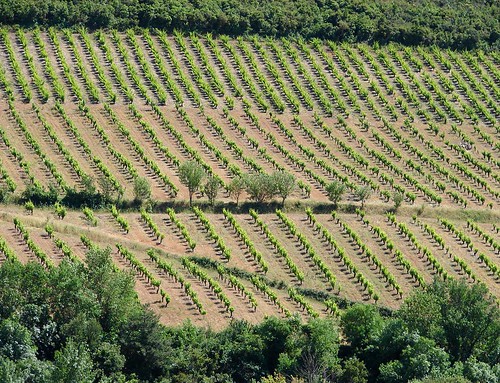
rows and rows
I noticed myself passing the town I was supposed to visit. In fact, deliberately, I took a road that headed around it. I am just not ready to get out, I told myself, even though it was nearing five.
But what’s this that I see, there behind the vineyard? Water?
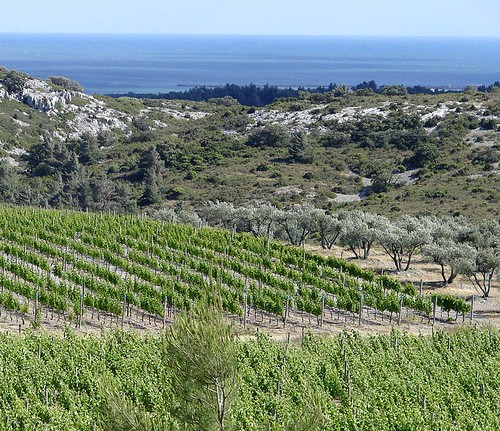
vines, olives, sea
Oh that damn Mediterranean! How dare you throw yourself in my path! Out I go, feeling the indescribably wonderful sensation of gusts of warm wind on the water’s edge.
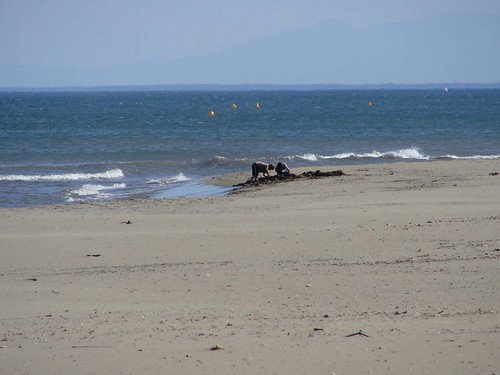
sandcastles
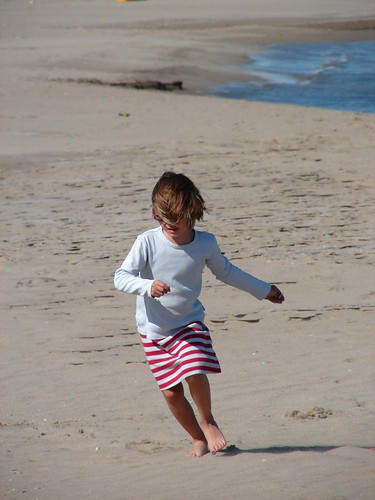
she reminded me of certain little ones I know
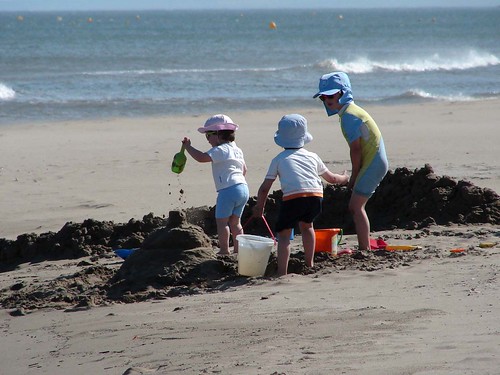
sandcastles, against the wind
Someone (you know who you are) asked for an Ocean author photo update. Sure, I look different these days. The hair is streaked by the sun, it’s longer, in a bun to keep it from going crazy in the winds, the skin is darker of course, the denim skirt is faded from overuse. And there’s this look of satisfaction that I have. Here, forget the lovely backdrop of the parked cars. You told me to ask a waiter to take a photo, so I did. This is what he chose to frame:
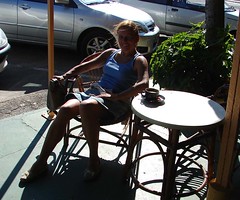
It was late when I left this beachfront (it was alongside a tiny and colorful seaside community). I couldn’t get myself up and going. Though the idea of a road in the early evening, passing past vineyards, and inevitably, the Canal du Midi (the Canal separates me from the southern most coast) finally revved me up.
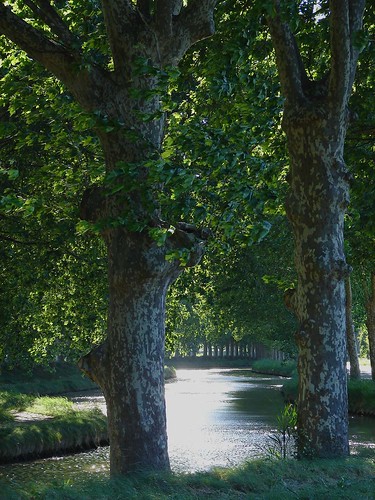
Dinner? Time to make a return to my local La Caleche. Let me just post the appetizer and dessert. Though I ate everything in between as well. You know, it’s the sea – it works up the appetite.
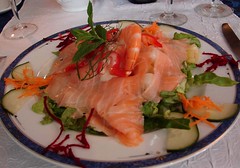
first course
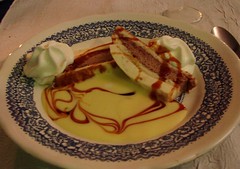
last course
I can turn my back on it all. I have will power. I can not enter French shoe stores if I must, I can skip the aperitif, the cappuccino. It would be hard, but I can do it.
But bring out the sun, point to an empty road leading through vineyards to the sea and I am on it.
At least I stopped work closer to three, a little better than noon the previous day. But I did not admit to myself what I was doing. It was a windy day and I cannot emphasize this enough – when the winds blow through here, they really blow. So I thought I’d just head out for a little drive. Maybe to a town a little south of here, maybe for a simple pleasure of a café, somewhere in a pretty setting. (St. Chinian’s cafes are not remarkable in this respect; they spill out onto the street alright, exactly at the intersection of the busiest road so that you can basically watch the trucks and tractors race by.)
Oh, indeed, it was a beautiful ride! Let me show you:

road beckons

one of many

rows and rows
I noticed myself passing the town I was supposed to visit. In fact, deliberately, I took a road that headed around it. I am just not ready to get out, I told myself, even though it was nearing five.
But what’s this that I see, there behind the vineyard? Water?

vines, olives, sea
Oh that damn Mediterranean! How dare you throw yourself in my path! Out I go, feeling the indescribably wonderful sensation of gusts of warm wind on the water’s edge.

sandcastles

she reminded me of certain little ones I know

sandcastles, against the wind
Someone (you know who you are) asked for an Ocean author photo update. Sure, I look different these days. The hair is streaked by the sun, it’s longer, in a bun to keep it from going crazy in the winds, the skin is darker of course, the denim skirt is faded from overuse. And there’s this look of satisfaction that I have. Here, forget the lovely backdrop of the parked cars. You told me to ask a waiter to take a photo, so I did. This is what he chose to frame:

It was late when I left this beachfront (it was alongside a tiny and colorful seaside community). I couldn’t get myself up and going. Though the idea of a road in the early evening, passing past vineyards, and inevitably, the Canal du Midi (the Canal separates me from the southern most coast) finally revved me up.

Dinner? Time to make a return to my local La Caleche. Let me just post the appetizer and dessert. Though I ate everything in between as well. You know, it’s the sea – it works up the appetite.

first course

last course
posted by nina, 6/03/2006 05:35:00 AM
| link
| (2) comments
Friday, June 02, 2006
from Pierrerue: touching stories
There’s no question. When you are an outsider, you must be careful in the messages you send and receive.
Only, how do you figure out what it all means?
Through making mistakes, of course.
I go outside at 9:30 to wait for the bread lady. My next door neighbor, the adorable, wonderful Madame Marie-Rose (not her real name, but it is of the genre) comes out as well. She is friendly, inquisitive. She likes that I speak some version of French. She groups visitors around here into those who do and those who don’t.
I ask about the village notice announcing a forthcoming Fete, a celebration. I tell her I would like to go and she is delighted. She invites me to her house. I glance around, quickly, trying not to take in too much detail. It is very traditional, with dark wood commodes and tables. I tell her it’s lovely.
It is modest, nothing fancy, she says, searching for a piece of paper to write down the Fete information.
On June 10th we will go down together. It is by the Mairie (every village and town in France has a mairie, where records are kept and bureaucratic nightmares are resolved).
It is for young people, but we all come.
With each point, she touches my arm, my hand – it is the way of people here. Everyone touches.
You know about our boucherie-charcouterie?
No...
He comes in a truck, Thursday, today, at 2. He has everything! Meats, sausages – such sausages! Everything.
I really did not imagine myself to be cooking up a meat storm, here in my tiny kitchen of my tiny castle corner, but I want to project gratitude and friendliness and so I express great joy in this.
I will come get you when he is here. He comes right outside my door.
At once my afternoon plans are changing. No longer am I going to be down in St Chinian eating a hearty lunch at Mme Suzanne’s, I will be here, with Mme Marie-Rose buying meat. The price of friendship.
I pause in my work to amble down to the Thursday market. I need cherries, strawberries, tomatoes, one of those sweet tiny French melons, I check off mentally items to look out for, pick up my basket, park the car outside the city center and walk over.
The market is smaller on Thursdays and far less crowded. The British are visibly absent. Maybe they eat pasties and mashers other days.
By noon, the farmers are anxious to unload and get going.
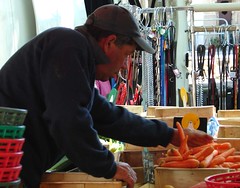
my veggies man
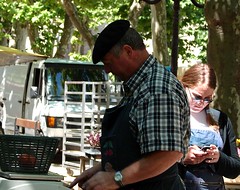
my cherries and tomatoes duo
I wait in line for my turn at the weigh-in and a friendly guy with a fantastic moustache and a gold chain around his dark neck turns to me and shows me the enormous head of garlic he is purchasing.
It’s healthy! You should buy one. You mash it up, mix it with oil, cook up fish, potatoes, fantastic!
I smile, mumble something and turn to the vendor.
But it strikes me that he is right. These garlic heads here are huge and most likely extremely flavorful. And so I purchase one.
I walk away from the stand and think – what the hell am I going to do with a garlic head this size? I’m not going to chomp on raw garlic cloves. I need stuff with them.
And so I add eggplant, zucchini, onion, tomatoes, and then of course olive oil. And I pass this stand:
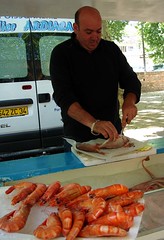
my fish guy
… and so I purchase some of those as well.
One head of garlic later, my basket is full.
As I leave the market, I encounter my garlic pusher.
I wave and dangle the garlic, indicating that I listened.
He scoots right over and talks about the virtues of garlic. He is a furniture maker and, along with his son, he is selling chairs.
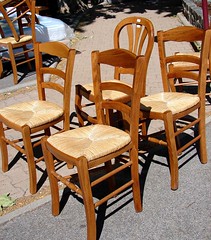
I admire them. I do find them pretty. Had I a house that needed chairs and I lived here, I would consider buying one. But I don’t and I tell him that transporting said chair to America would be a project.
America? You are from America? Are you with a group?
Imagine the improbable: a tour bus full of Americans in little St. Chinian. Imagine, me on that bus. Horrified at the idea, I tell him:
No, I am not! I’m alone! (mistake no.1)
He whips out his card and shows me where his furniture workshop is located. His accent is so thick that I can barely understand him. He appears to be saying that I should visit his workshop. He underlines the name of the village it is in. Not too far, he assures me.
I smile politely and explain that I do not know where it is and besides I do not really live here, I am in Pierrerue.
He looks puzzled. Pierre-what? Write it down.
Pierrerue is a mouthful. Locals must say it differently. I write it down. (mistake no.2)
He goes on about his furniture, explains that the card is his son’s and his name is really Felix. He crosses out his son’s name and writes in Felix. And then says:
Your name?
I am sure that we are politely exchanging names after a protracted conversation about garlic and furniture and so I write down my name (mistake no. 3; indeed, I have singularly violated my motto of the other day).
I will come visit you!
A look of horror crosses my face. I am in possession of my wits. He asks for my phone number, I tell him I do not have a phone. Nor a street number.
But really, everyone in Pierrerue knows of me. To find the American staying there, alone? Tres simple!
I retreat, believing that Felix is not actually going to drive his truck over to Pierrerue and inquire about the sole American living there, but I have to wonder how our casual conversation turned into this.
I walk hunched over, feeling like I did on the day I lost my passport. I goofed. The oomph is out of me.
I pass a mail carrier. In her twenties, she is spry and lively, bouncing from door to door with her deliveries. As I pass her she says the obligatory “bonjour madame!”
She looks at me and asks: do you have far to walk? Can I help you carry those?
My God! The mail carrier has just offered to take my bundles for me! I best put zip back into my step.
But I know it’s not that – it’s the hierarchy of village life. A woman my age is treated with respect, with deference. Her impulse was exactly right. She would, without hesitation, interrupt her work to assist someone older than her.
In the afternoon, Madame Marie-Rose is climbing over the fence at the back of my stone hut, trying to find me, to let me know the meat truck is here. I am glad I decided to stay for it.
She buys meat for the week. It is clearly a staple of her diet. She buys more meat than I eat in a month.
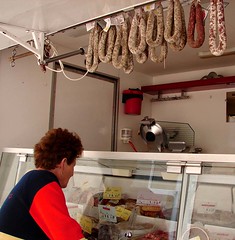
Madame studies the meats
The seller could not be a sweeter man. He sings loudly about love and a broken heart as he chops steaks and sausages. Marie-Rose says he is Dominique and has been driving his truck for decades.
I admire photos plastered to the back of his truck. Dominique is dressed as a cow and he has toddlers in his arms.
Grandchildren. Marie-Rose explains. Dominique is a very young grandfather.
Dominique winks and laughs and when I take a photo, he puckers his lips and throws kisses my way. Innocent to the core. I buy calamari and local dried sausage (I know, I know, what are you gonna do), I leave.
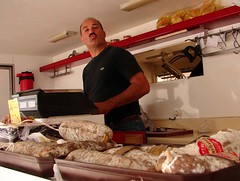
my sausage guy
In the evening I stop work. Before I hit the tiny stove I take a walk to the village further down from Pierrerue. The sun is warm, the air is fragrant, the wind has settled to a mild puff here and there. I have my camera, nothing else.
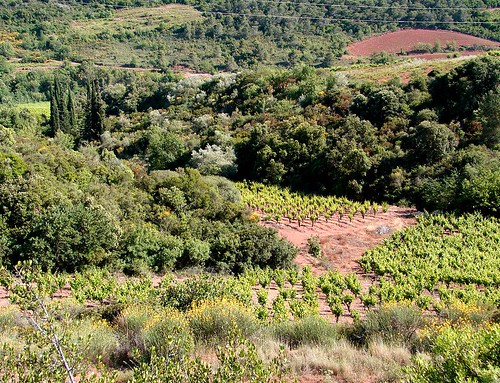
a few steps away from Pierrerue
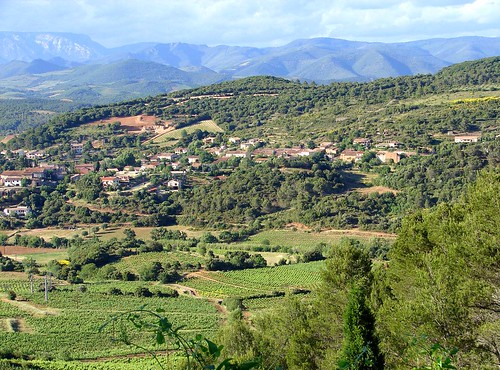
looking at Pierrerue (halfway up the hill), from across the valley
I pass a house where a man, considerably younger than me, is working with cement. He is fixing his steps and cracks on the house wall. The house is simple but nice. There are roses everywhere.
I have never seen a guy wear such short cut-offs in my entire life.
He shuts off his cement machine and smiles.
Out for a walk?
Yes…
He continues speaking: I see you take photos. So it is a photo walk? His grin is a foot wide.
Yes… I hesitate, wanting to say more, but change my mind and walk on.
And so I have to sort this out: the vendors, the customers, the men, women, neighbors, postal carriers – they all have a code. Most every exchange is a sign of friendliness and respect. Except when it’s not. Me, I am only learning it. Sort of.
Back at home I cook up my cloves of garlic, with trimmings.
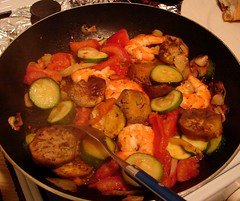
Only, how do you figure out what it all means?
Through making mistakes, of course.
I go outside at 9:30 to wait for the bread lady. My next door neighbor, the adorable, wonderful Madame Marie-Rose (not her real name, but it is of the genre) comes out as well. She is friendly, inquisitive. She likes that I speak some version of French. She groups visitors around here into those who do and those who don’t.
I ask about the village notice announcing a forthcoming Fete, a celebration. I tell her I would like to go and she is delighted. She invites me to her house. I glance around, quickly, trying not to take in too much detail. It is very traditional, with dark wood commodes and tables. I tell her it’s lovely.
It is modest, nothing fancy, she says, searching for a piece of paper to write down the Fete information.
On June 10th we will go down together. It is by the Mairie (every village and town in France has a mairie, where records are kept and bureaucratic nightmares are resolved).
It is for young people, but we all come.
With each point, she touches my arm, my hand – it is the way of people here. Everyone touches.
You know about our boucherie-charcouterie?
No...
He comes in a truck, Thursday, today, at 2. He has everything! Meats, sausages – such sausages! Everything.
I really did not imagine myself to be cooking up a meat storm, here in my tiny kitchen of my tiny castle corner, but I want to project gratitude and friendliness and so I express great joy in this.
I will come get you when he is here. He comes right outside my door.
At once my afternoon plans are changing. No longer am I going to be down in St Chinian eating a hearty lunch at Mme Suzanne’s, I will be here, with Mme Marie-Rose buying meat. The price of friendship.
I pause in my work to amble down to the Thursday market. I need cherries, strawberries, tomatoes, one of those sweet tiny French melons, I check off mentally items to look out for, pick up my basket, park the car outside the city center and walk over.
The market is smaller on Thursdays and far less crowded. The British are visibly absent. Maybe they eat pasties and mashers other days.
By noon, the farmers are anxious to unload and get going.

my veggies man

my cherries and tomatoes duo
I wait in line for my turn at the weigh-in and a friendly guy with a fantastic moustache and a gold chain around his dark neck turns to me and shows me the enormous head of garlic he is purchasing.
It’s healthy! You should buy one. You mash it up, mix it with oil, cook up fish, potatoes, fantastic!
I smile, mumble something and turn to the vendor.
But it strikes me that he is right. These garlic heads here are huge and most likely extremely flavorful. And so I purchase one.
I walk away from the stand and think – what the hell am I going to do with a garlic head this size? I’m not going to chomp on raw garlic cloves. I need stuff with them.
And so I add eggplant, zucchini, onion, tomatoes, and then of course olive oil. And I pass this stand:

my fish guy
… and so I purchase some of those as well.
One head of garlic later, my basket is full.
As I leave the market, I encounter my garlic pusher.
I wave and dangle the garlic, indicating that I listened.
He scoots right over and talks about the virtues of garlic. He is a furniture maker and, along with his son, he is selling chairs.

I admire them. I do find them pretty. Had I a house that needed chairs and I lived here, I would consider buying one. But I don’t and I tell him that transporting said chair to America would be a project.
America? You are from America? Are you with a group?
Imagine the improbable: a tour bus full of Americans in little St. Chinian. Imagine, me on that bus. Horrified at the idea, I tell him:
No, I am not! I’m alone! (mistake no.1)
He whips out his card and shows me where his furniture workshop is located. His accent is so thick that I can barely understand him. He appears to be saying that I should visit his workshop. He underlines the name of the village it is in. Not too far, he assures me.
I smile politely and explain that I do not know where it is and besides I do not really live here, I am in Pierrerue.
He looks puzzled. Pierre-what? Write it down.
Pierrerue is a mouthful. Locals must say it differently. I write it down. (mistake no.2)
He goes on about his furniture, explains that the card is his son’s and his name is really Felix. He crosses out his son’s name and writes in Felix. And then says:
Your name?
I am sure that we are politely exchanging names after a protracted conversation about garlic and furniture and so I write down my name (mistake no. 3; indeed, I have singularly violated my motto of the other day).
I will come visit you!
A look of horror crosses my face. I am in possession of my wits. He asks for my phone number, I tell him I do not have a phone. Nor a street number.
But really, everyone in Pierrerue knows of me. To find the American staying there, alone? Tres simple!
I retreat, believing that Felix is not actually going to drive his truck over to Pierrerue and inquire about the sole American living there, but I have to wonder how our casual conversation turned into this.
I walk hunched over, feeling like I did on the day I lost my passport. I goofed. The oomph is out of me.
I pass a mail carrier. In her twenties, she is spry and lively, bouncing from door to door with her deliveries. As I pass her she says the obligatory “bonjour madame!”
She looks at me and asks: do you have far to walk? Can I help you carry those?
My God! The mail carrier has just offered to take my bundles for me! I best put zip back into my step.
But I know it’s not that – it’s the hierarchy of village life. A woman my age is treated with respect, with deference. Her impulse was exactly right. She would, without hesitation, interrupt her work to assist someone older than her.
In the afternoon, Madame Marie-Rose is climbing over the fence at the back of my stone hut, trying to find me, to let me know the meat truck is here. I am glad I decided to stay for it.
She buys meat for the week. It is clearly a staple of her diet. She buys more meat than I eat in a month.

Madame studies the meats
The seller could not be a sweeter man. He sings loudly about love and a broken heart as he chops steaks and sausages. Marie-Rose says he is Dominique and has been driving his truck for decades.
I admire photos plastered to the back of his truck. Dominique is dressed as a cow and he has toddlers in his arms.
Grandchildren. Marie-Rose explains. Dominique is a very young grandfather.
Dominique winks and laughs and when I take a photo, he puckers his lips and throws kisses my way. Innocent to the core. I buy calamari and local dried sausage (I know, I know, what are you gonna do), I leave.

my sausage guy
In the evening I stop work. Before I hit the tiny stove I take a walk to the village further down from Pierrerue. The sun is warm, the air is fragrant, the wind has settled to a mild puff here and there. I have my camera, nothing else.

a few steps away from Pierrerue

looking at Pierrerue (halfway up the hill), from across the valley
I pass a house where a man, considerably younger than me, is working with cement. He is fixing his steps and cracks on the house wall. The house is simple but nice. There are roses everywhere.
I have never seen a guy wear such short cut-offs in my entire life.
He shuts off his cement machine and smiles.
Out for a walk?
Yes…
He continues speaking: I see you take photos. So it is a photo walk? His grin is a foot wide.
Yes… I hesitate, wanting to say more, but change my mind and walk on.
And so I have to sort this out: the vendors, the customers, the men, women, neighbors, postal carriers – they all have a code. Most every exchange is a sign of friendliness and respect. Except when it’s not. Me, I am only learning it. Sort of.
Back at home I cook up my cloves of garlic, with trimmings.

posted by nina, 6/02/2006 06:10:00 AM
| link
| (4) comments
Thursday, June 01, 2006
from Pierrerue: gift of gab, genius and goats
It is noon, I am restless. I quit work for the day. How easy it is to adapt the ways of those around you!
I want to go back to the Canal du Midi. I haven’t got a feel for its run yet. I haven’t walked along it, haven’t turned corners by its side, gone over bridges, watched boats pass through.
It should be an easy half hour drive from here, but there is no such thing as a straight road to it. Solo driving means pulling over, taking out reading glasses, studying the map, pulling back onto the road, coming to the intersection, being puzzled, pulling over, studying the map, understanding that I have gone too far, reexamining the map, turning back, forgetting the number of the road, pulling over, taking out reading glasses, studying the map – and this happens for the entire route.
I am still some kilometers away from the village where I am to pick up the trail of the Canal when I see a tiny sign saying “Auberge du Chat qui Peche, this way.” Cute little knife and fork below and a picture of a blue cat, fishing. It is 1:30 and I am hungry. If I do not stop for a salad soon, I will start encountering the closed sign and in desperation I will pound on a boulanger’s shop to reopen already and get myself arrested.
I follow the arrows. A country restaurant, in France. Mmmmm.
Around three more twisty turns I see it. An Impressionistic lullaby: a yellow building, by a stone bridge crossing over the Canal du Midi. At the edge of the canal, a wooden boat with a tall mast.
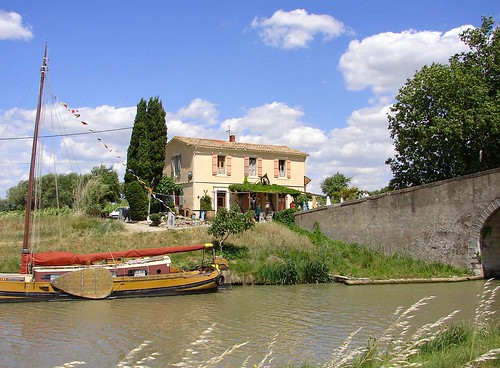
Inside, a few tables are occupied. I hear French, I hear “British.” The menu – ohhh, so tempting: foods that are simple et vraie, it says. De la campagne. You got me where you want me -- salvating. Salade, Chicken Catalane with potatoes dauphinois, cake of the house. That does it. The transformation is complete. From now on, I eat my big meal in the afternoon, like the French.
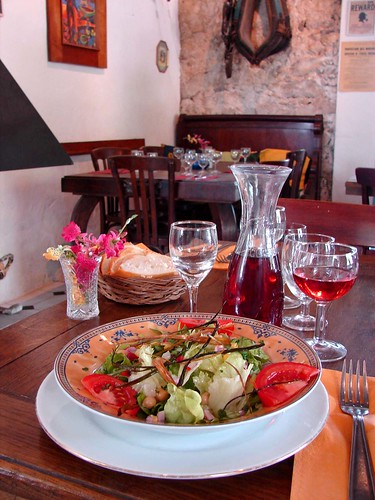
la salade is now just the beginning of le dejeuner
Lunch is, in fact delicious. And protracted. No one is in a hurry. The one hour lunch becomes a two hour lunch, becomes a… Okay, let me ask for a coffee and the check. Wait, I hear the waiter in the next room, talking about me, about the other clients. Oh, how audacious! Surely he knows some of us can hear him. Oh, he is telling about the French table where they changed their mind, passed on the coffee and ordered lots of cake instead. I can hear it all!
It suddenly strikes me. He is not speaking French, he is speaking Polish. [Take note: do not assume, even on the banks of the Canal du Midi, in a small village in the south of France that you can speak Polish and no one will understand.] And so I hail him over, of course, in Polish.
He is Camile, he is half Polish half French.
I live here in the summer, then, when the Canal closes, so does the restaurant and I move for six months to Poland.
A winter in Poland, so cold!
The winters in Poland, they are not so pretty anymore. Less snow, more dampness, pollution. But still, I am also cold here in the winter! When the wind blows through, you run for cover!
Is it your restaurant?
It belongs to all of us in my family. I have been here for eight years.
So do you ever see Poles here?
No, never. Maybe once every three years someone will stop by. But we never see Americans any more either. Before 9/11, almost every week we would have some. Now, almost never. Once every few months. They stick to Paris if they come to France at all.
A man who is half French half Polish. An impossible combination! No one will ever get a word in edgewise. The quintessential storytellers, the Poles, the French. And indeed, I get my share.
The Americans, they are so uncomfortable here. Especially in the South, where not many of us speak English. Last summer, three Americans came in and they looked lost, confused and one asked for a coffee and another for a beer and the third turned to his friends and said “how do you say Coca Cola in French?”
It’s a story he laughs at, but there is also puzzlement there. As if there is something about the Americans that he doesn’t quite get. I see that often here. When I say I am an American there is, automatically, a reaction. Surprise, deference, caution. And usually, I am told of some trip over there that was nice, interesting, so different over there, so different.
How do we appear to the French back in our own settings, where we do not stand out, as we must here?
I leave, promising that I would try to find them again. God knows how I ever found this place on this day, though if I follow along by the Canal du Midid, there it will be, no?
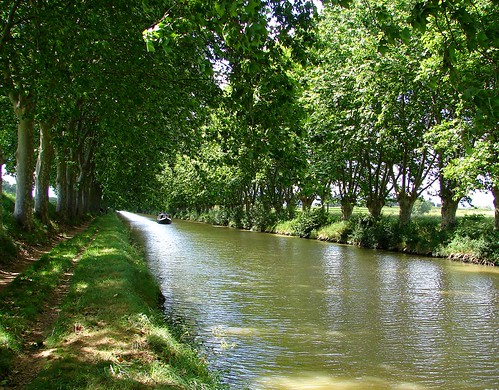
I leave the Canal eventually and head back north, back into the hills and the vineyards of the Minervois. Within a brief drive, there is yet a completely different wine terroir than that of St. Chinian. The soil is different, the slope, the climate, all call for a different wine label. The town that gave the wine region its name is Minerve. And it is stunning.
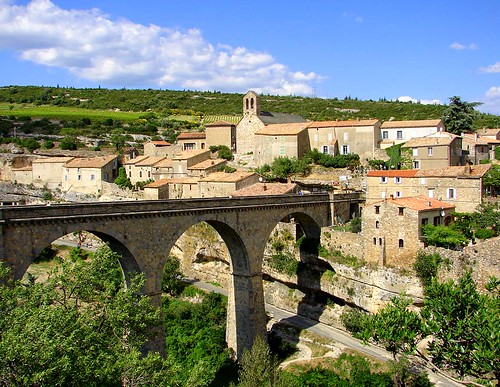
At this time of the year it is empty. Now, on this last day of May, I am almost alone. A few store owners are working to put things in order, waiting, I am sure, for the tourist season to begin.
I climb down into the river bed and look around. There is no river any more. It’s like the Internet that has command of our need for information, usurping other tools, so too you see these wondrous inventions and the demise in their usefulness because time has abruptly messed things around. The river has gone underground. The need for the magnificent bridge is gone. The development of efficient ground transport has made the Canal du Midi nearly obsolete. The inventors create and then time wipes out the need for their particular genius. Had they known that the bulk of “users” would someday be tourists and only tourists, would they close shop and do something else, like carve sticks, or blog maybe?
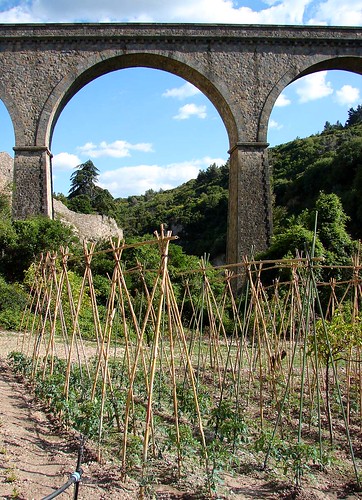
underneath, staked tomatoes
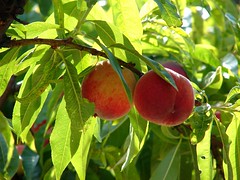
...and peaches
Driving back, I stop at a random roadside wine producer. There are dozens and dozens of them. The entire south of France is one huge field of grapes, interspersed with mountains, pastures and a few towns and villages.
This Domaine looks pretty. Their wines must be a success – the house is lovely, kept up well.
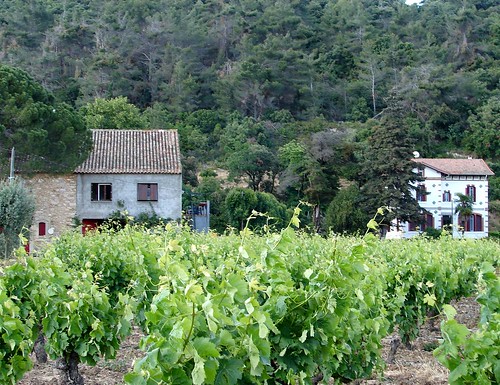
Domaine de Peyremale
I drive up, madame opens the door.
You are open, right? (Walk-ins are the norm here.) Her daughter, maybe 9 or 10 hovers, bouncing a ball around the little cave where the vats are.
Oh, stop bouncing that! The noise! The mother tells her.
She stops, grins, comes over and watches. The mother insists that I sample the three types they have. The wines are light but so very lovely, smooth, delicious.
Alright, a white and a rose. I look at the prices: 1.70 Euro for the Rose, 2.5 Euro for the Chardonnay. I can’t have bothered her for two bottles only! And so I buy four.
Visitors, I need visitors here in Pierrerue!
Ten kilometers to St Chinian still. I see a sign to a goat cheese maker. I follow. Four bottles of wine, one goat cheese. Perfect supper, no?
The path curves up the hillside. Signs warn me to drive slowly, there are goats and little children.
Madame is young. Her toddlers are running between the fromagerie and the barn. I hear goats. It is their post pasture time where they chomp down stuff in the barn, get milked, and basically settle in for the night.
Madame gives me five cheeses to sample. How do you decide?
This one is very fresh, unsalted. You can put sugar on it for dessert. This one is very strong.
But I like all of them!
I visit the goats.
Would you like to see the babies? Yes, except that it will make me miss my babies. Baby goats, babies, not so babies anymore back home.
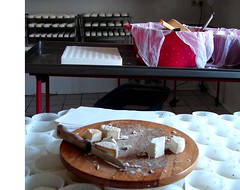
La Chevrerie de Combebelle
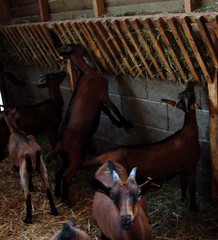
the babies
I turn into St Chinian. The grocer is open. Pick up some tomatoes, endive, enough to tide me over until the Thursday market.
I want to go back to the Canal du Midi. I haven’t got a feel for its run yet. I haven’t walked along it, haven’t turned corners by its side, gone over bridges, watched boats pass through.
It should be an easy half hour drive from here, but there is no such thing as a straight road to it. Solo driving means pulling over, taking out reading glasses, studying the map, pulling back onto the road, coming to the intersection, being puzzled, pulling over, studying the map, understanding that I have gone too far, reexamining the map, turning back, forgetting the number of the road, pulling over, taking out reading glasses, studying the map – and this happens for the entire route.
I am still some kilometers away from the village where I am to pick up the trail of the Canal when I see a tiny sign saying “Auberge du Chat qui Peche, this way.” Cute little knife and fork below and a picture of a blue cat, fishing. It is 1:30 and I am hungry. If I do not stop for a salad soon, I will start encountering the closed sign and in desperation I will pound on a boulanger’s shop to reopen already and get myself arrested.
I follow the arrows. A country restaurant, in France. Mmmmm.
Around three more twisty turns I see it. An Impressionistic lullaby: a yellow building, by a stone bridge crossing over the Canal du Midi. At the edge of the canal, a wooden boat with a tall mast.

Inside, a few tables are occupied. I hear French, I hear “British.” The menu – ohhh, so tempting: foods that are simple et vraie, it says. De la campagne. You got me where you want me -- salvating. Salade, Chicken Catalane with potatoes dauphinois, cake of the house. That does it. The transformation is complete. From now on, I eat my big meal in the afternoon, like the French.

la salade is now just the beginning of le dejeuner
Lunch is, in fact delicious. And protracted. No one is in a hurry. The one hour lunch becomes a two hour lunch, becomes a… Okay, let me ask for a coffee and the check. Wait, I hear the waiter in the next room, talking about me, about the other clients. Oh, how audacious! Surely he knows some of us can hear him. Oh, he is telling about the French table where they changed their mind, passed on the coffee and ordered lots of cake instead. I can hear it all!
It suddenly strikes me. He is not speaking French, he is speaking Polish. [Take note: do not assume, even on the banks of the Canal du Midi, in a small village in the south of France that you can speak Polish and no one will understand.] And so I hail him over, of course, in Polish.
He is Camile, he is half Polish half French.
I live here in the summer, then, when the Canal closes, so does the restaurant and I move for six months to Poland.
A winter in Poland, so cold!
The winters in Poland, they are not so pretty anymore. Less snow, more dampness, pollution. But still, I am also cold here in the winter! When the wind blows through, you run for cover!
Is it your restaurant?
It belongs to all of us in my family. I have been here for eight years.
So do you ever see Poles here?
No, never. Maybe once every three years someone will stop by. But we never see Americans any more either. Before 9/11, almost every week we would have some. Now, almost never. Once every few months. They stick to Paris if they come to France at all.
A man who is half French half Polish. An impossible combination! No one will ever get a word in edgewise. The quintessential storytellers, the Poles, the French. And indeed, I get my share.
The Americans, they are so uncomfortable here. Especially in the South, where not many of us speak English. Last summer, three Americans came in and they looked lost, confused and one asked for a coffee and another for a beer and the third turned to his friends and said “how do you say Coca Cola in French?”
It’s a story he laughs at, but there is also puzzlement there. As if there is something about the Americans that he doesn’t quite get. I see that often here. When I say I am an American there is, automatically, a reaction. Surprise, deference, caution. And usually, I am told of some trip over there that was nice, interesting, so different over there, so different.
How do we appear to the French back in our own settings, where we do not stand out, as we must here?
I leave, promising that I would try to find them again. God knows how I ever found this place on this day, though if I follow along by the Canal du Midid, there it will be, no?

I leave the Canal eventually and head back north, back into the hills and the vineyards of the Minervois. Within a brief drive, there is yet a completely different wine terroir than that of St. Chinian. The soil is different, the slope, the climate, all call for a different wine label. The town that gave the wine region its name is Minerve. And it is stunning.

At this time of the year it is empty. Now, on this last day of May, I am almost alone. A few store owners are working to put things in order, waiting, I am sure, for the tourist season to begin.
I climb down into the river bed and look around. There is no river any more. It’s like the Internet that has command of our need for information, usurping other tools, so too you see these wondrous inventions and the demise in their usefulness because time has abruptly messed things around. The river has gone underground. The need for the magnificent bridge is gone. The development of efficient ground transport has made the Canal du Midi nearly obsolete. The inventors create and then time wipes out the need for their particular genius. Had they known that the bulk of “users” would someday be tourists and only tourists, would they close shop and do something else, like carve sticks, or blog maybe?

underneath, staked tomatoes

...and peaches
Driving back, I stop at a random roadside wine producer. There are dozens and dozens of them. The entire south of France is one huge field of grapes, interspersed with mountains, pastures and a few towns and villages.
This Domaine looks pretty. Their wines must be a success – the house is lovely, kept up well.

Domaine de Peyremale
I drive up, madame opens the door.
You are open, right? (Walk-ins are the norm here.) Her daughter, maybe 9 or 10 hovers, bouncing a ball around the little cave where the vats are.
Oh, stop bouncing that! The noise! The mother tells her.
She stops, grins, comes over and watches. The mother insists that I sample the three types they have. The wines are light but so very lovely, smooth, delicious.
Alright, a white and a rose. I look at the prices: 1.70 Euro for the Rose, 2.5 Euro for the Chardonnay. I can’t have bothered her for two bottles only! And so I buy four.
Visitors, I need visitors here in Pierrerue!
Ten kilometers to St Chinian still. I see a sign to a goat cheese maker. I follow. Four bottles of wine, one goat cheese. Perfect supper, no?
The path curves up the hillside. Signs warn me to drive slowly, there are goats and little children.
Madame is young. Her toddlers are running between the fromagerie and the barn. I hear goats. It is their post pasture time where they chomp down stuff in the barn, get milked, and basically settle in for the night.
Madame gives me five cheeses to sample. How do you decide?
This one is very fresh, unsalted. You can put sugar on it for dessert. This one is very strong.
But I like all of them!
I visit the goats.
Would you like to see the babies? Yes, except that it will make me miss my babies. Baby goats, babies, not so babies anymore back home.

La Chevrerie de Combebelle

the babies
I turn into St Chinian. The grocer is open. Pick up some tomatoes, endive, enough to tide me over until the Thursday market.
posted by nina, 6/01/2006 08:55:00 AM
| link
| (4) comments

